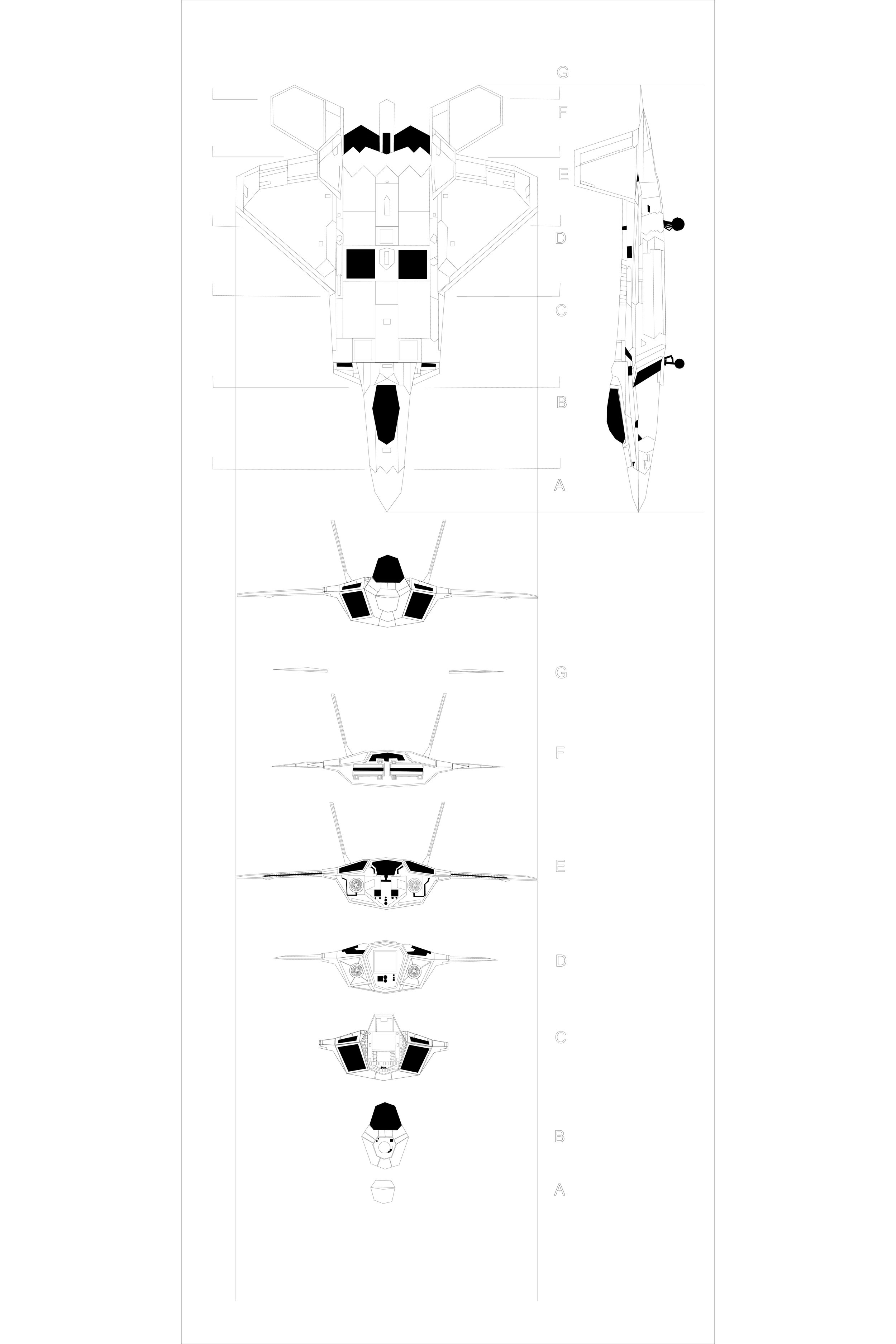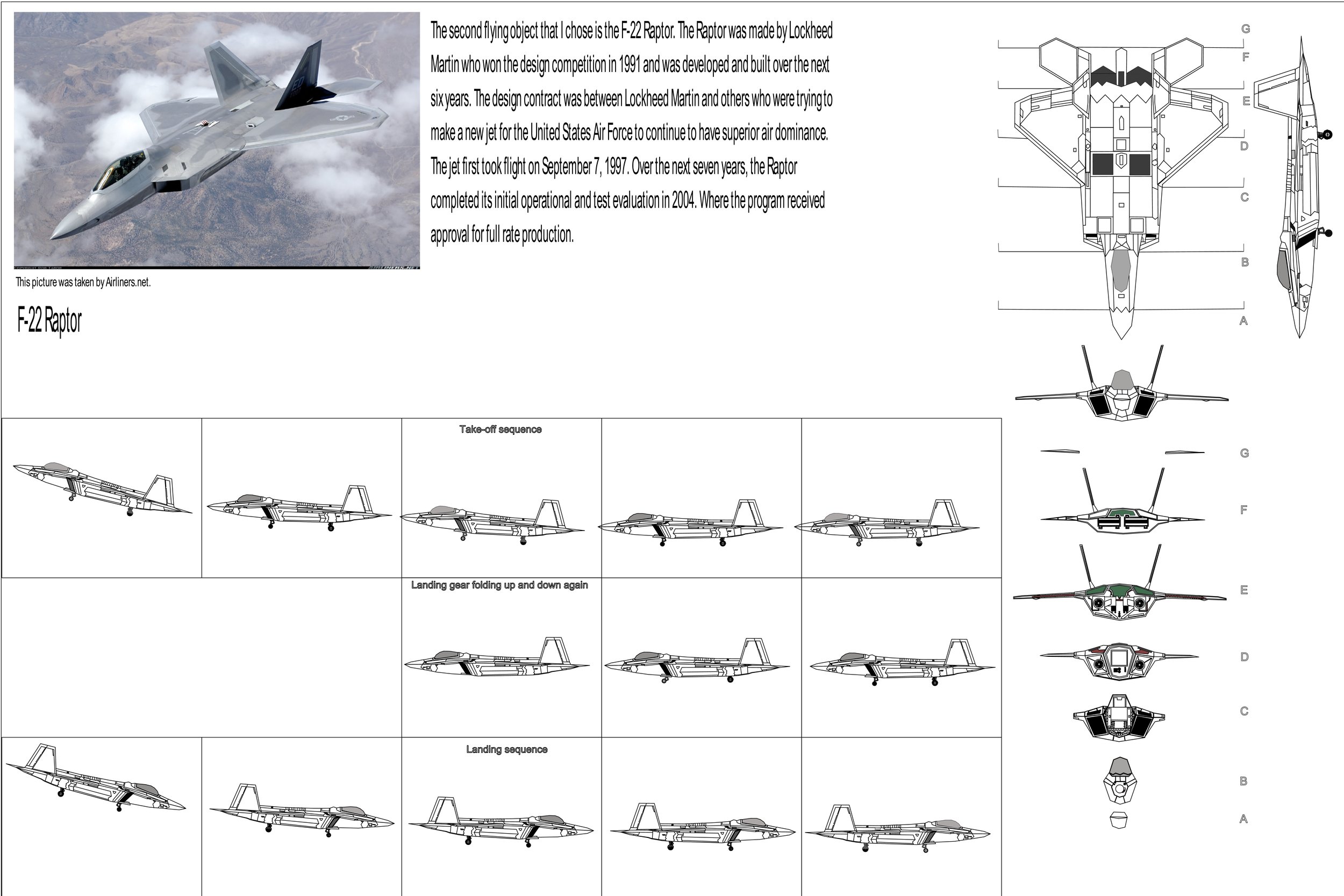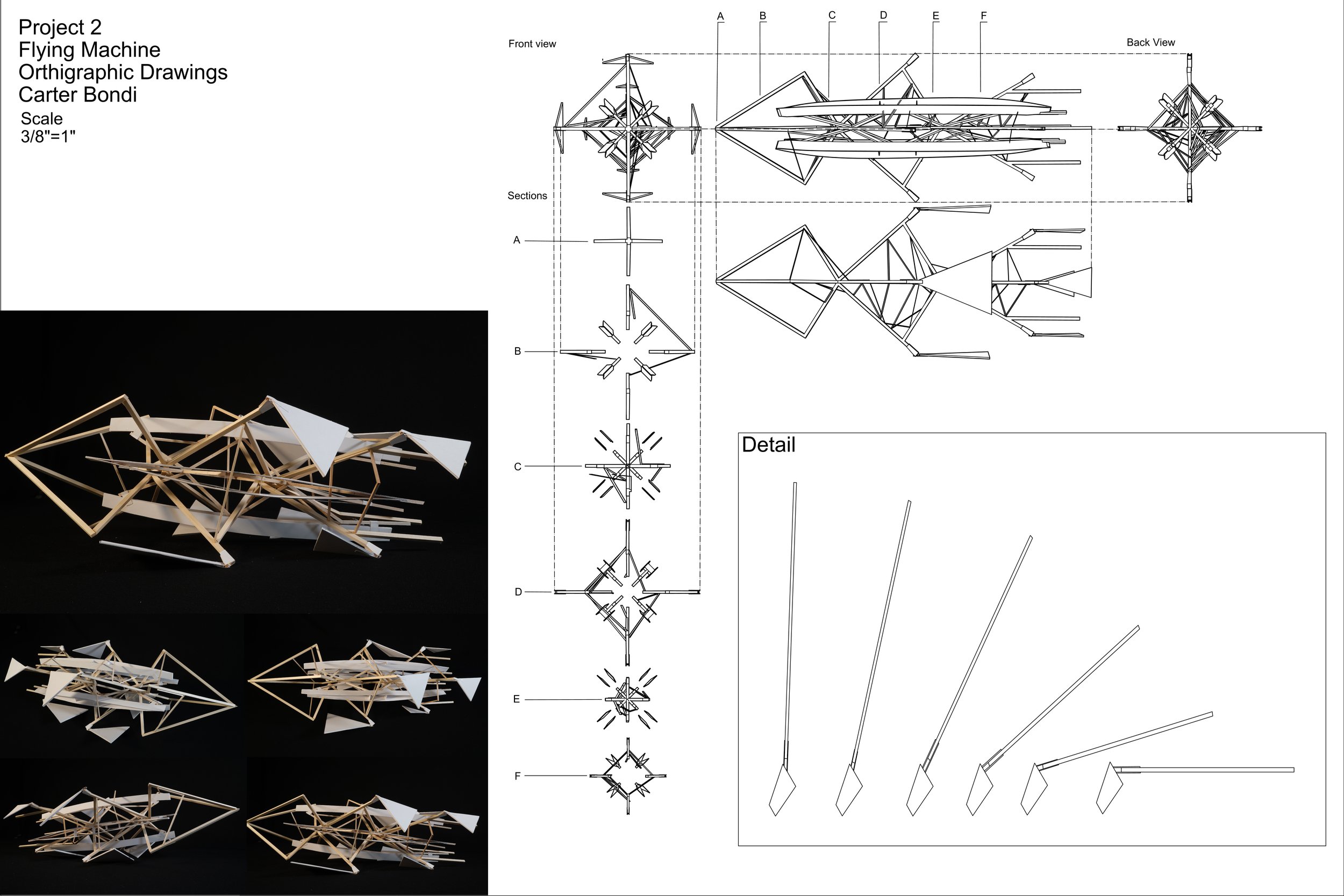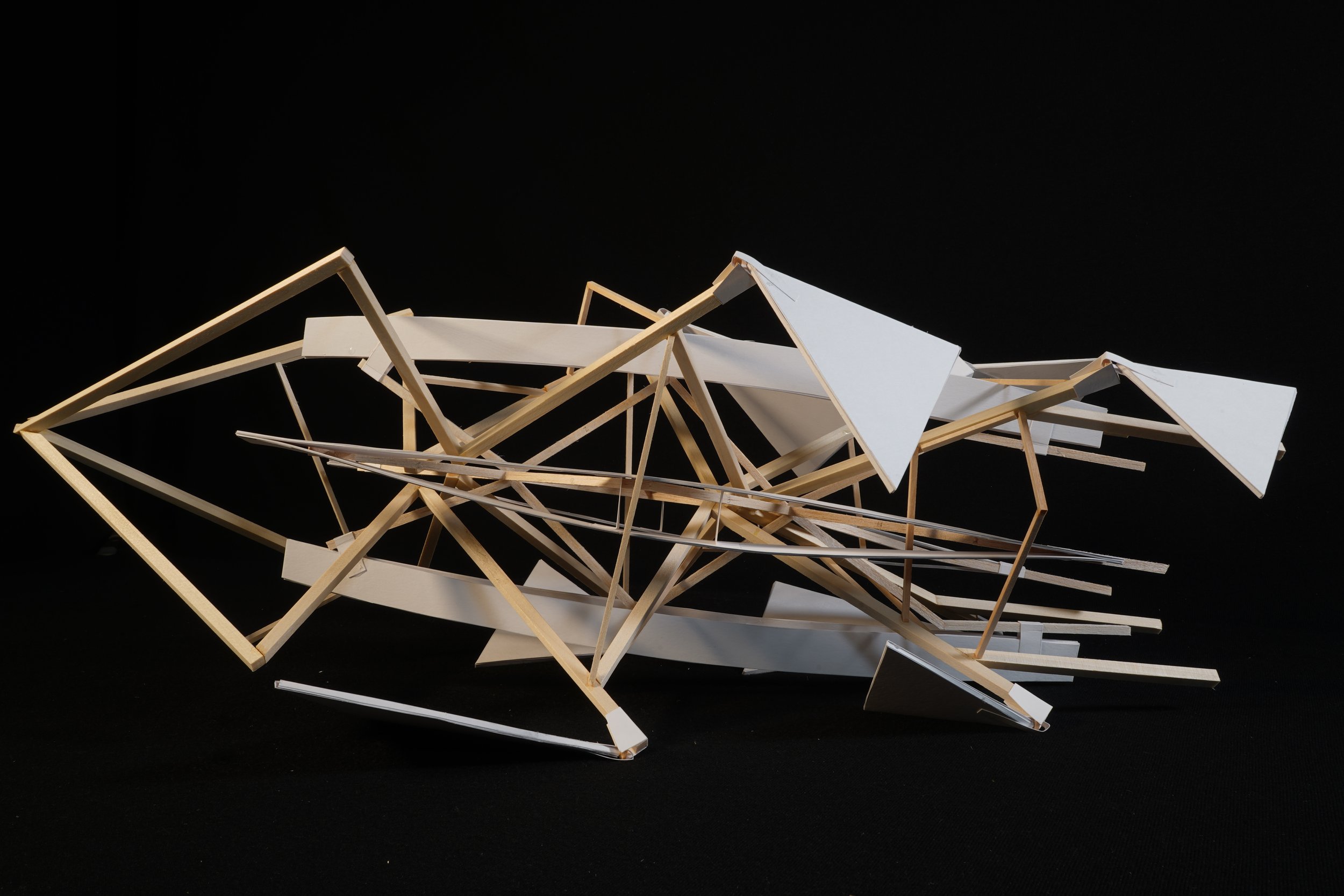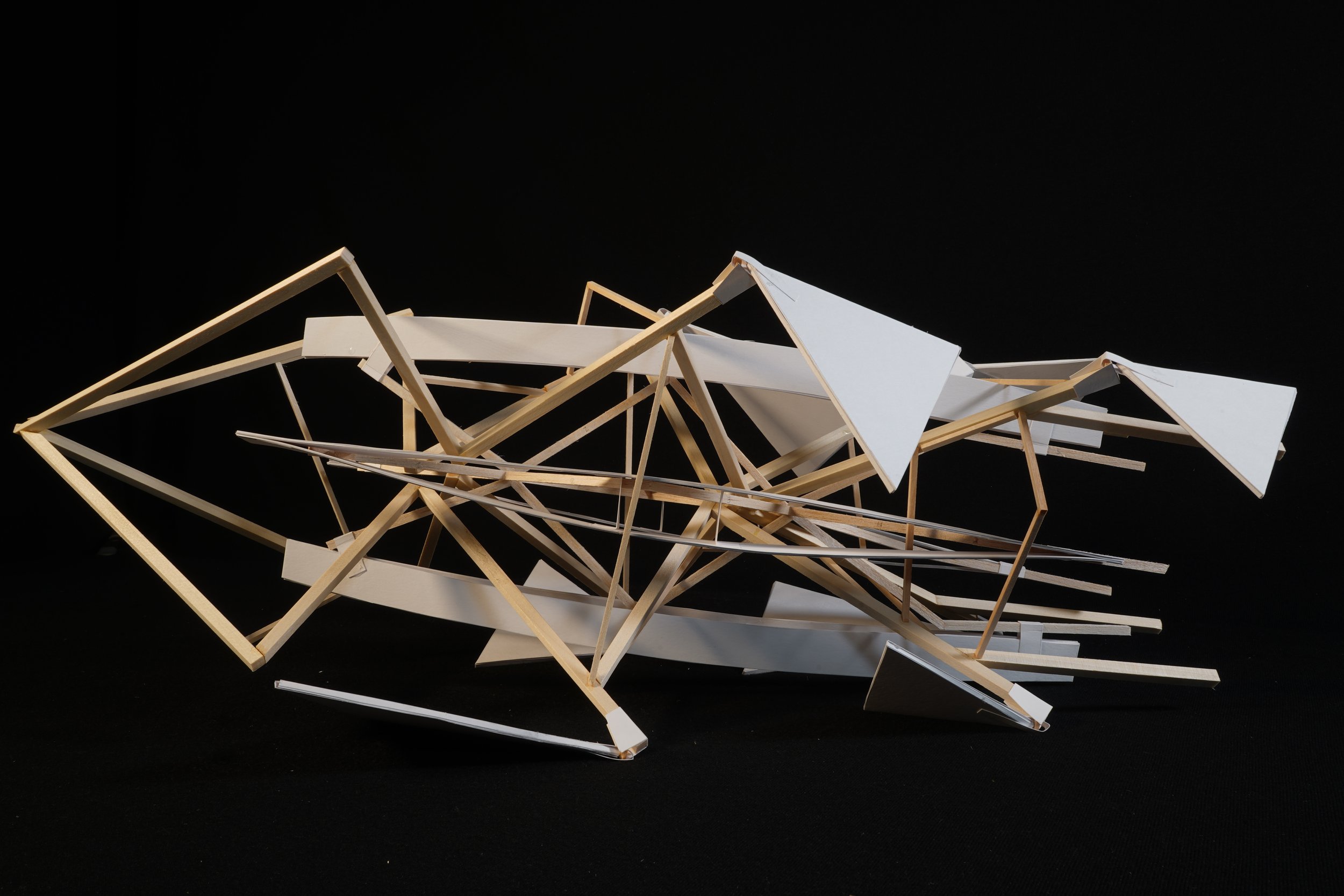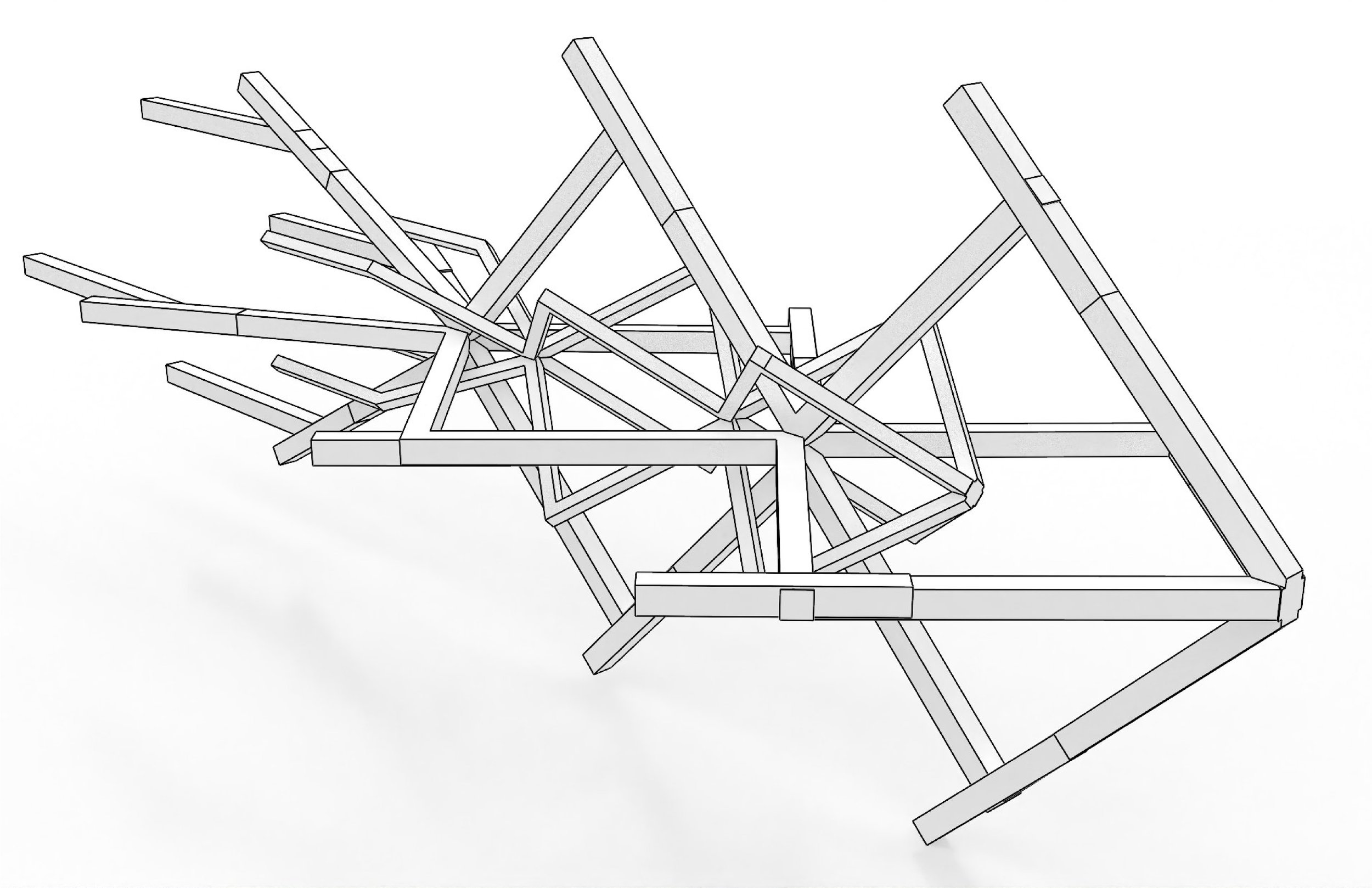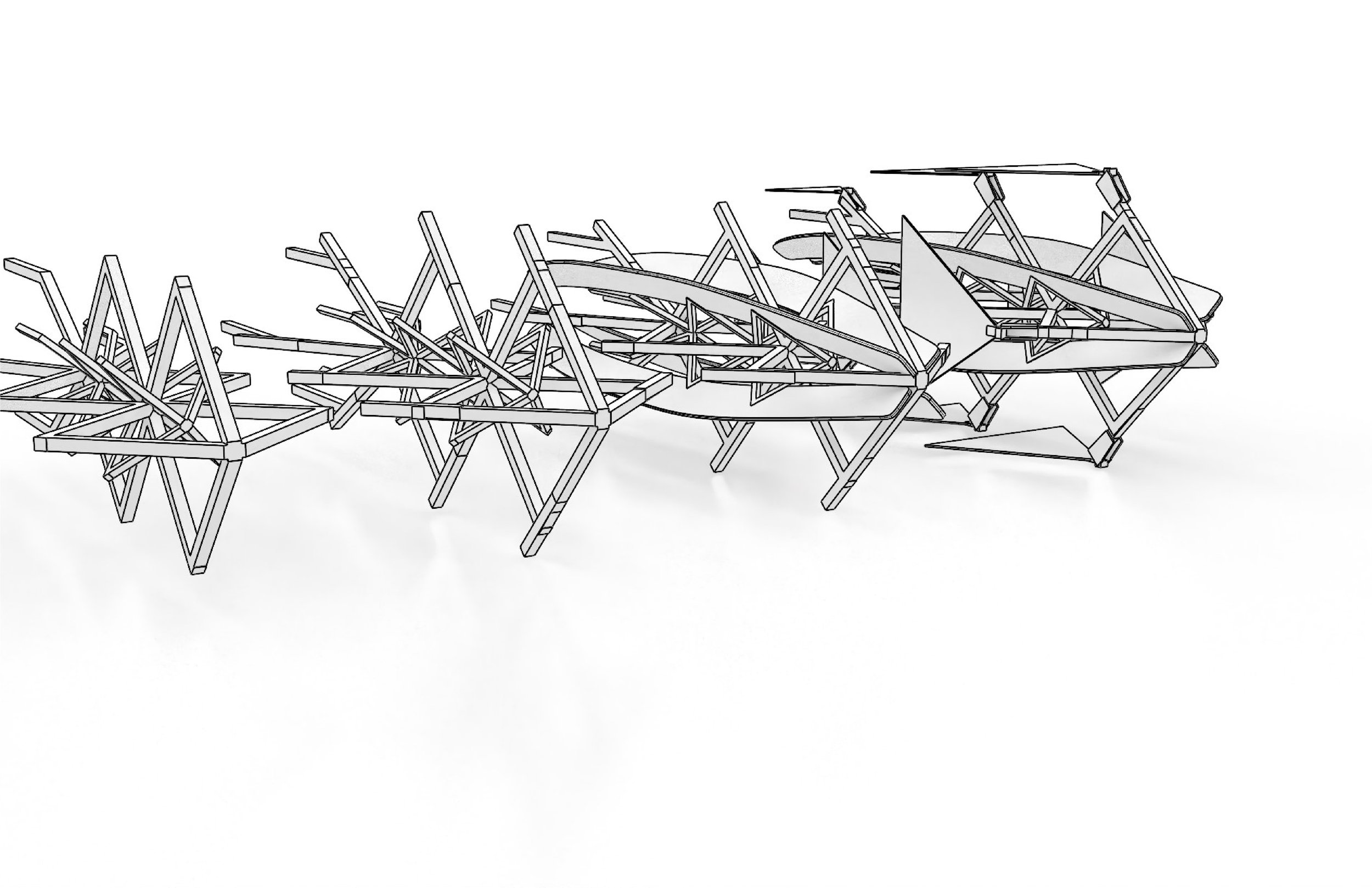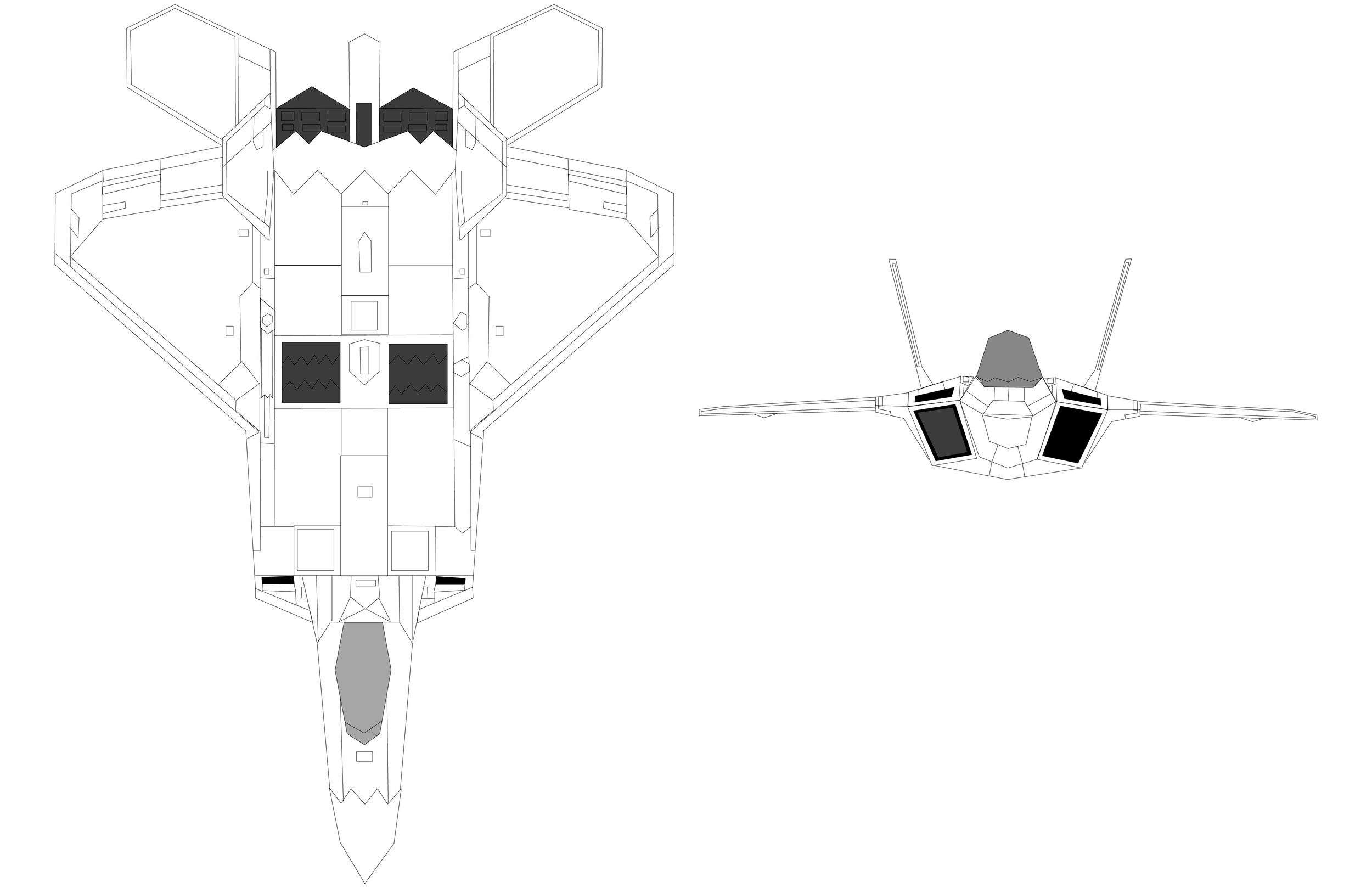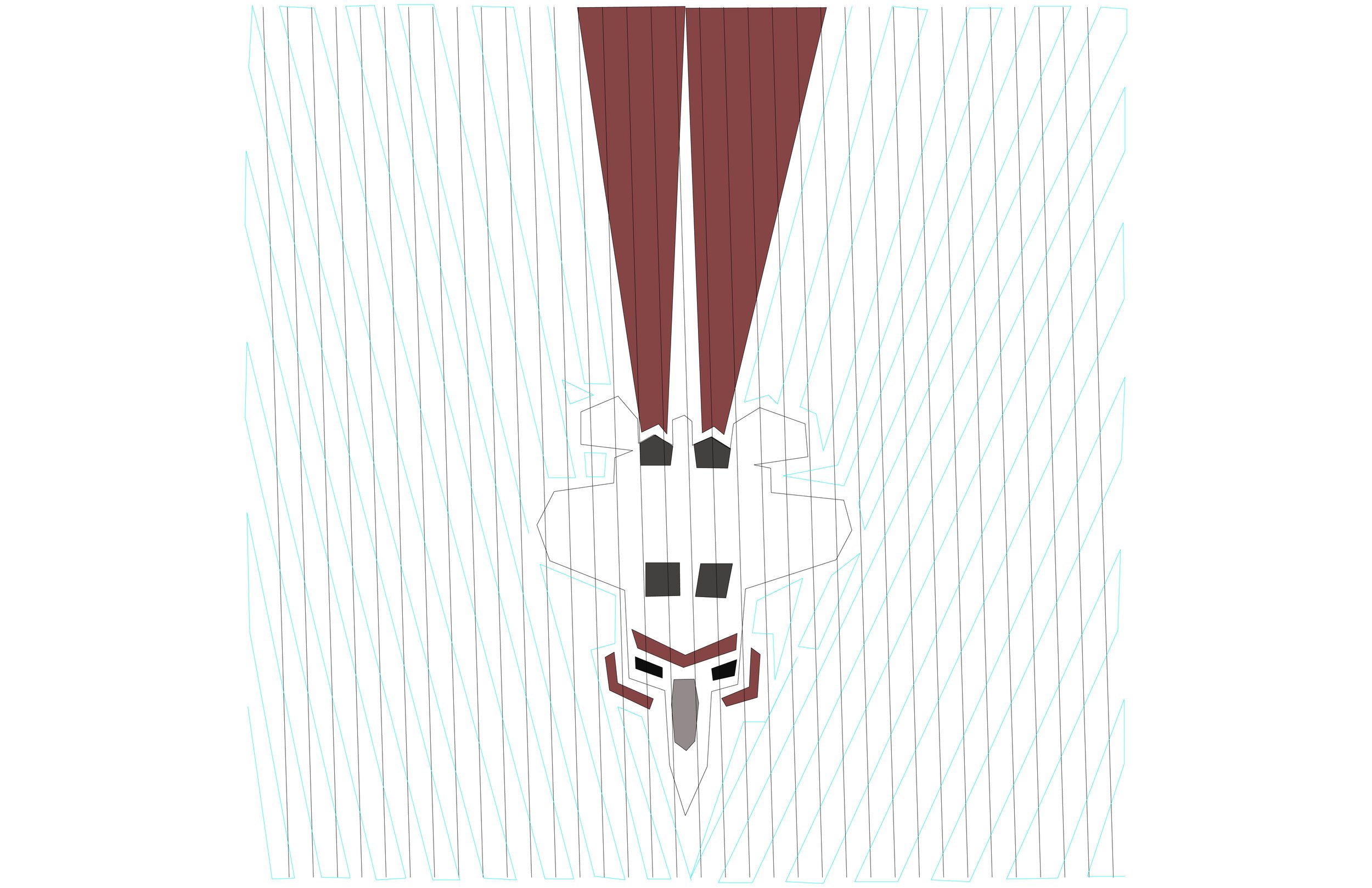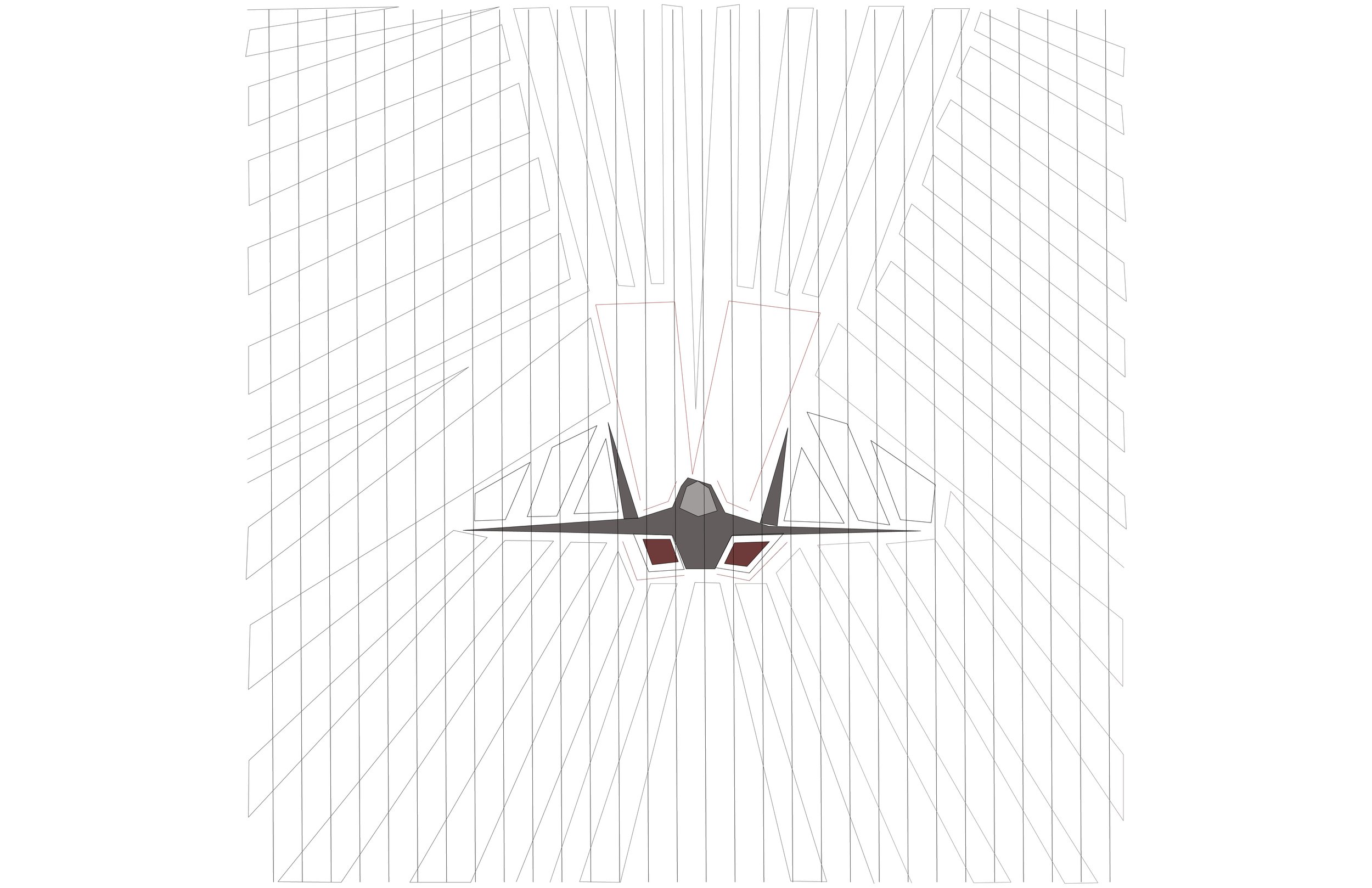Beau Bock
First Year Undergraduate Fall Design Studio is rooted in representational techniques and fundamentals of design education. The notion of invention and inventive exploration are adopted as the ethos of the studio. Invention is a novel device, method, composition, idea, or process. An invention may be an improvement upon a machine, product, or process for increasing efficiency or lowering cost. It may also be an entirely new concept.
Katherine Lennox
A Woven Speculation of Flight
The original object of flight I decided to research and base my project on was the helicopter. Initially, I chose to study the pieces of the aircraft vital for flight: the rotor blades. I began the process by adding geometry, abstracting the helicopter's general shape, and adding additional layering to the blades for my midterm. To include a further display of motion, I added a central brass pole for segmented body abstractions to rest upon and experimented with the wings. I studied Japanese basket weaving forms, specifically Hayashi Junpei’s work, to create a more unified look. I experimented with different forms of weaving to create an overall basket shape, then created asymmetrical wings attached to the basket that involved further layering and a mix of line and plane. I also decided to incorporate a 3-stick stripe along the basket to create a standing point to watch as the basket turns and twists in a cinematic way. (as shown in the rendered diagram drawings)
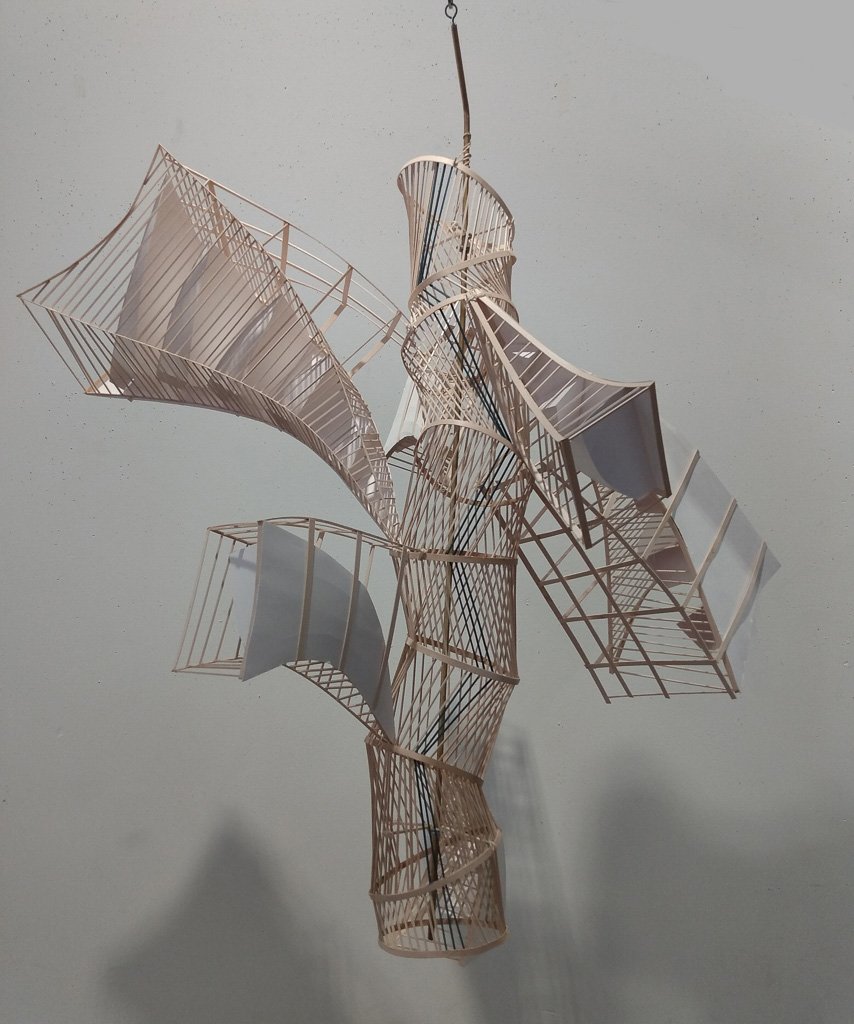

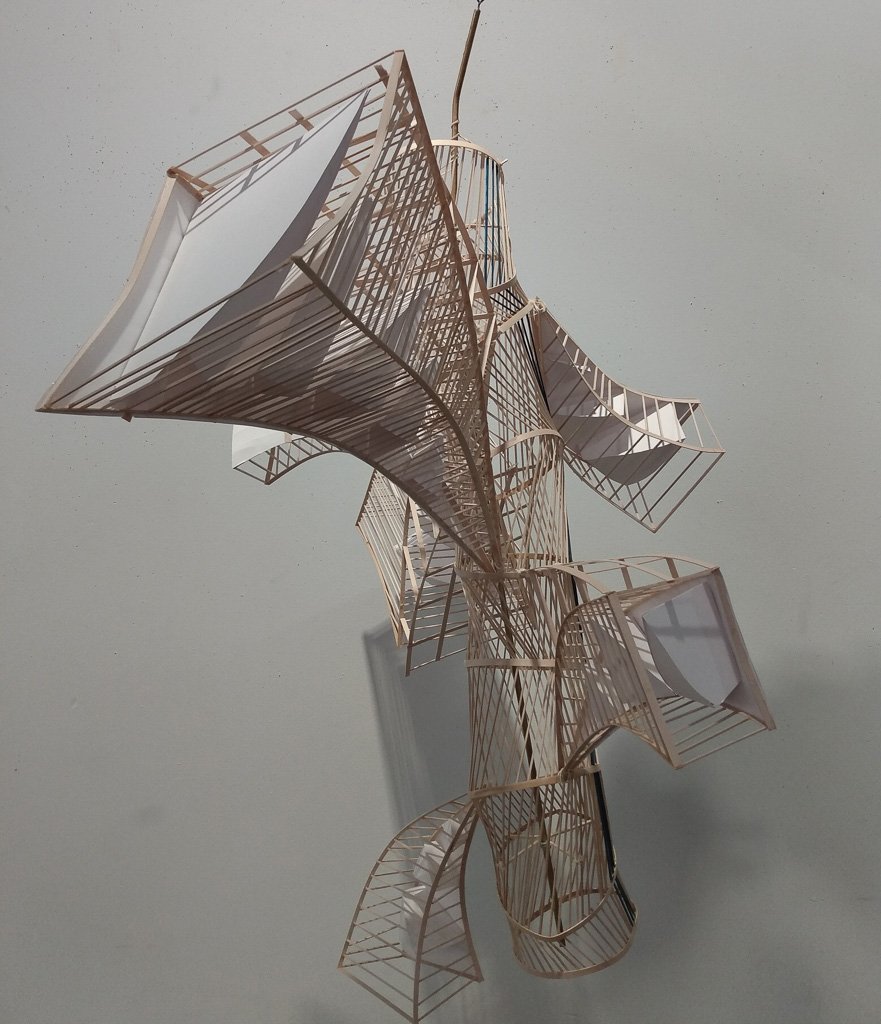






Lily Weber
Foldable Functions
Over the course of the first project I worked with abstracting and iterating on the Lilienthal Glider to create a model that explains and expands on its flight. Within that process I worked with creating joints and movement in my models, which were a focus of the second project. I wanted to create hidden and elegant movement in my model, and not have the necessary mechanisms simply an out of place addition. Keeping a common thread throughout the model with its form and way of making was another focus. My main way of making used planes and I used lines to add to the visual, but the planes are hollowed out to help tie it in with the linear elements, which also created its own visually interesting effect.

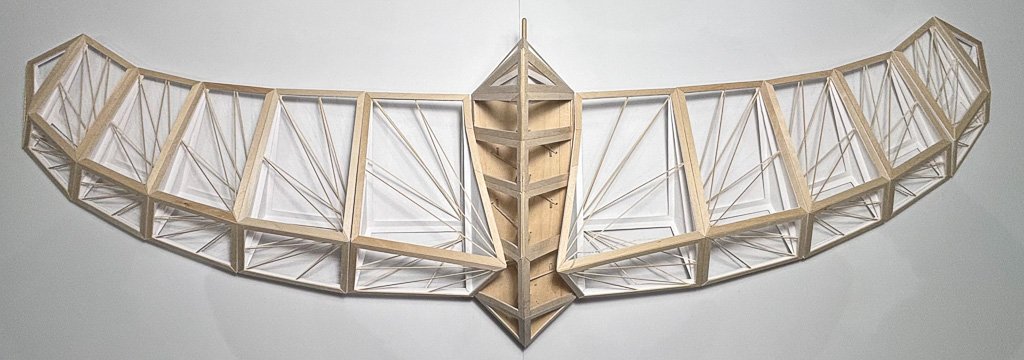

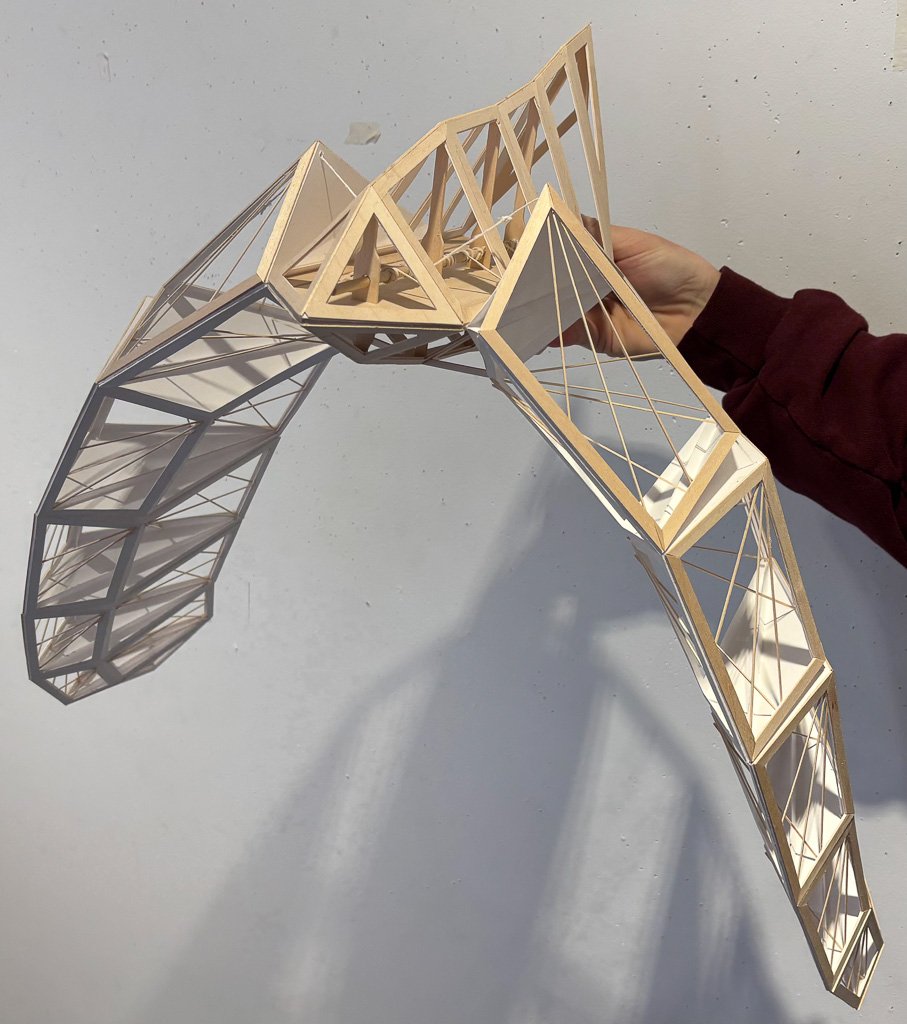


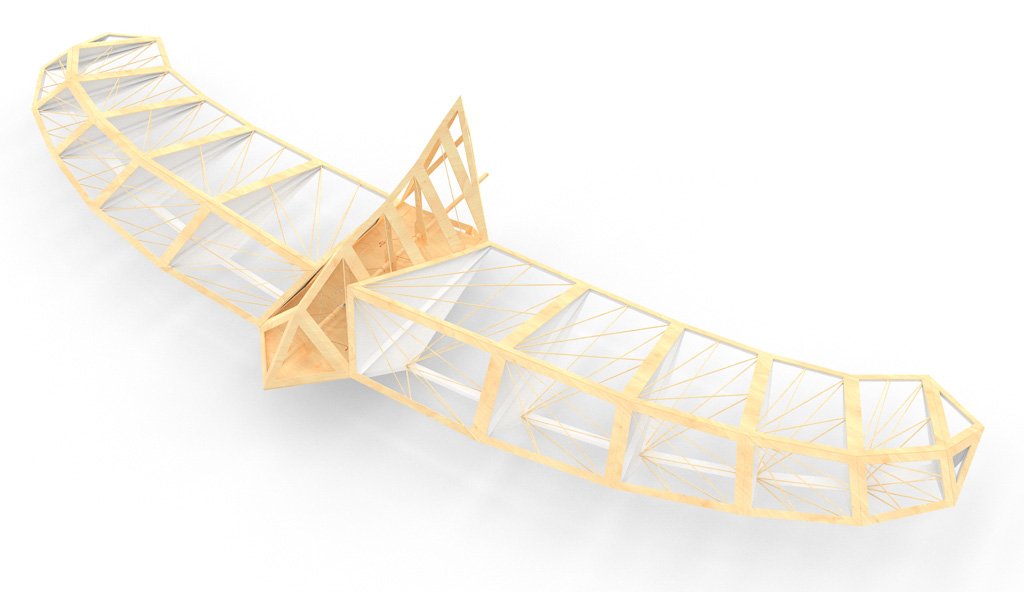

Joseph Faber
Gliding/Flying Machines
Throughout the entire semester and second project, I studied a ladybug. I researched the shape, form, aerodynamics, and look of the bug and abstracted the form into several prototypes and final models. I created 4 prototypes before constructing a final model ahead of the conclusion of project 2 and the end of the semester.
For project 2, I really focused on the aerodynamics of the ladybug and how I’d carry out making a physical model that has moving components while maintaining a consistent aesthetic. With my first prototype, I focused on the form of an individual wing. I used thin sticks and thick paper to create the wing form that I would continue to carry out in the following prototypes. My second prototype focused on the movement of the wing and the upwards rotation that it holds. I traced this prototype with my third continuing this investigation while focusing more on the form of the body rather than just the wing and adding more self-reliant moving components. I created a mechanism that winds up with a rubber band, allowing for a flapping motion. When constructing my final prototype, I combined all of these ideas before creating my final model. In my final I wanted to define all of what I thought was most crucial for the ladybug to fly, such as the wings upwards and downwards motion and their rotation. Additionally, I abstracted the form even further and finalized my ideas. Throughout the course of these projects I learned about flight, what allows for an object to fly, and important model making skills that allowed for a moving/flying object.

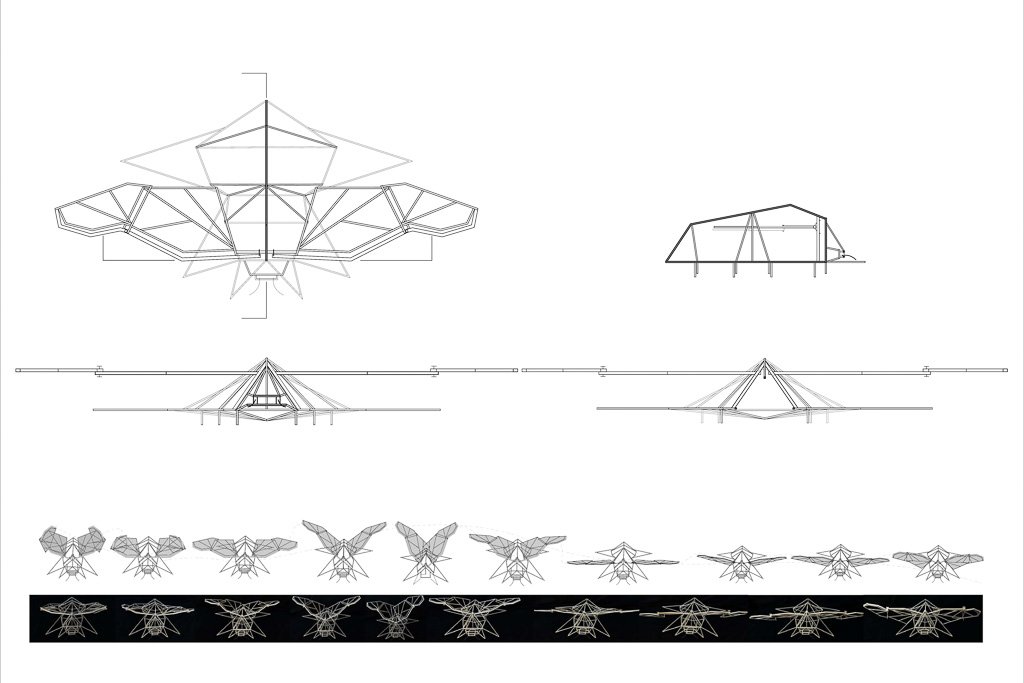






Mika Ito
Gliding Machine
Gabriela Balliu
Thee North Wind
An array of the abstraction of aerodynamics, airfoils and airflow presented through models and diagrams formulating space and use of wind by renders of renditions. Each carefully crafted venture undertaking and mindful of parameters gifted by geologic mindful airspaces.




Elana Collens
Void in Flight
In my work this semester, I explored the connections between line and void. These concepts shaped my interpretation of our flying machine prompt and dictated my design process throughout the semester. I was particularly interested in developing a technique that most closely mimicked the smoothness of SubD modeling. For my physical model, I used a combination of mesh and glue to create a secondary texture that emphasized the voids. This created a feeling of openness and directionality that intertwined with the flying machine prompt.









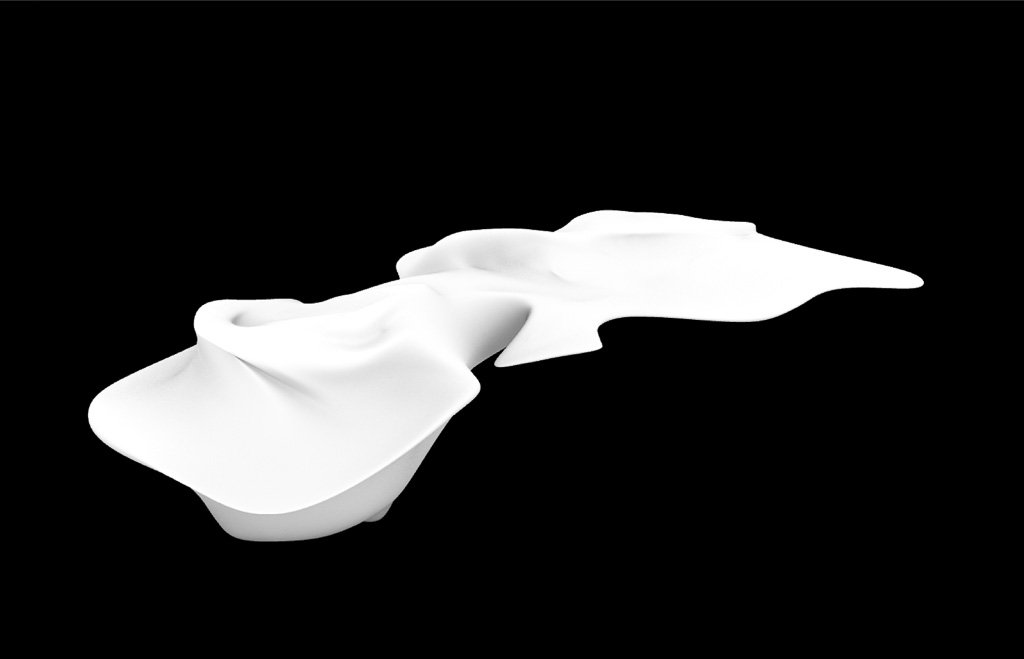
Noah Jock
Flying Model from Airfoils
Created a flying object from a digital study of airfoils, singular points, and voids. The white represents the lighter walls and light volume, while the black represents the thick walls and heavy volume.



Bryce DeShay
Flying Machine
Paper matchet structure designed to explore interior space.
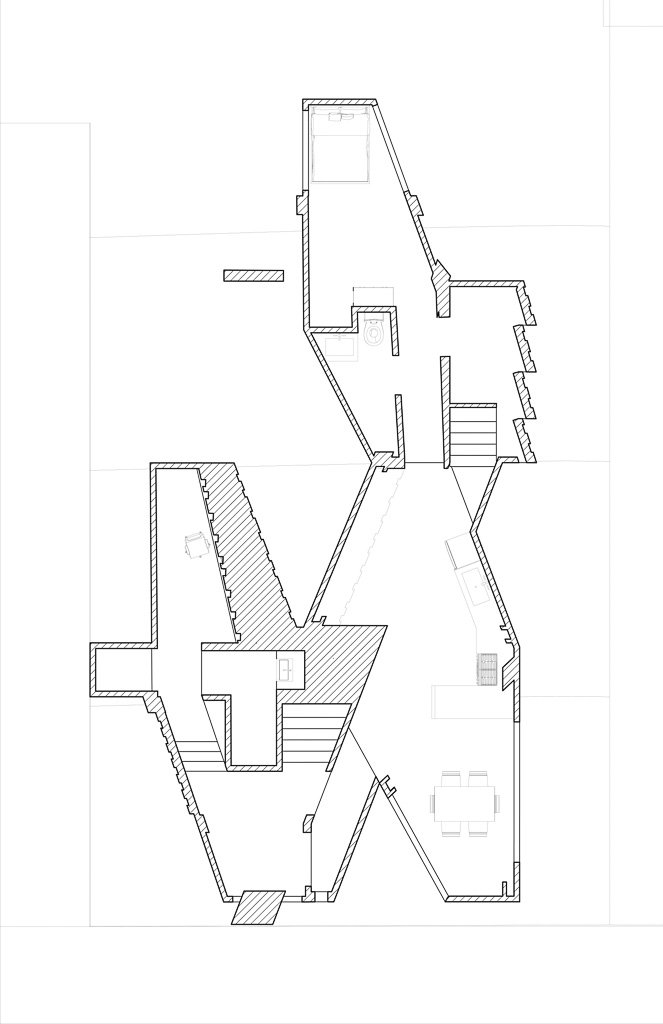
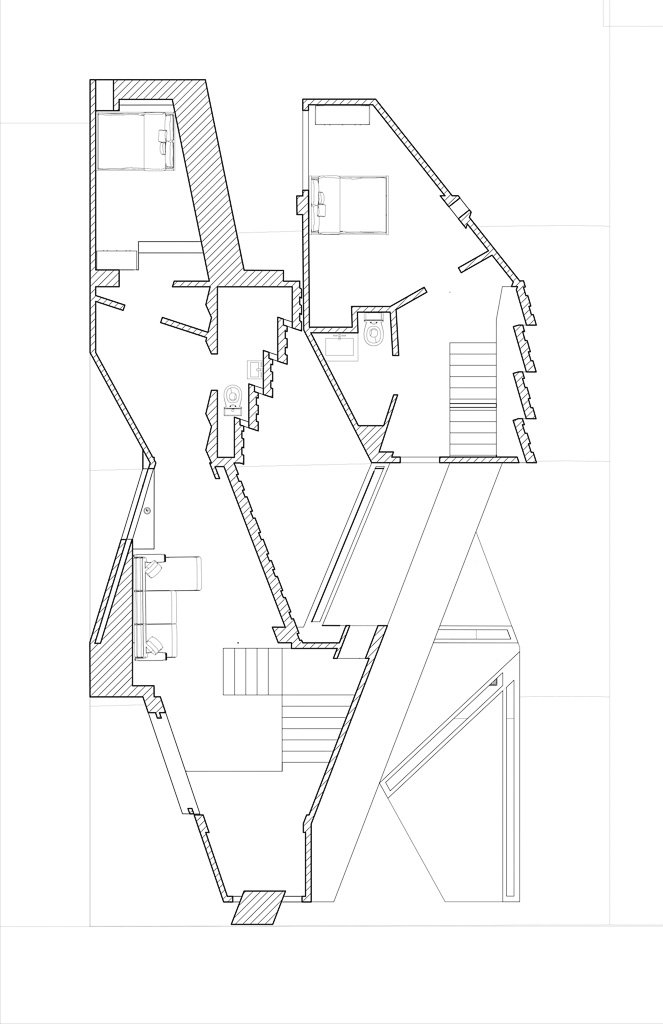
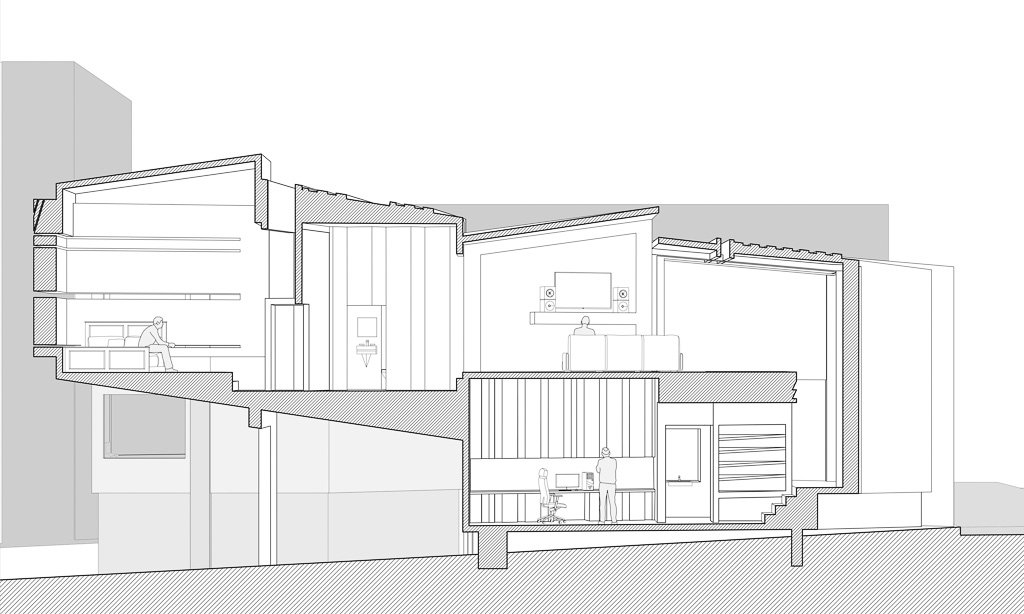
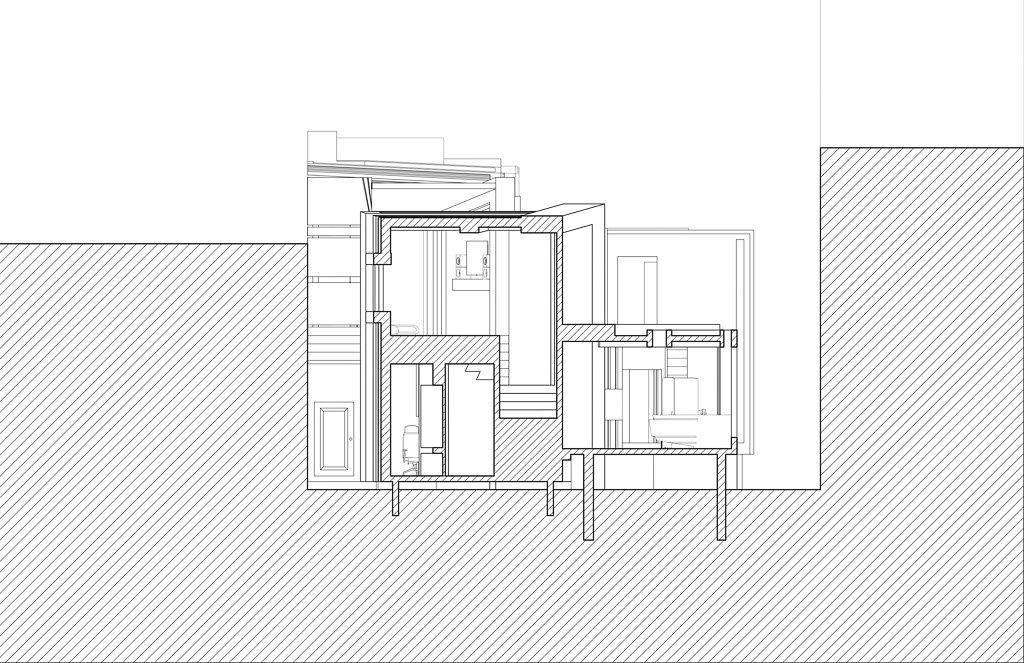
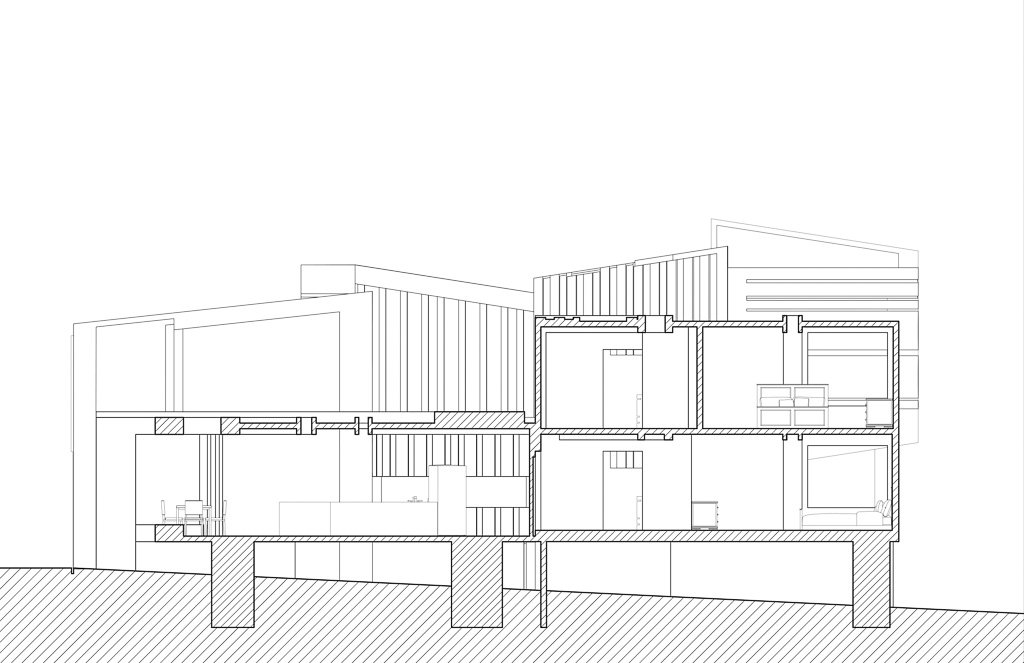



Thom Stauffer
A mobile space frame: Coherent incongruity
Mohammad Alrashdan
Mobile Construct
The work focuses on 2 major components that were emphasized and displayed, directionality and continuity. The project started as continuous lines that intersect at irregular intervals, establishing a form for the site that the project sits upon. The site was taken into consideration when developing the model. Each stick on the model had an impact on what it intersects and the shapes it forms. The shapes created lead to a single point, creating a directional pull that follows throughout the form of the model. The model maintains continuity by using shapes and forms that follow lines, emphasized by sticks or left invisible. Maintaining directionality and continuity to construct the work helps establish, as well as, highlight its theme.
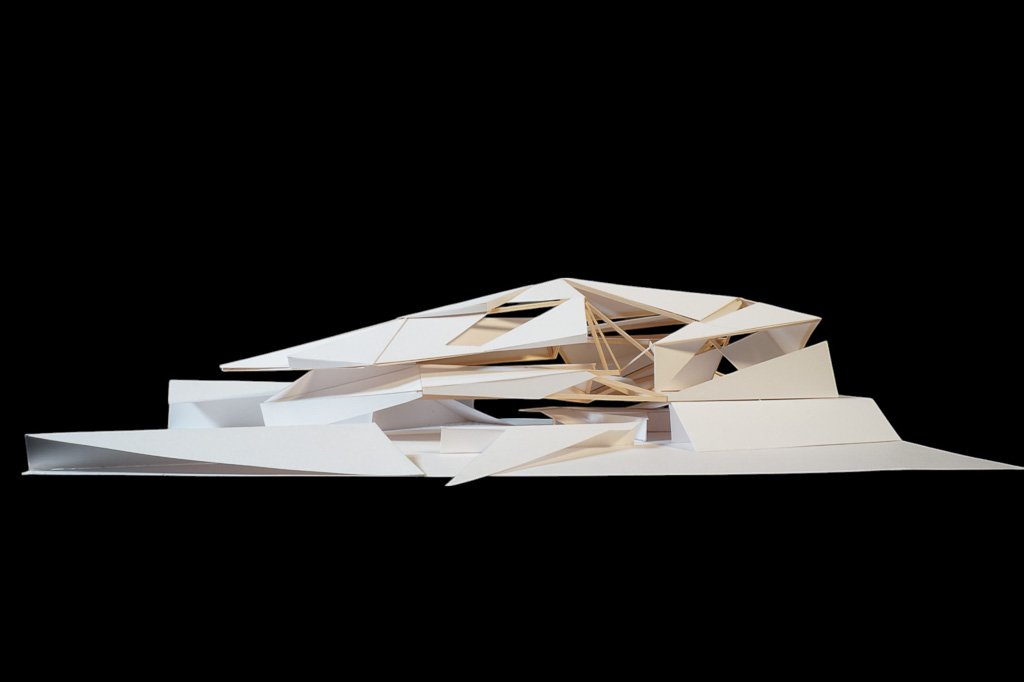
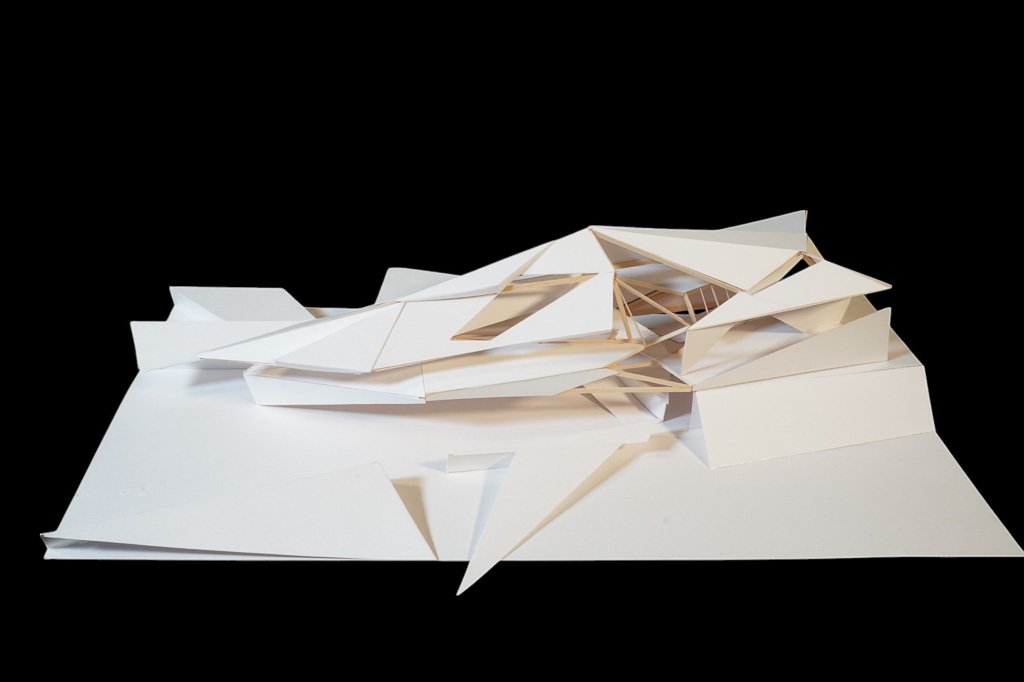
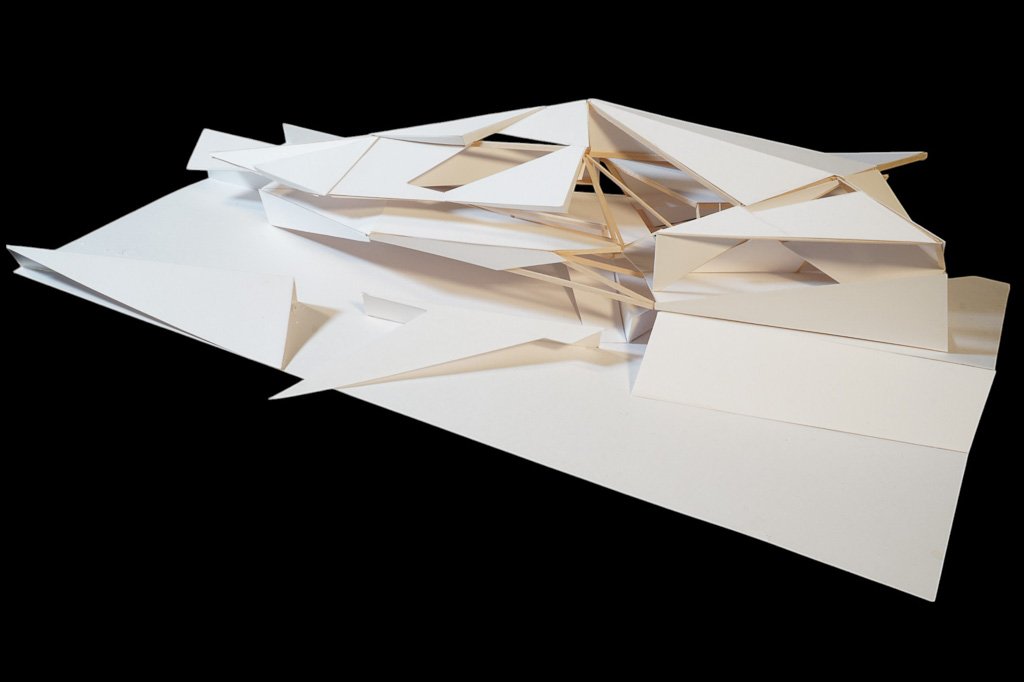
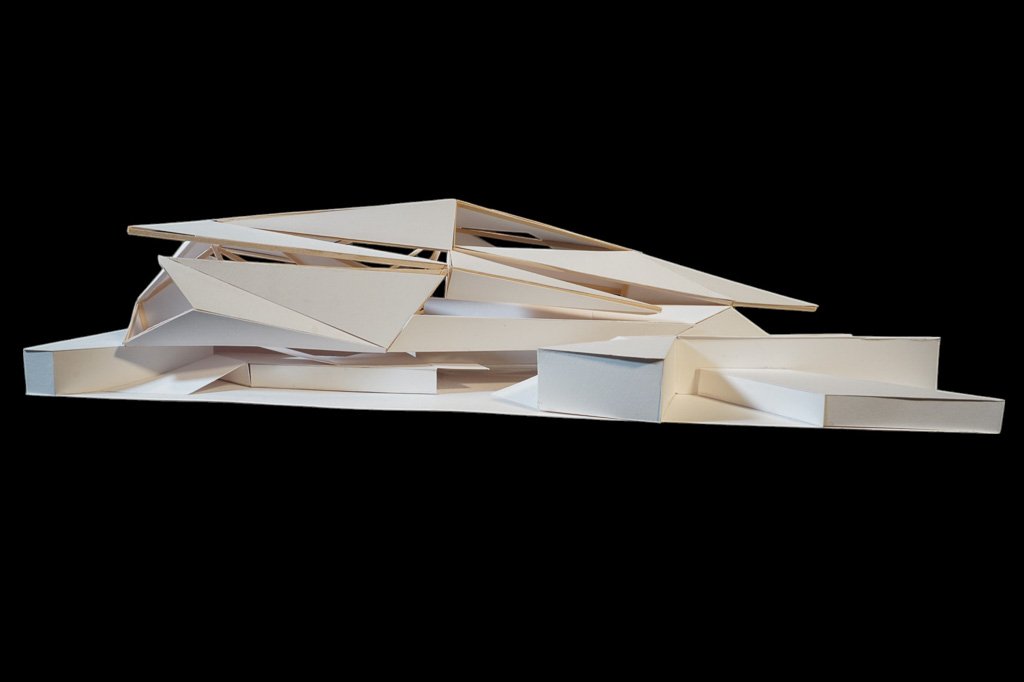

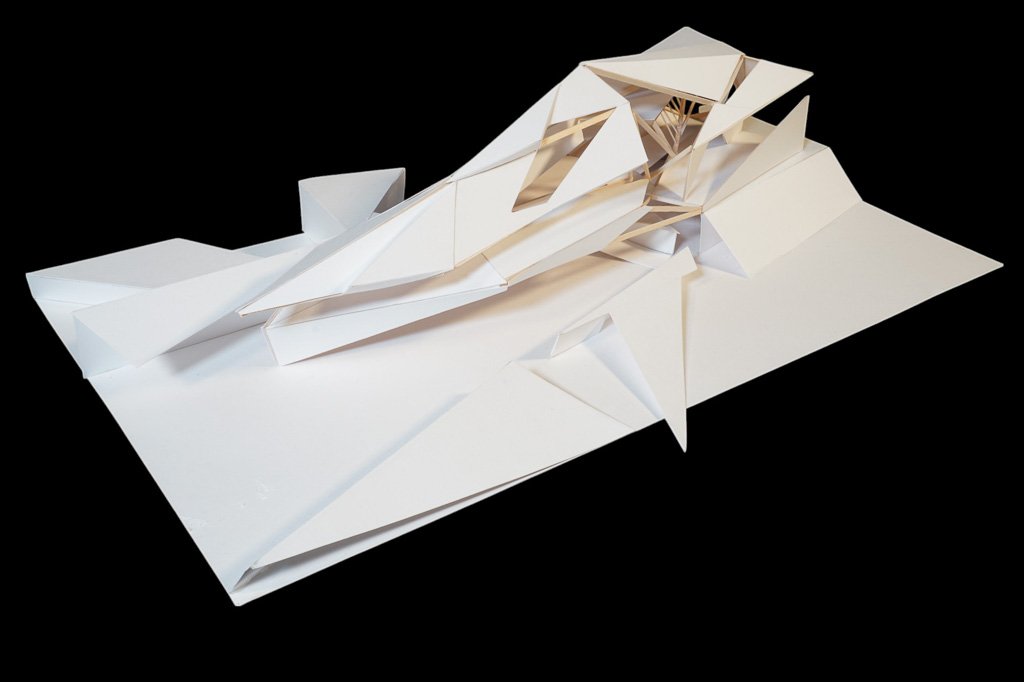

Braiden Kaiser
Final Project
This project was the result of a semester-long design process. We used previous assignments to ultimately form an abstract, mobile structure resting on a site. As we developed our designs, we avoided regular forms and focused on creating interesting architecture, taking into account experience, consistency, directionality, light quality, etc. My project depicts an indoor-outdoor theatre, made up of a main performance area, a catwalk, a mezzanine, seating, open upper spaces, and a self-structural roof.
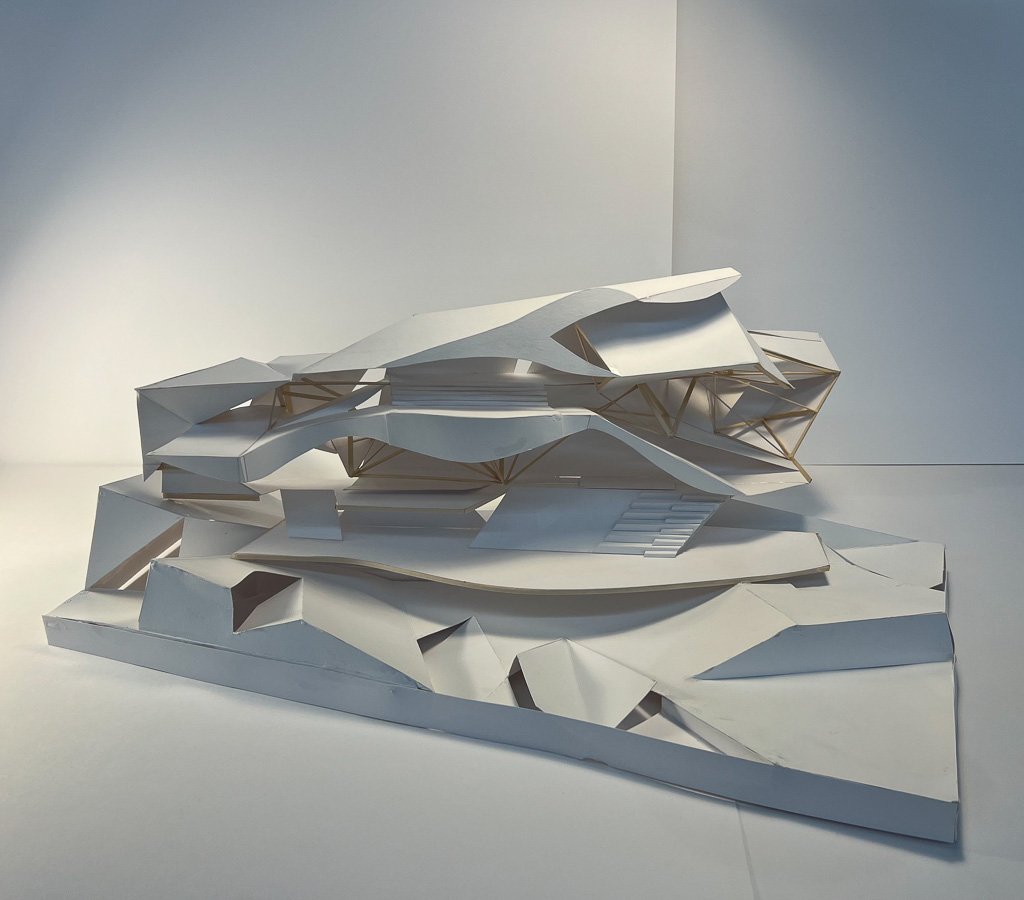

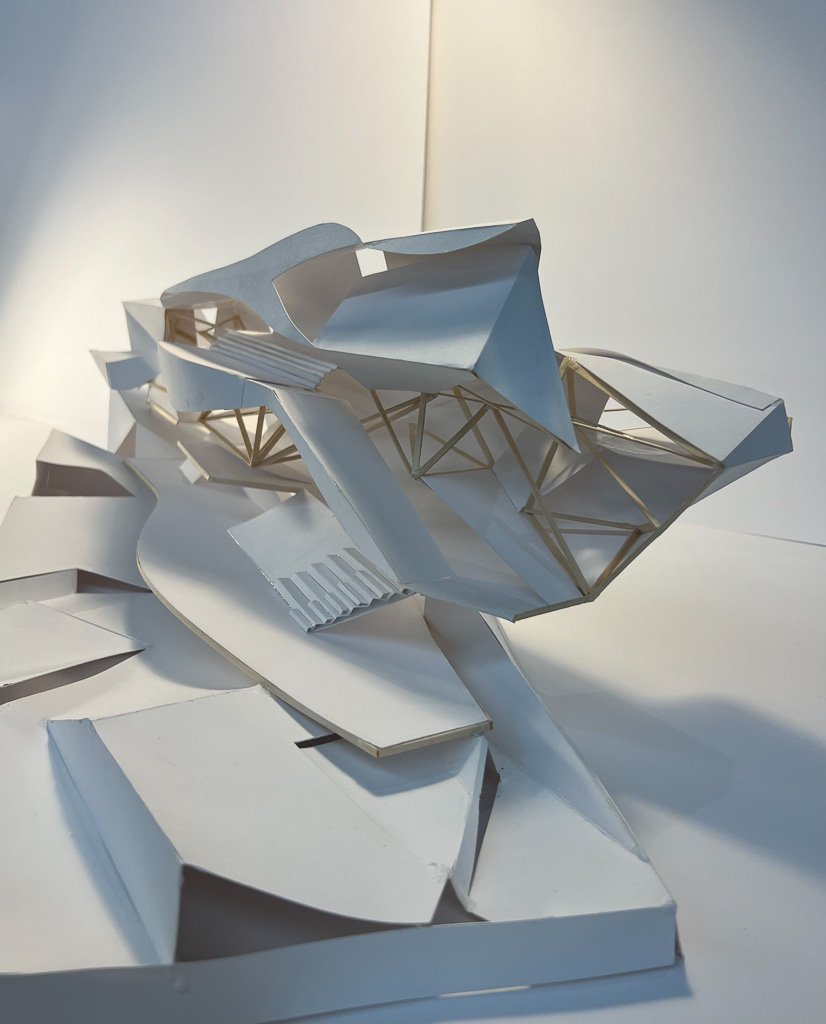

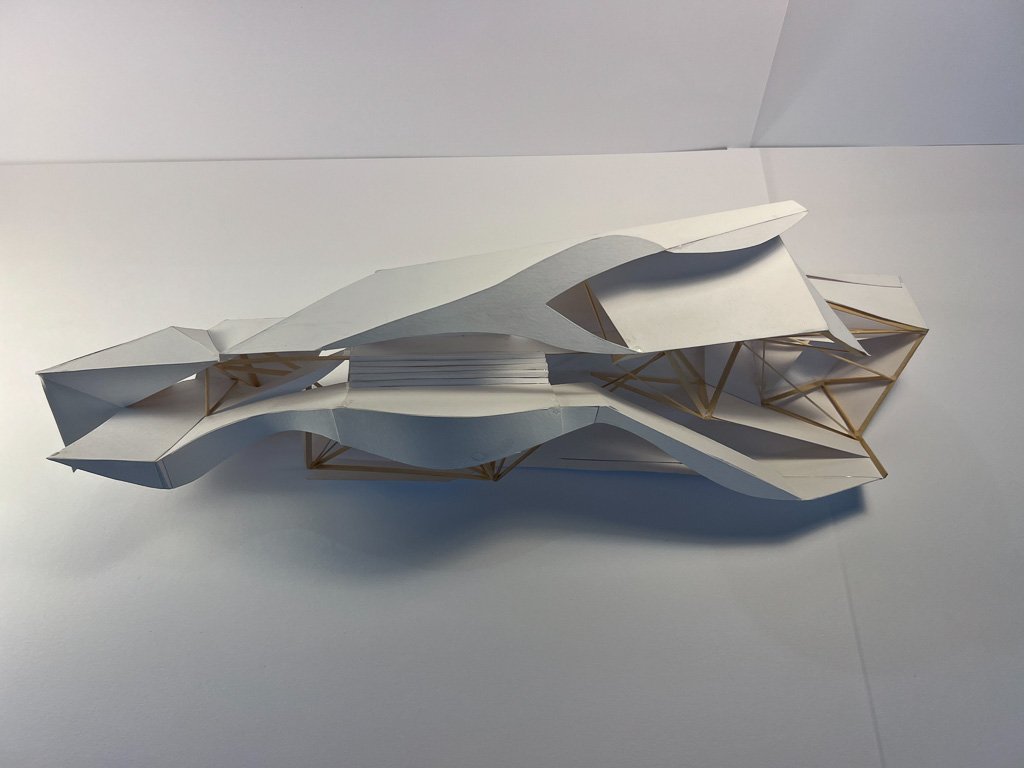
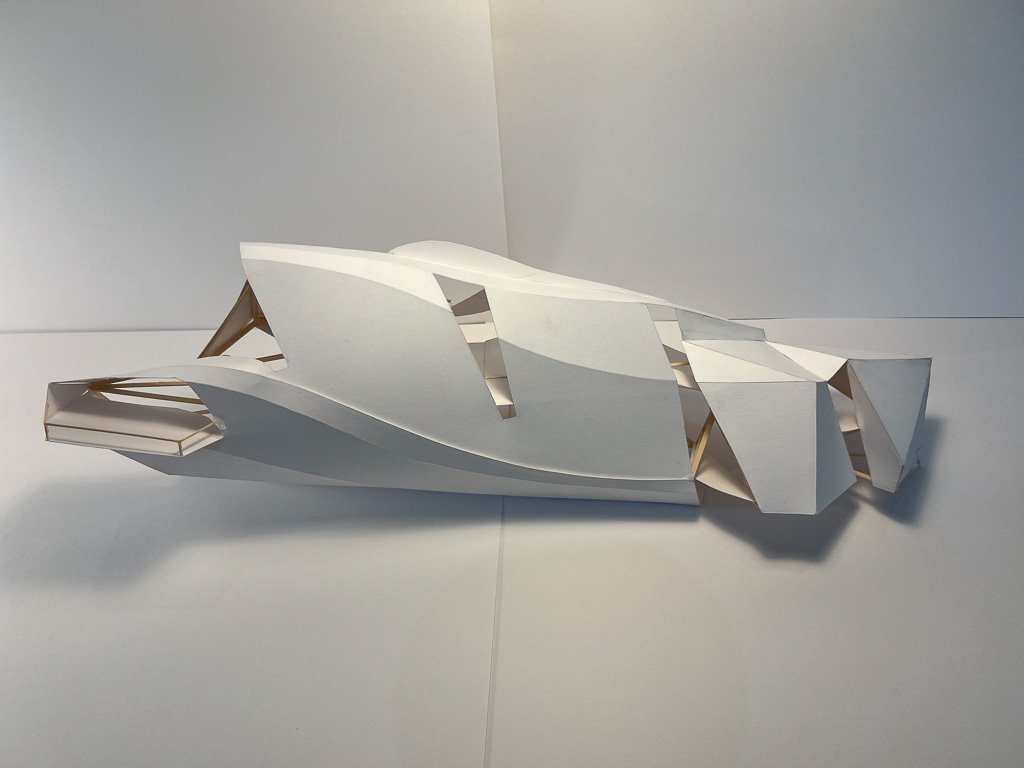



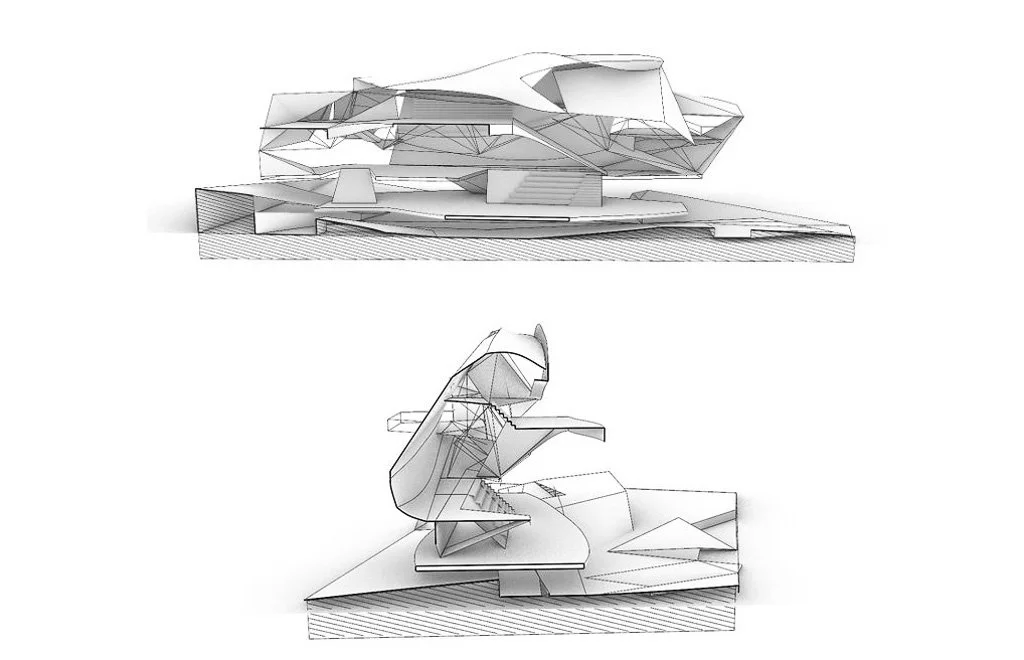
Audrey Gilroy-Scott
Flight
For our project, we took shapes we found out of line connections and explored different possibilities with those shapes, looking at how they work together within our work. We expanded on these shapes to create more complex structures that we developed into buildings. My final project was led by the directionality that flowed from the top right corner of my site to the bottom left corner. Through this, I expanded on shapes pulled from my original site that kept with the directionality of the piece.



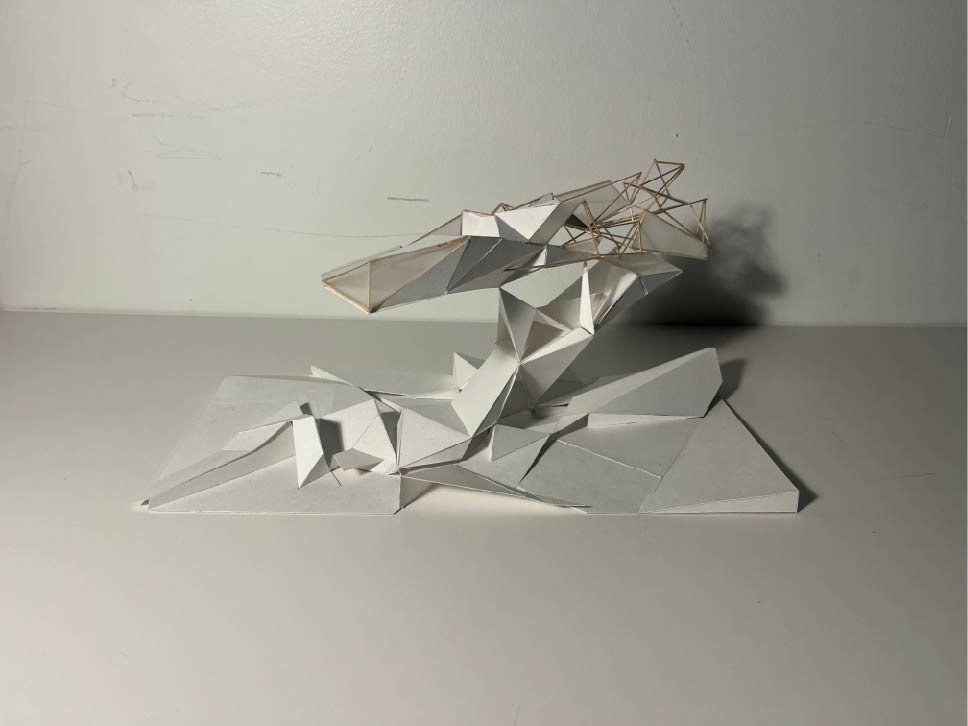



Walker MacMurdo
First Year Design Studio is rooted in representational techniques and fundamentals of design education. The notion of invention and inventive exploration are adopted as the ethos of the studio. Invention is a novel device, method, composition, idea, or process. An invention may be an improvement upon a machine, product, or process for increasing efficiency or lowering cost. It may also be an entirely new concept.
Noble Jones
PROJECT 02: FORM OR PERFORMANCE: GLIDING MACHINES
For this project, I initially took inspiration from the Peregrine Falcon. A bird known for it's ability to reach top speeds of over 200 mph, making it the fastest animal on Earth.
From my research I decided to begin by focusing on the aerodynamic form of the body as well as range of motion found in the wings.
I then used my research to make a whole new idea for a gliding machine which meshed the ideas of an aerodynamic body, with a moving appendage, to form a whole new machine. One that is able to play with forces, allowing for variation in speed, while in flight. all while retaining a clean, thoughtful look.
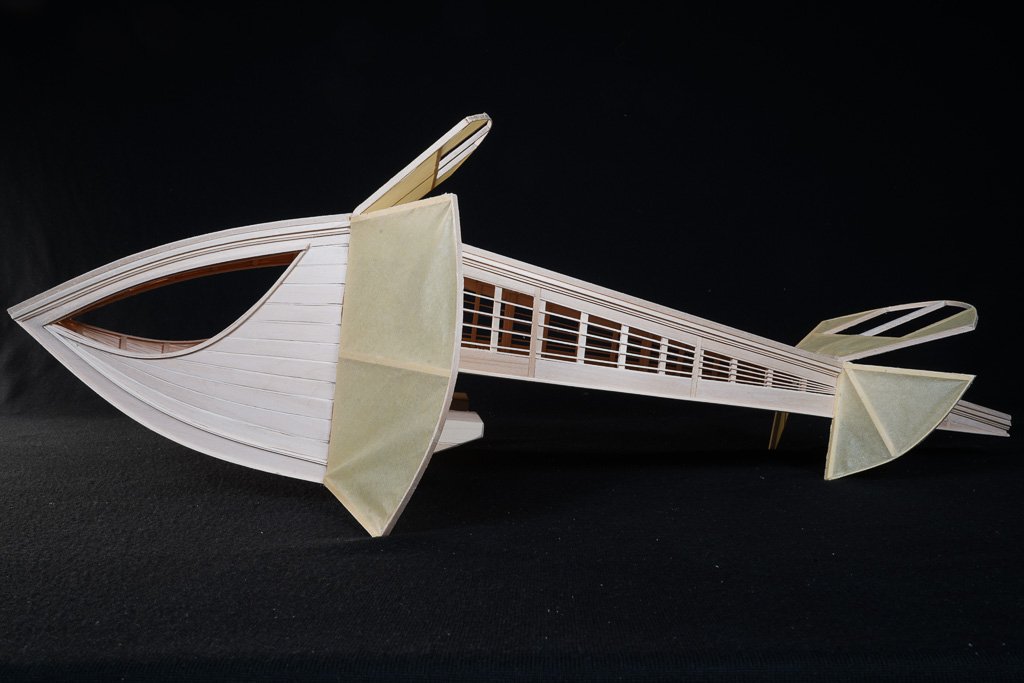

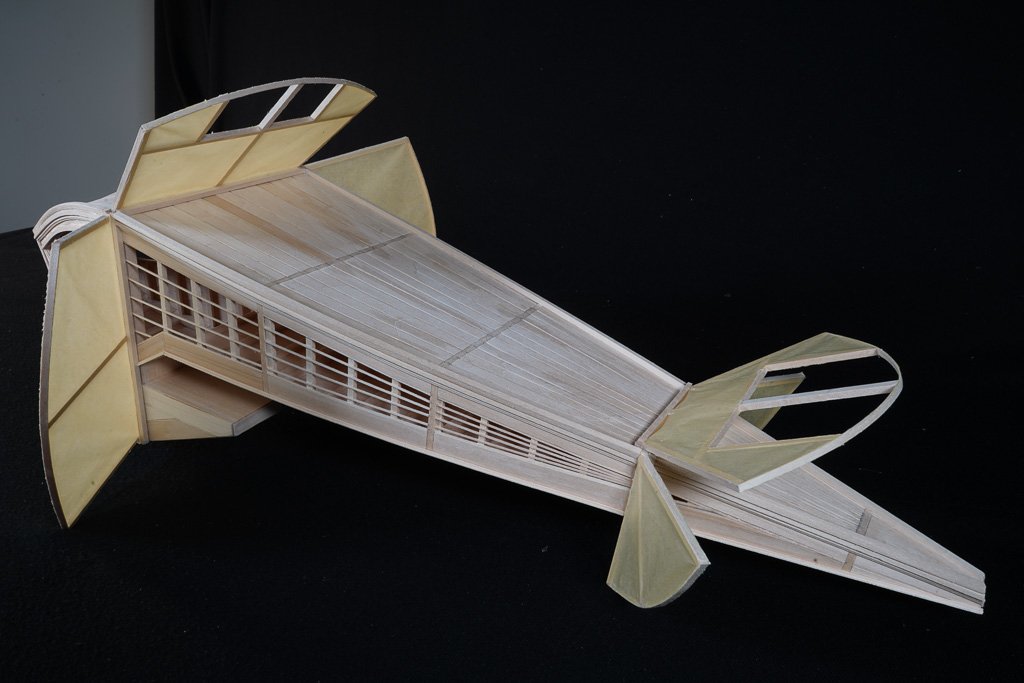
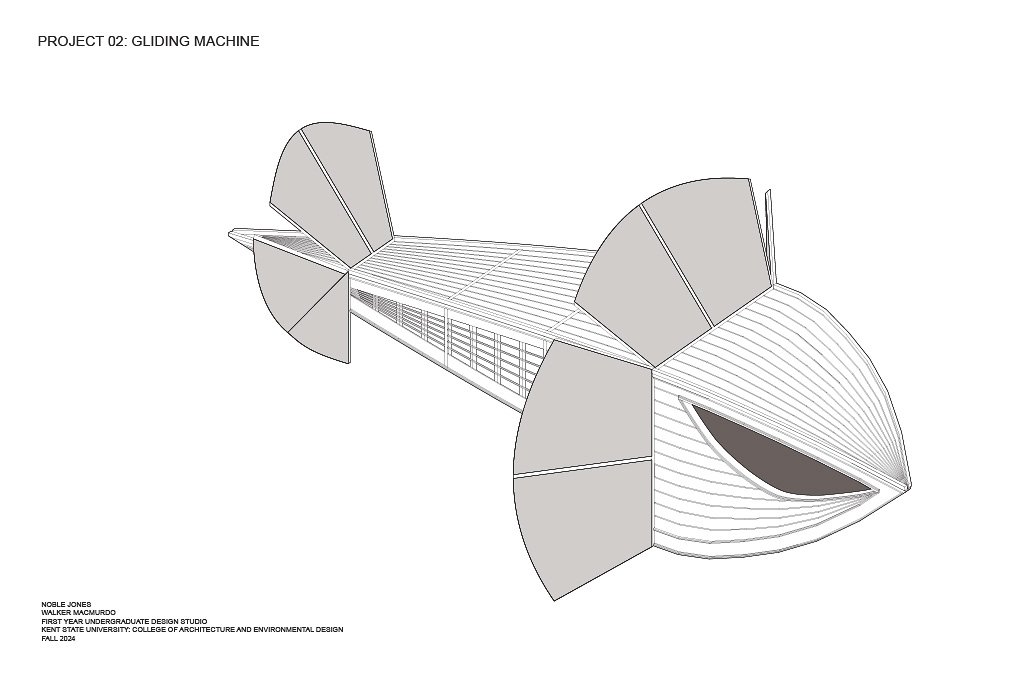
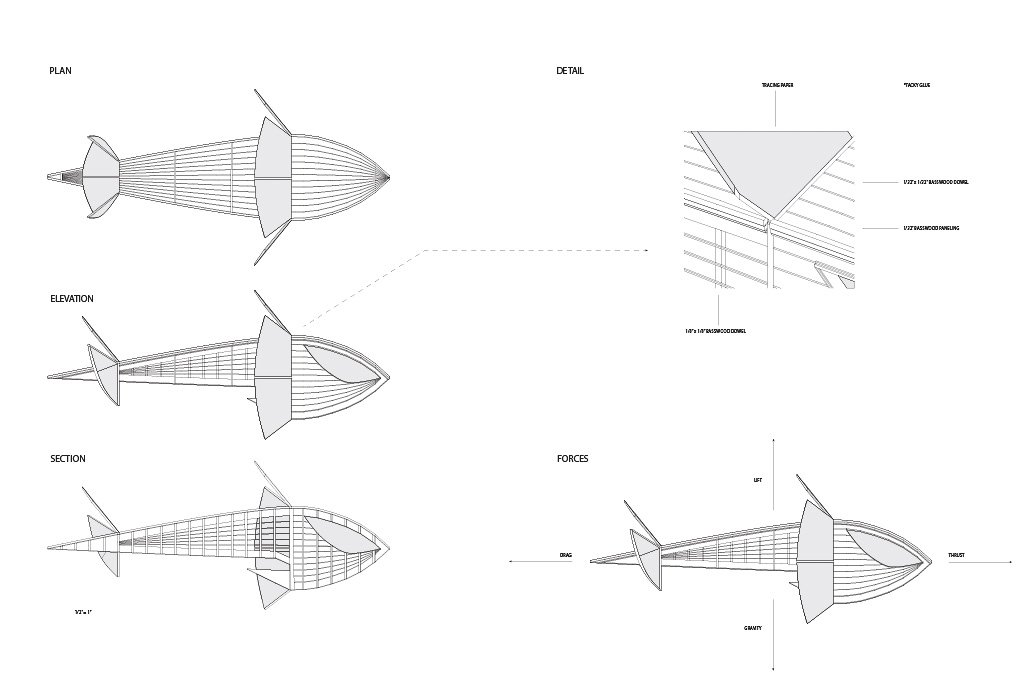
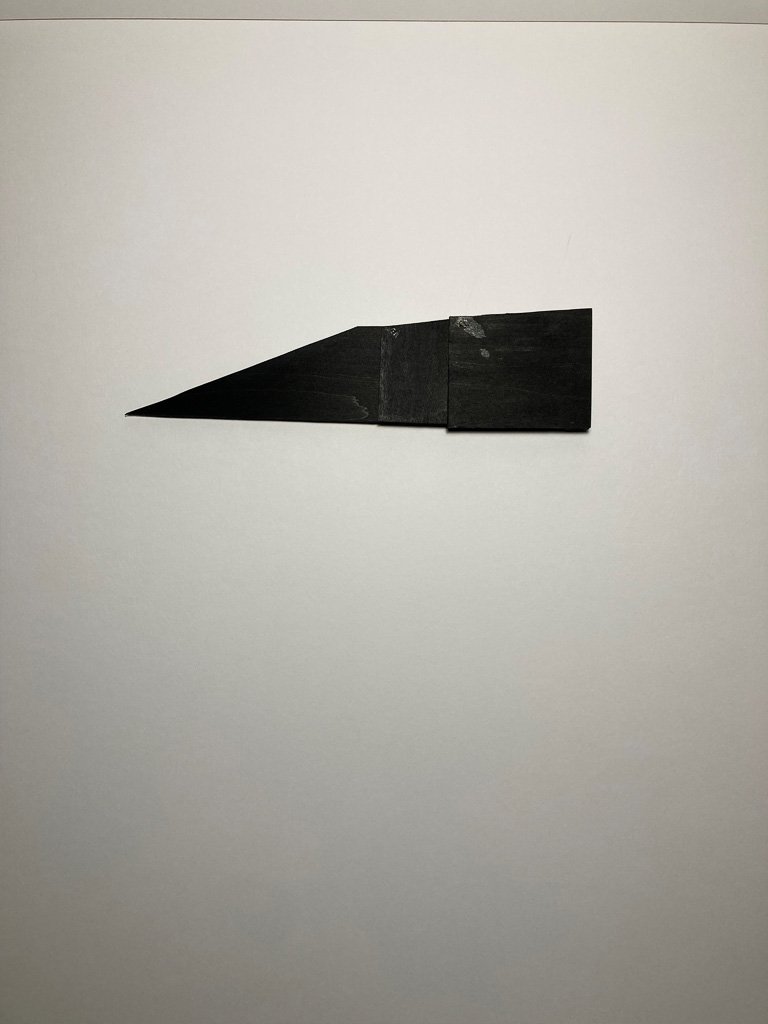
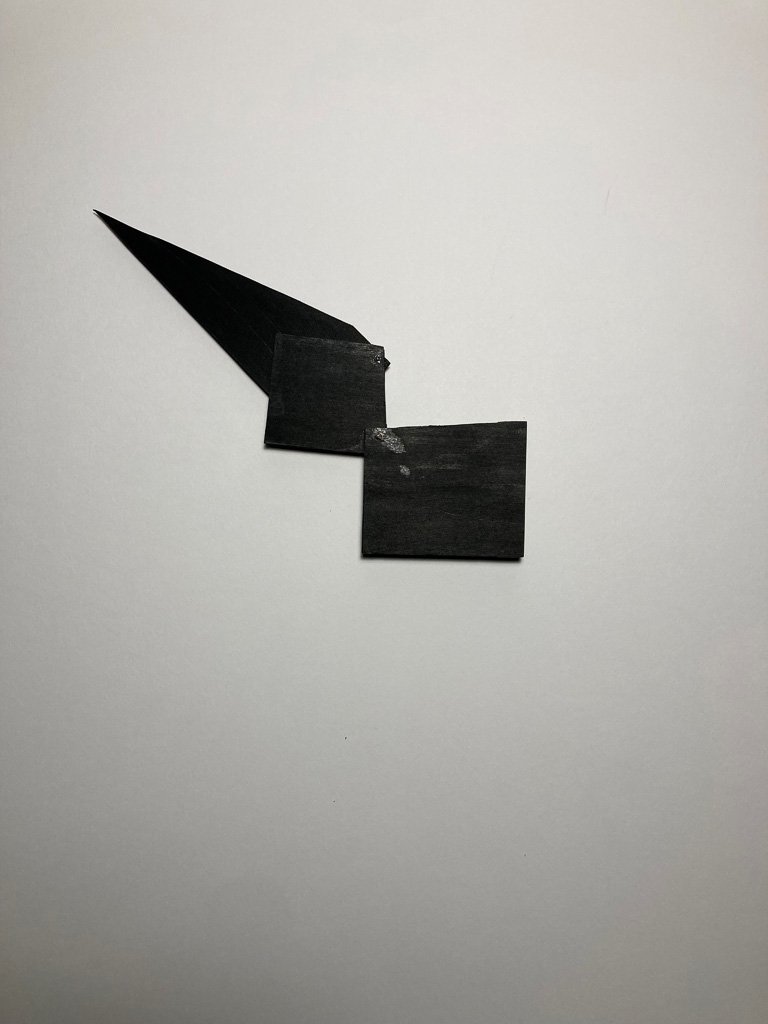
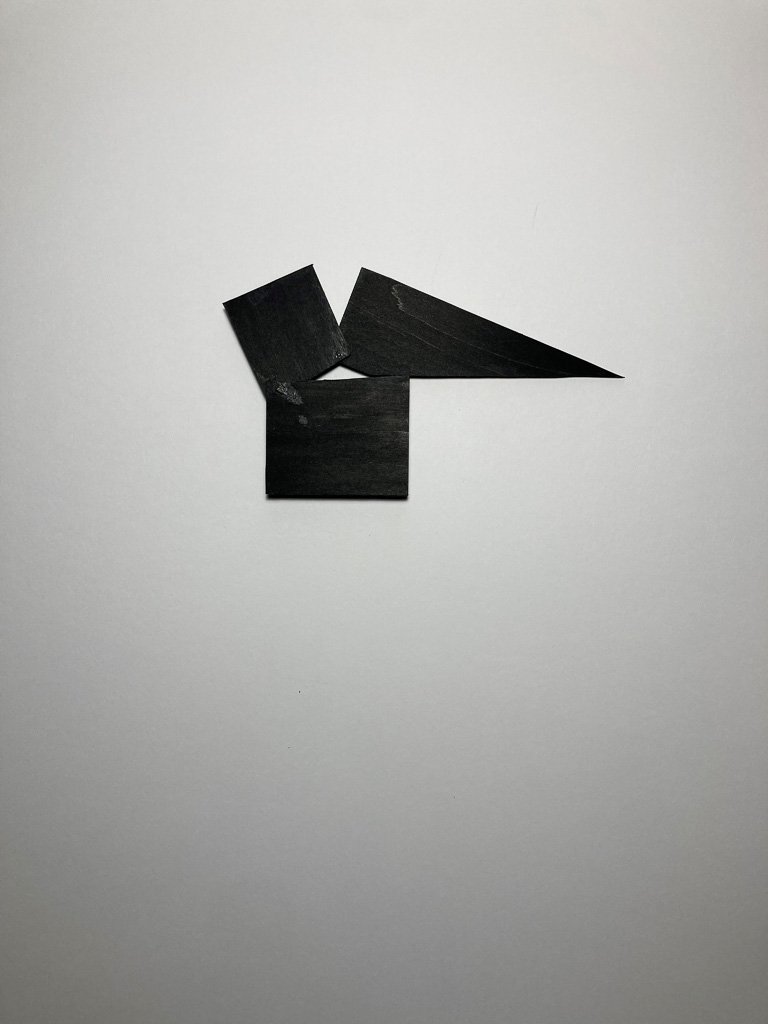

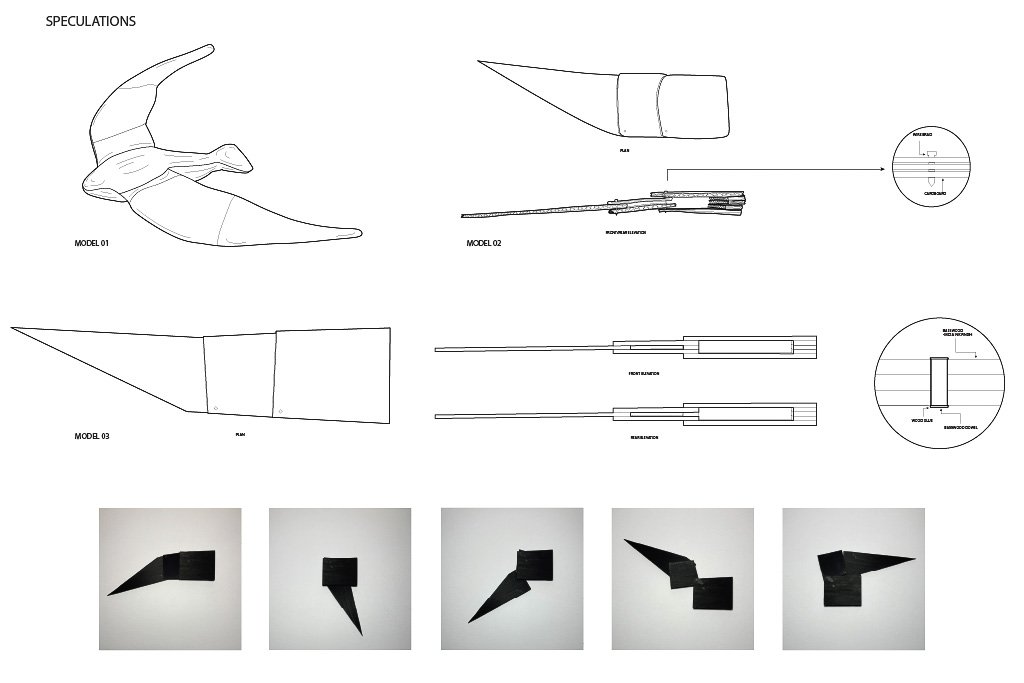
Katie Gaertner
Gliding Machine Final Project
For the final project of the semester I expanded on my original precedent, the maple seed, and explored further the various formal elements. I had been drawn to the maple seed for its simplicity and naturalistic elements to which I explored throughout the first half of the semester. I began to focus on the different elements that allowed the maple seed to fly and honed in on the veins that run throughout the seed through my analisis.
With my final project I decided to emphasize forms over performance of the maple seeds veins. The two forms that were pulled from the maple seed veins were both a twisting motion and an intricate internal design.
Using these two forms derived from my original precedent I began to develop my final model. I developed the twisting motion and made that motion the main body of the gliding machine. For the internal visual design it was important that the internal design was viewable from the empty space created by the twisting motion. The design became a gliding machine with a sharp contrast twisting motion with a delicate internal design. The final model combines the different forms derived from the original precedent to create a gliding machine.






Leah Cunningham
Project 02: Form or Performance: Gliding Machines
At the beginning of the semester, we chose something that "flies" and researched how it flew. I chose a butterfly, specifically a blue morpho. Butterflies are simple, yet complex creatures. I was fascinated by their delicate features and how they seemed to glide through the air effortlessly. My model is loosely created around the butterfly, and I designed it to focus on form over performance. Similar to the insect, my model appears simple when looked at from afar but is quite complex the closer one looks. The wings are created with "falling geometries" inspired by the simple geometries that make up a butterfly wing. The outer part of the wings appears as flat planes, and traveling inward, 3D geometries start forming themselves and, gradually, the flat panels morph into 3-dimensional diamond shapes. The diamonds are covered with tracing paper to create a light translucent effect, and basswood to act as a solid material. The middle is a vast, open space meant for air to flow through and the bottom, made of tracing paper and basswood, is intended to act as a basket to carry people (similar to a hot air balloon). The top wings align with the bottom panels but are tilted upwards so the tracing paper can catch air, creating a smooth gliding effect. I finished my model off with a little more tracing paper encasing the center part. I wanted my model to feel massive and airy. I wanted it to go along with the wind and feel very open and naturalistic instead of closed off while in flight.


Denver Curtis
FIRST YEAR Undergraduate Fall Design Studio is rooted in representational techniques and fundamentals of design education. The notion of invention and inventive exploration are adopted as the ethos of the studio. Invention is a novel device, method, composition, idea, or process. An invention may be an improvement upon a machine, product, or process for increasing efficiency or lowering cost. It may also be an entirely new concept.
Claire McGivern
Gliding Machine
The goal of this design was to create a model that highlights the Peregrine Falcon’s incredible flight abilities, focusing on movement and adaptability rather than simply replicating its appearance. The model was designed to split apart and then come back together, capturing the falcon’s agility and speed.
The design includes two main sets of wings, each with unique functions. The first set is attached using a custom ratchet locking joint, allowing the wings to open at different angles and lock in place. This mimics how the falcon adjusts its wings during different types of flight. The second set of wings folds back using a hinge joint, showing another aspect of the bird’s flexibility.
Different wing shapes were included to represent the falcon’s ability to change its wing positions based on its needs in the air. The pointed wings at the top represent the falcon’s fully tucked position, ideal for diving at high speeds. The bottom wings show the fully expanded position, used for gliding and maneuvering. A transitional wing shape connects these two extremes, illustrating the fluidity of the bird’s movements. String elements were added between the top and bottom wings to create texture and depth, reflecting the variety of feathers found on the falcon.
Overall, this project aims to honor the falcon’s unique abilities by focusing on movement, adaptability, and function. Rather than just creating a visual copy of the bird, the design captures its spirit and showcases its incredible flight skills in a creative and meaningful way.
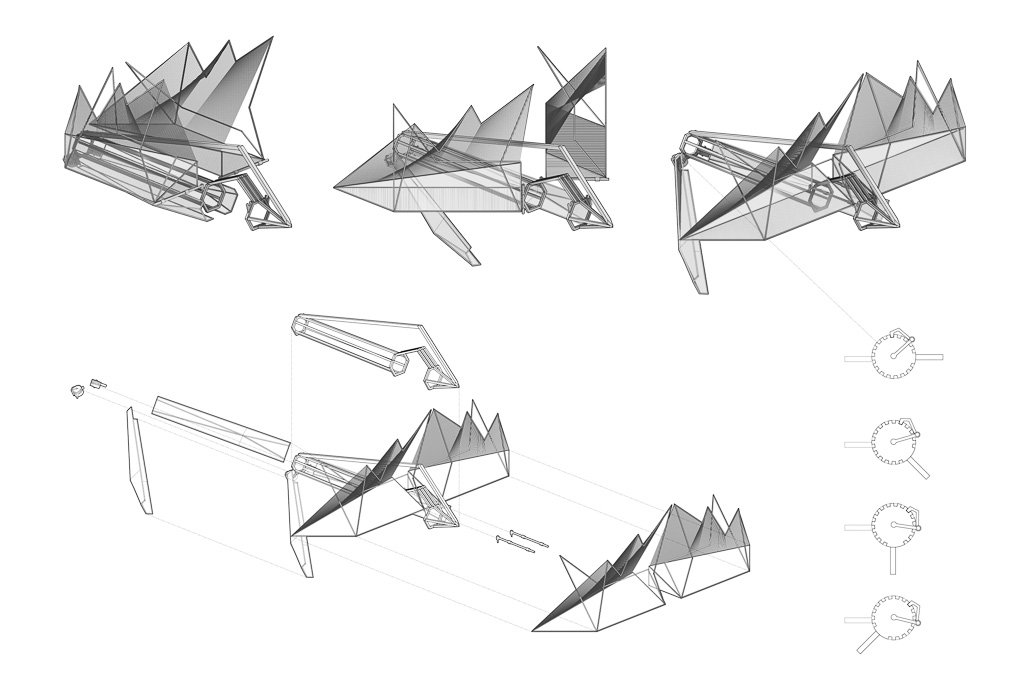






Emily Derry
Flying Machine
The flying machine created was inspired by three different moths: rosy maple, luna, and tersa sphinx. Each of the moths has a different wing and body shape. The body of the model is made of four of the same wooden shapes that derive from the primitive shape of the moths' wing in an opened position. Fabric was used as the main part of the body and wings symbolizing a moth's thin, flexible wing. There are three sets of wing designs because the moths that were researched all have varying wing patterns, hence the reason the design of the wings are not the same. The way the model incorporates movement is by its ability to collapse. Since most of the body is made of fabric, it can easily stretch open, and fold closed. The structure of the body is made of wooden planks that have been created with mortise and tenon joints. Each connection of the mortise and tenon joint is able to be seen at each corner of the shape. The four wooden structures have small metal hooks attached to the outside and inside of each side of the structure. Twelve 30-inch wooden dowel rods are placed through each metal hook and have a smaller dowel rod that goes through the end to create the opened body and lock it into place. The bigger dowel rods are glued to wooden cubes that are attached to the front wooden structure. The fabric and wings are both light-weight materials to keep the flying machine moth like. The wings of the model can connect to the body with clothes pins so that they can be taken off when the body collapses. The idea of this type of movement is for the capability of traveling with it effortlessly.
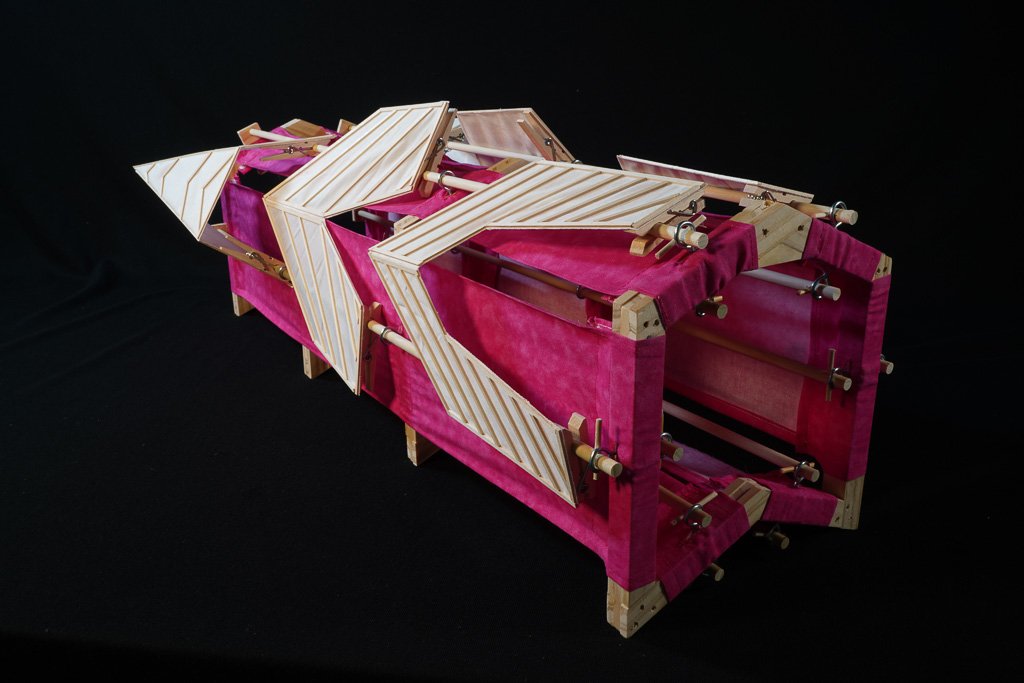


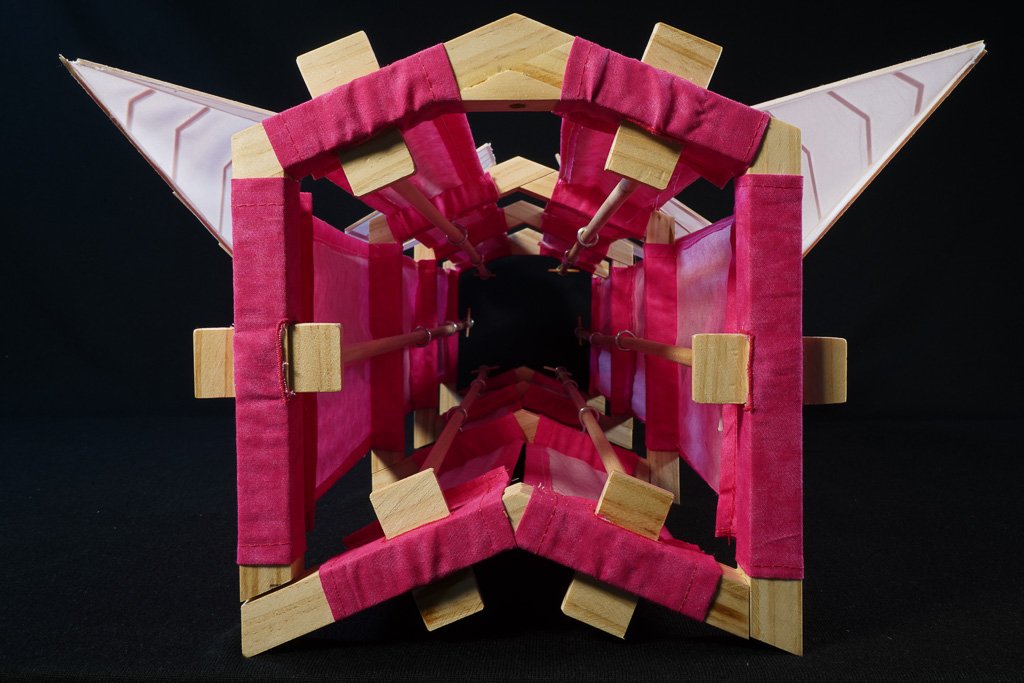






Mikayla Szabados
FORM or PERFORMANCE: Gliding Machines
The model is inspired by various aspects of flight, specifically relating to helicopters. It features wooden hexagon rings arranged on wooden dowels with supporting sticks to create the frame and structure. Externally, the flaps are made with wooden sticks, clear mylar paper, and wooden hinges. Internally, a crankshaft-lever mechanism made of chipboard, nails, foam, and a ball-bearing mechanism. The center dowel can be spun by moving the hexagon at the top, which in turn moves the crankshaft arms and the flaps they are attached to. Thus, a hinge movement results from a spinning motion. Similarly, helicopters utilize a spinning motion of the blades to move the aircraft in any direction.

Zach Falor
A project that analyzes the flight analysis of various objects and by reducing those qualities down and regrafting them into a new creation develop a project that creates interest and intrigue by analyzing space, shape, form and material.
Abdalrahman Al-Jammal
Flying Machine
A device or a mechanism that deploys a physical system that uses power to apply forces and control movement to perform an aerodynamic function. The flying machine mechanizes naturally occurring currents of rising air in the atmosphere to remain airborne. However, the project can take advantage of its formal or performative aspects of flight and challenge the new definition of aerodynamics.

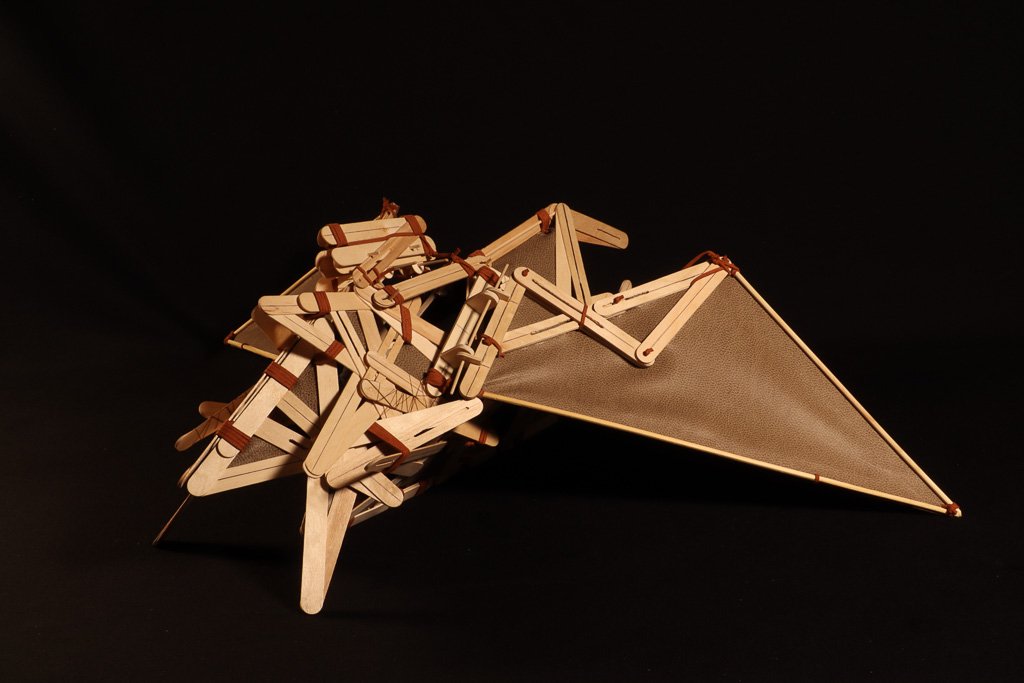


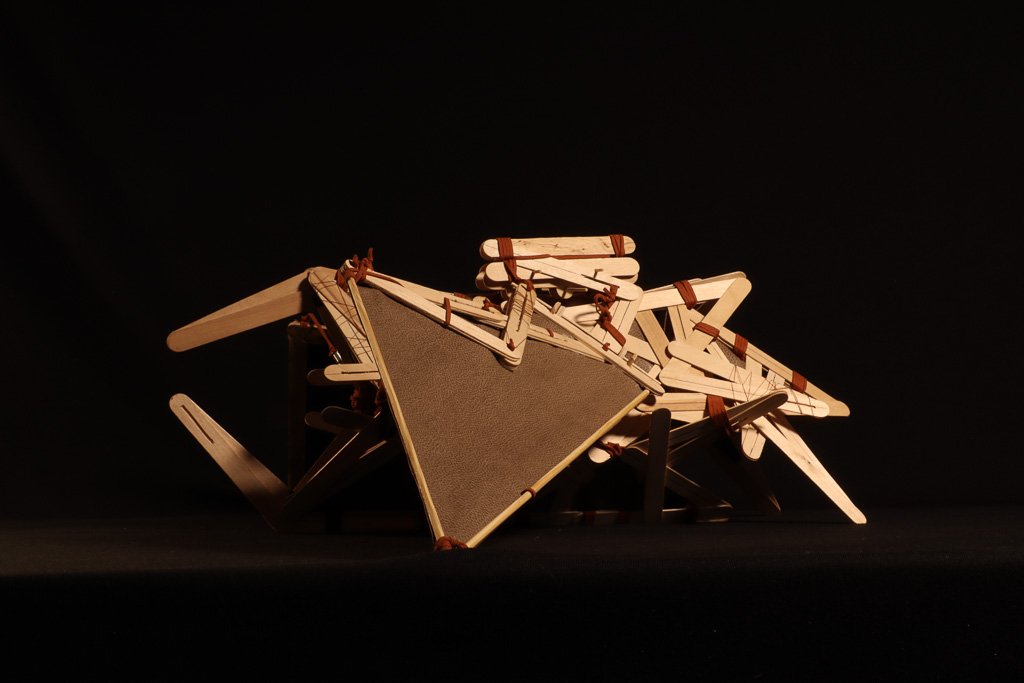
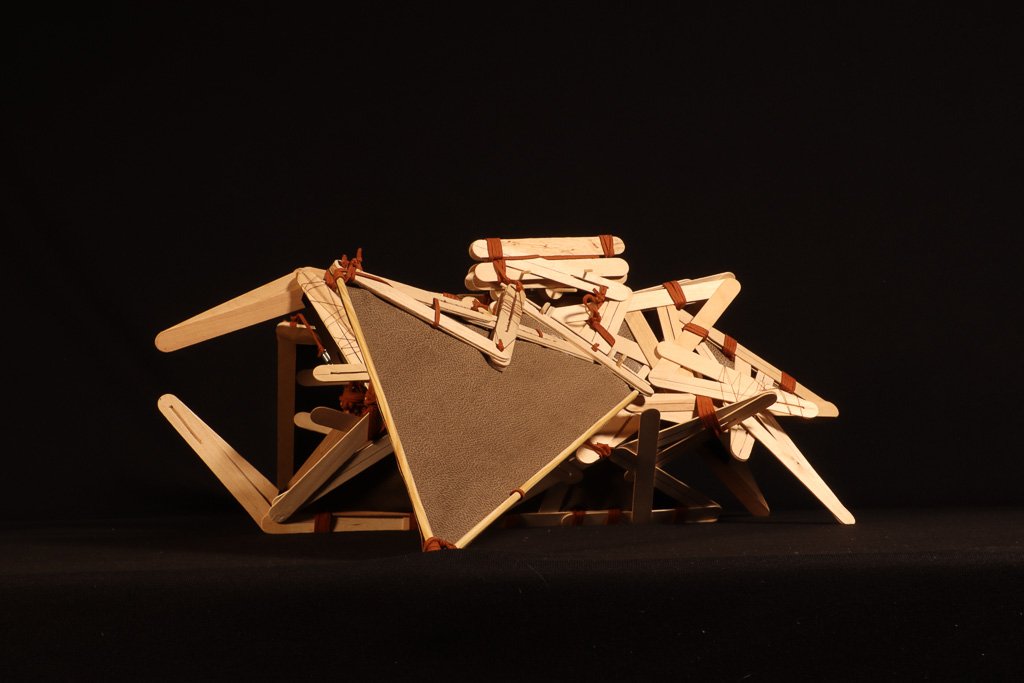
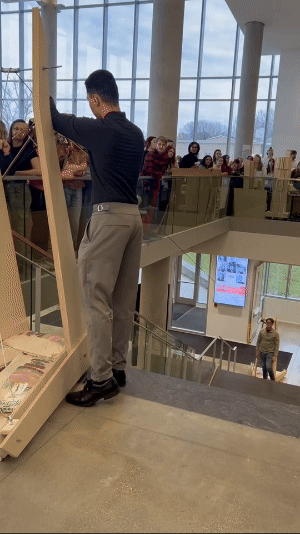
Leah Johnson
A Dragonfly In Motion
With inspiration from a dragonfly in motion, this flying machine presents many qualities specific to a dragonfly’s wings. As the semester progressed, models became less literal and more focused on including wing details more abstractly. The final model is made up of figure eights aligned on a central axis, as a dragonfly’s wings move independently from one another in figure eight patterns. The model’s front side is closed off, with more wooden framing that connects figure eights and paper covering otherwise open spaces. It also remains colorless. Moving towards the back of the model, there is a clear addition and darkening of color, with a lighter, more airy, and playful feeling expressed through the breaking of figure eights and colored paper flowing loosely between the wood. This transition from front to rear can be viewed as the connection of the body to the wings- solid and enclosed to light and airy.
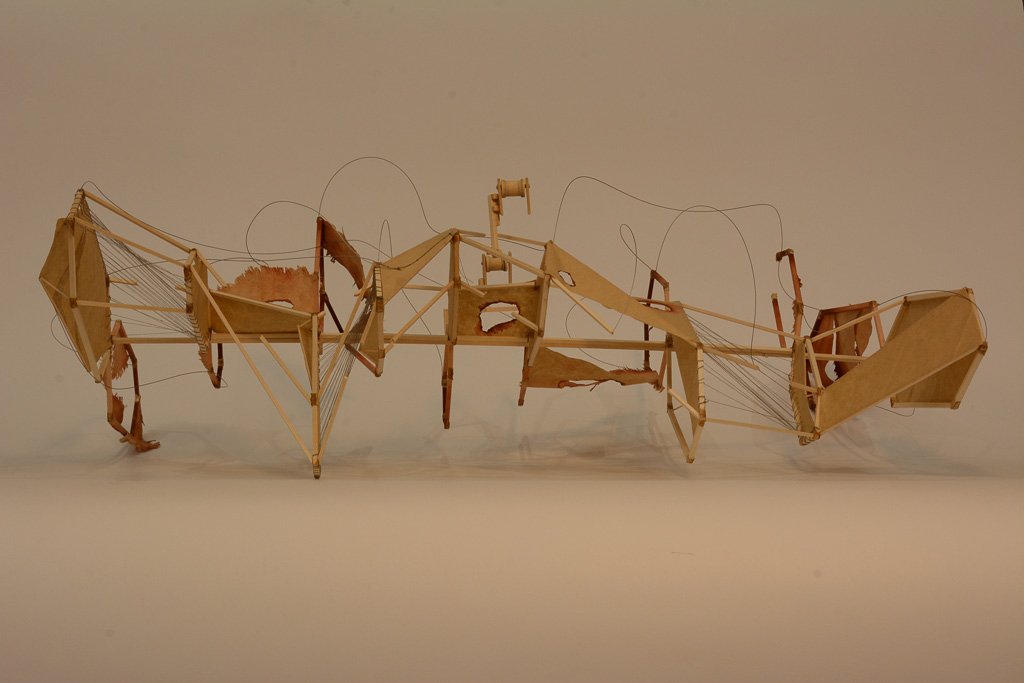


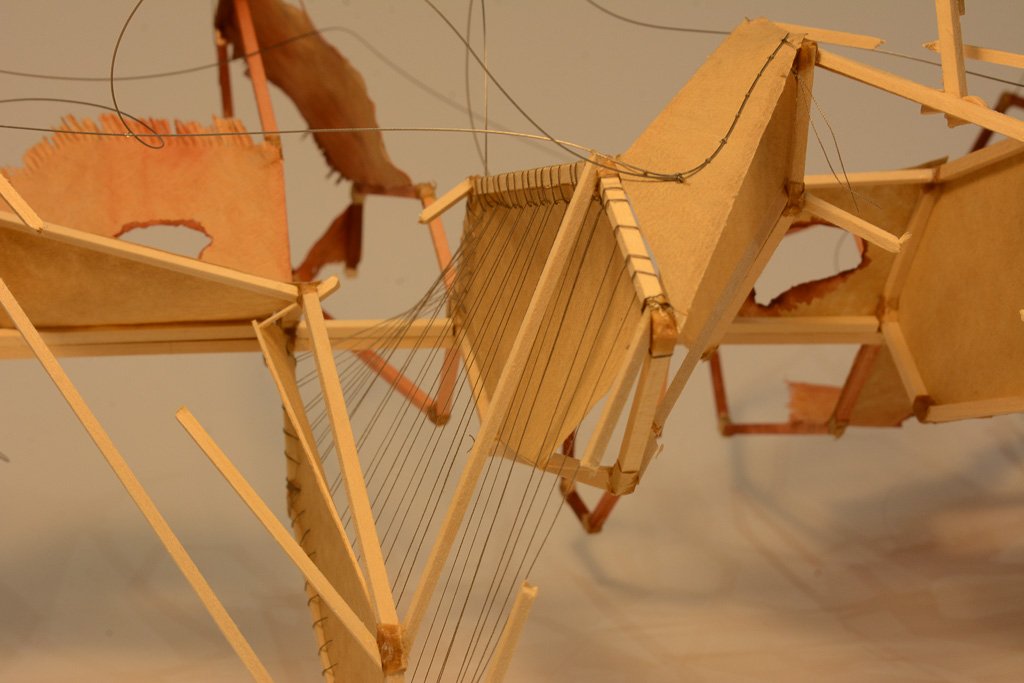



Grace Scullion
Dragonfly in Flight
The main focus of this project was to create a Flying Machine that exhibits all of the aspects of the complicated flight pattern of a Dragonfly. By focusing on specific components of the wing - such as the vein structure, flexibility and stiffness; a visual representation of the unpredictable figure eight pattern of the dragonfly wing was formed. Through geometric and organic movement, a continues path is followed throughout. Using Leather, colored paper and reflective materials, each components highlights a twisted figure eight motion. Hanging pieces that are falling from the main structure represent the unpredictability of the motion, as each wing of a Dragonfly oscillates in its own pattern depending on the goal of the flight.
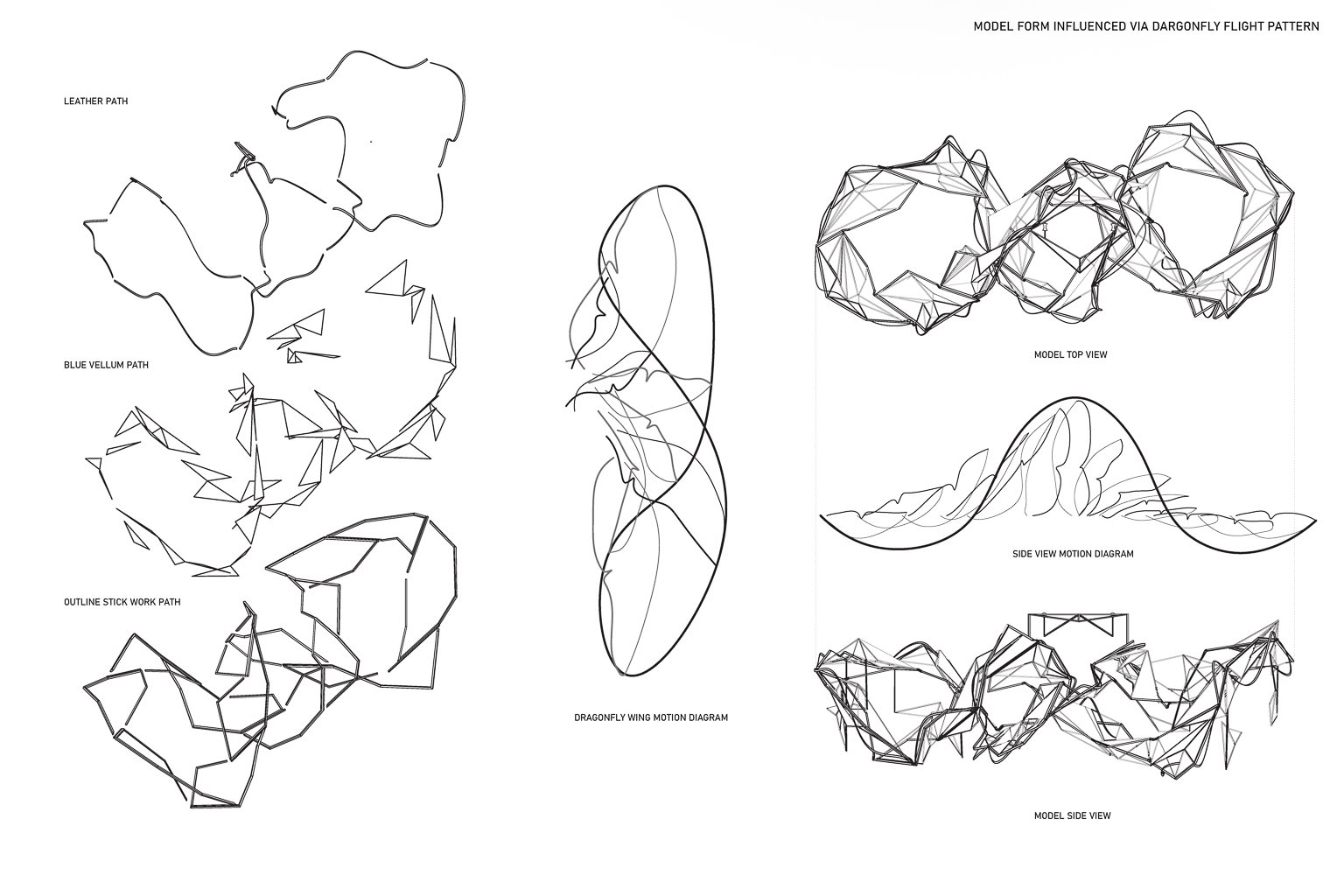
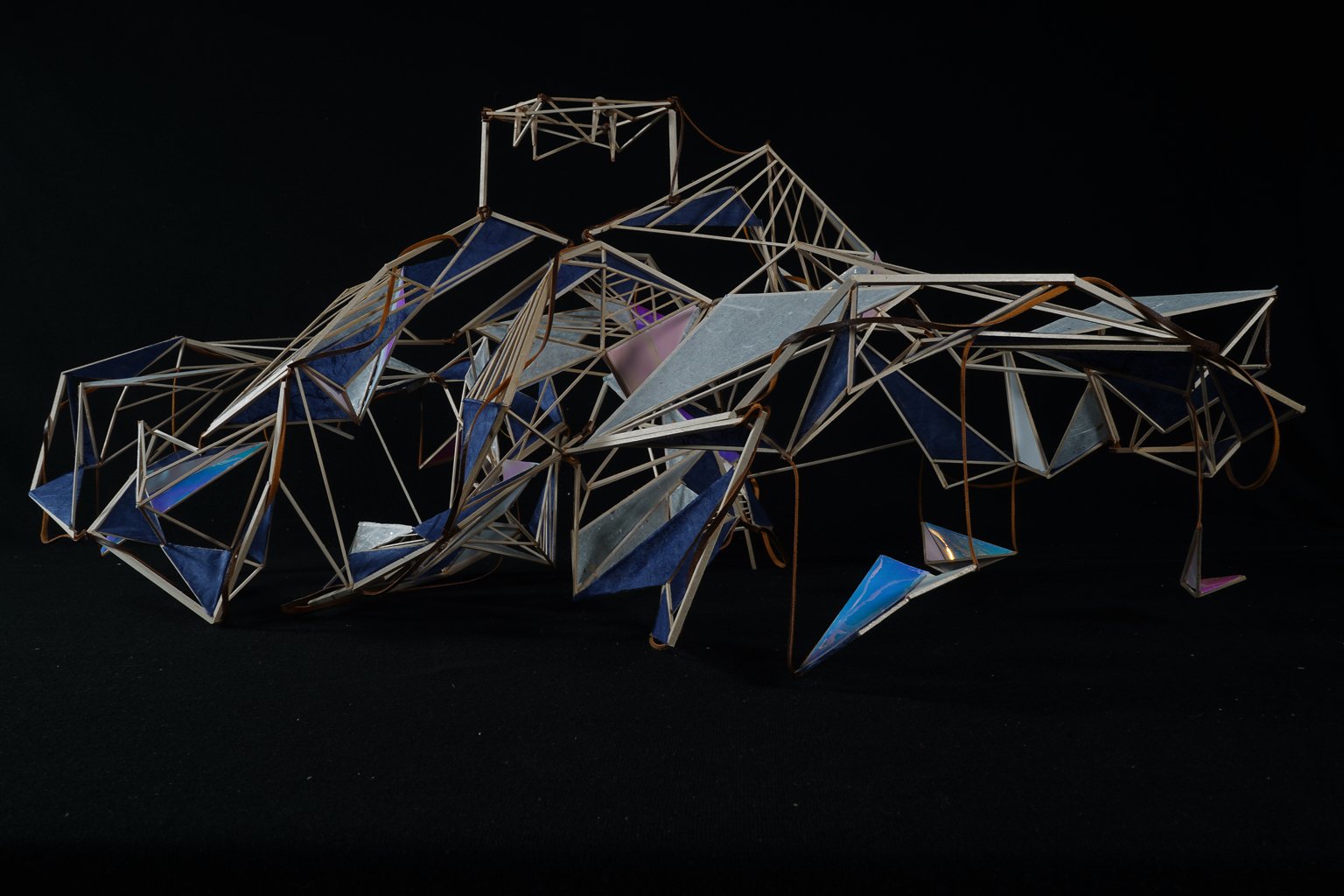

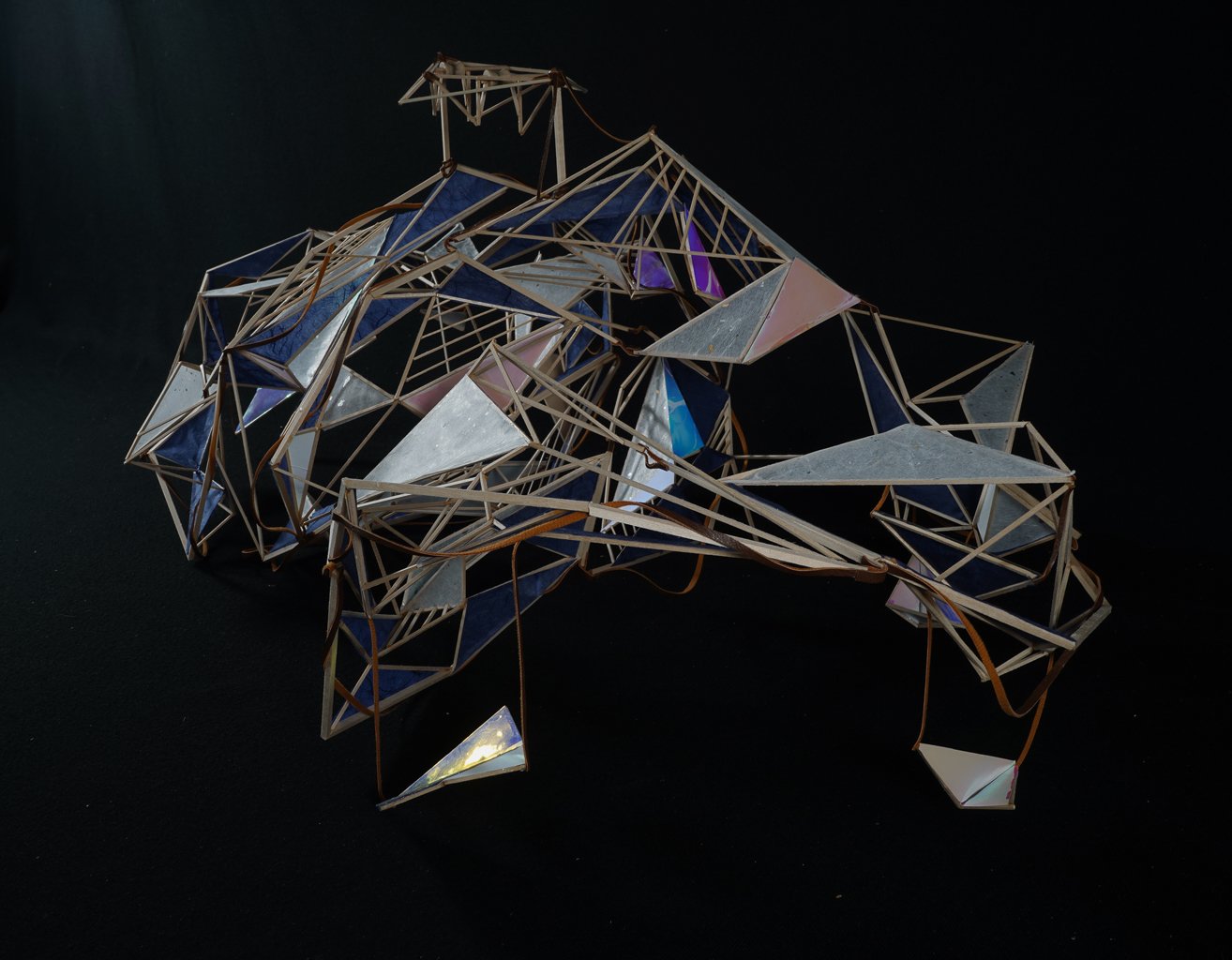


Joseph Zgurzynski
Investigation of the Flying Fish
For my project I chose to study the movements of a flying fish. I focused on the movement of their bodies while swimming and flying as well as the movements of their fins during flight.
To capture movement, I created three body pieces made of foam core that were attached with hinges and covered with layers of bristol paper. The bodies are meant to resemble an abstract form of the fish’s body. For the fins I used similar hinges and then left the fins partially unattached to allow for a fanning movement.
For project two I was inspired by a school of flying fish. I created a large central body with repetitive body structures to mimic a group of fish. I experimented with riblike structures made of balsa wood in place of the foam core. I also used layers of bristol paper with sections of wire mesh to mimic that of fish scales. I made additional body attachments on the sides of the model at different angles to imply movement. Numerous fins were added to the bodies with only the outer most ones incorporating hinged movement. The fins that incorporated the hinges would be lifted by air force during flight. To attach the model to the zipline, I designed the top body piece to hinge up and reveal two rollers that are embedded into the model which would be set onto the zipline. Due to the bodies being constructed out of foam core, the model had a lot of weight. The weight resulted in excessive speed during flight, causing damage to the model when it struck the stopper at the end of the wire. To solve this problem, I constructed a spring mechanism embedded into the model to absorb some of the impact force from the stopper.
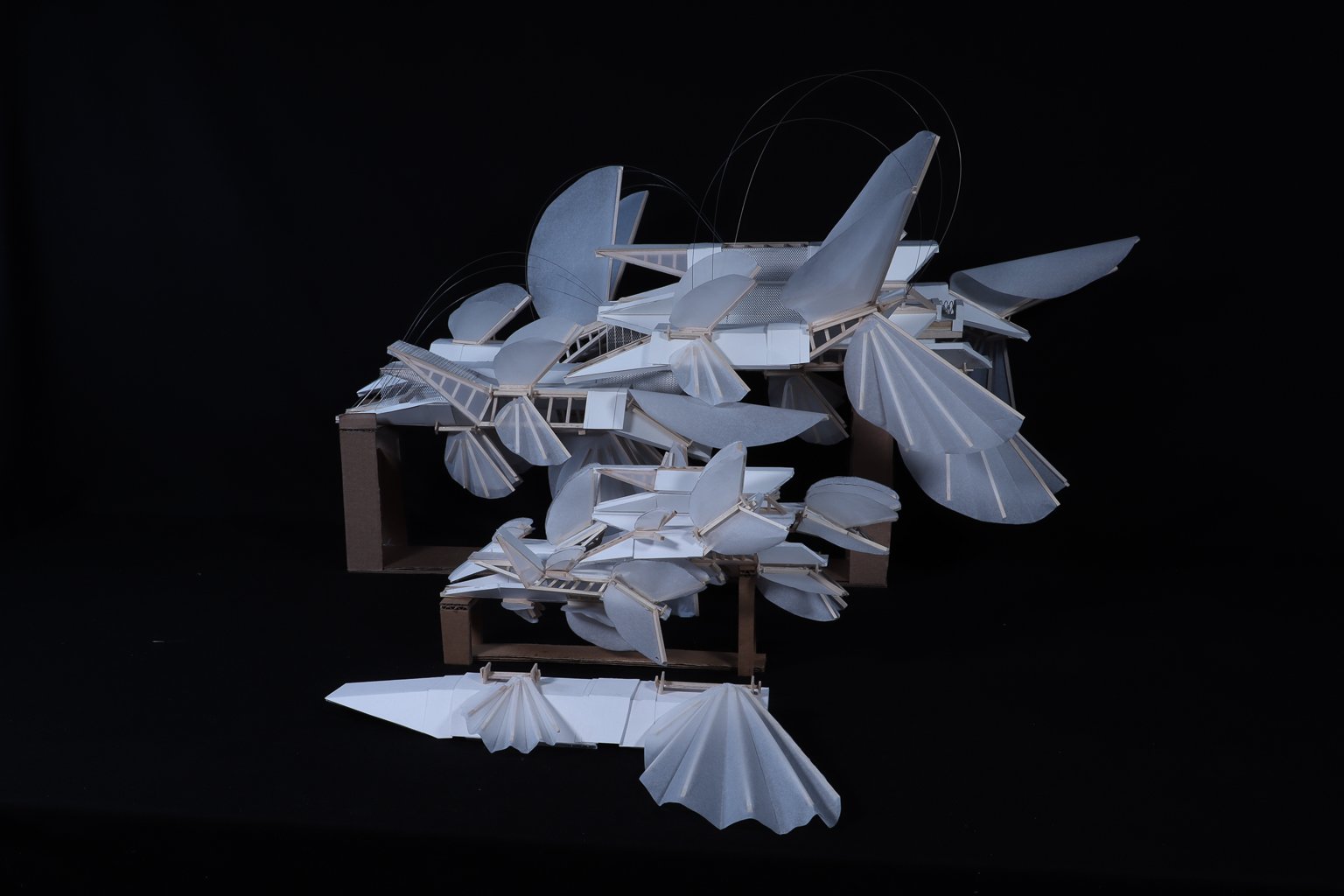
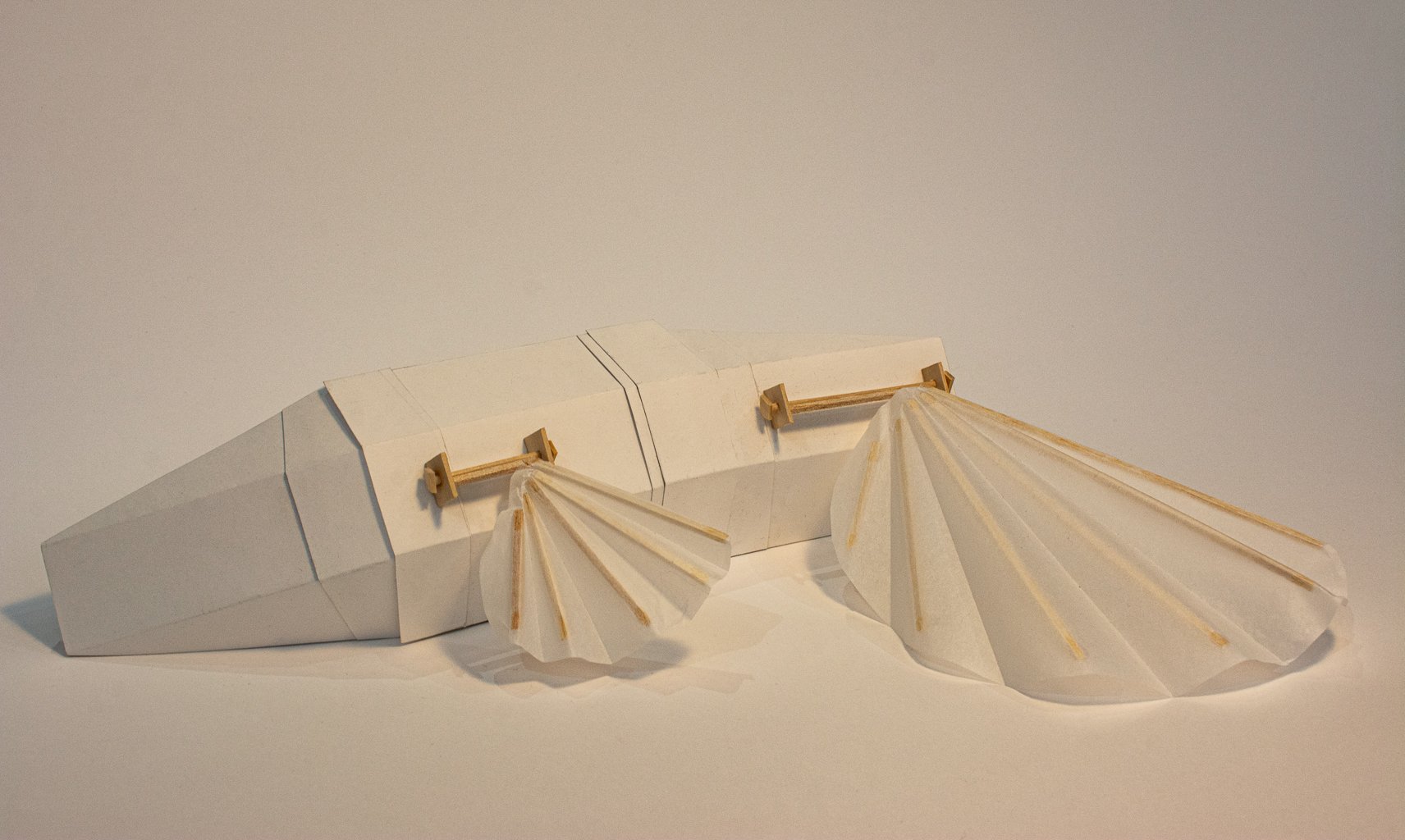

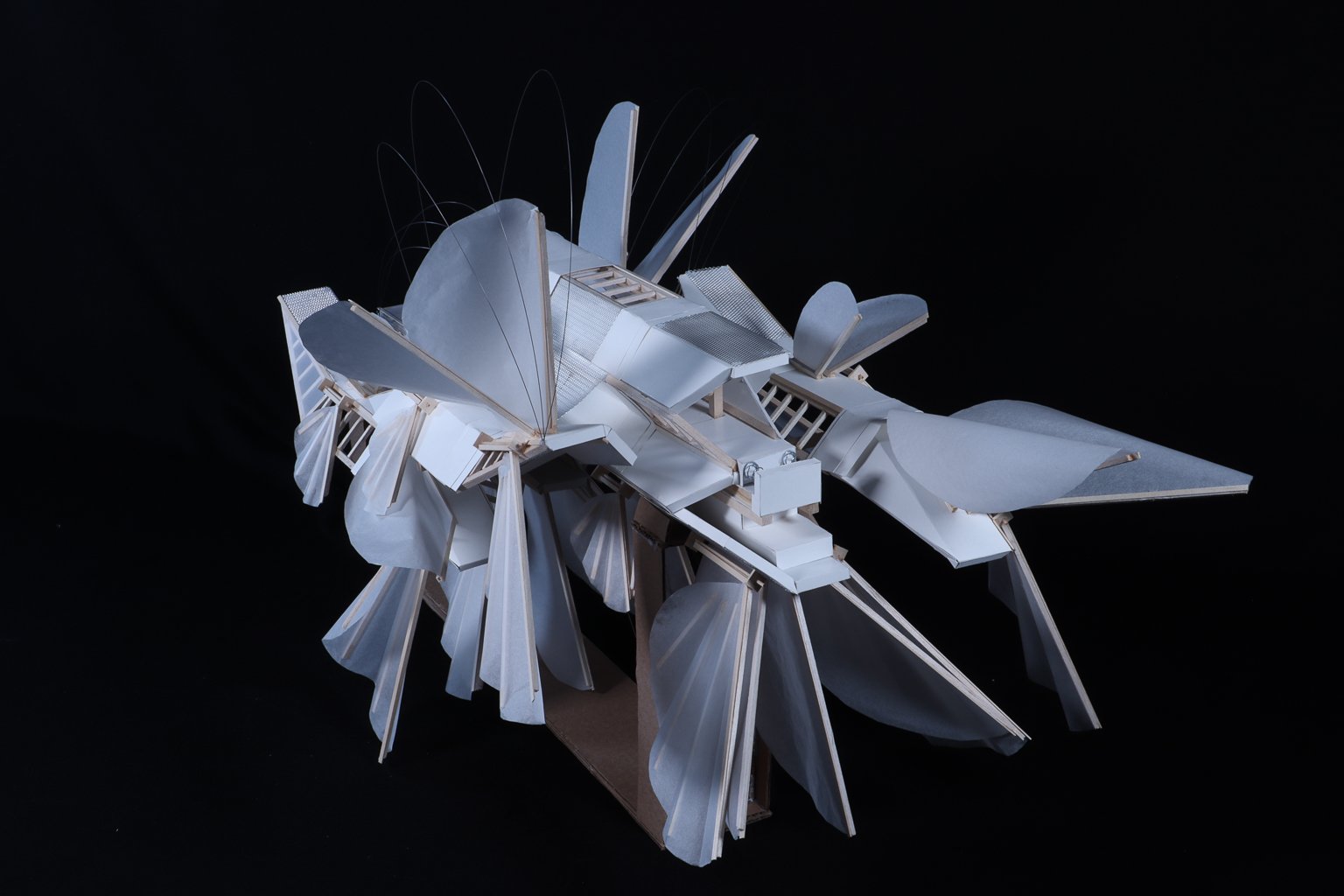


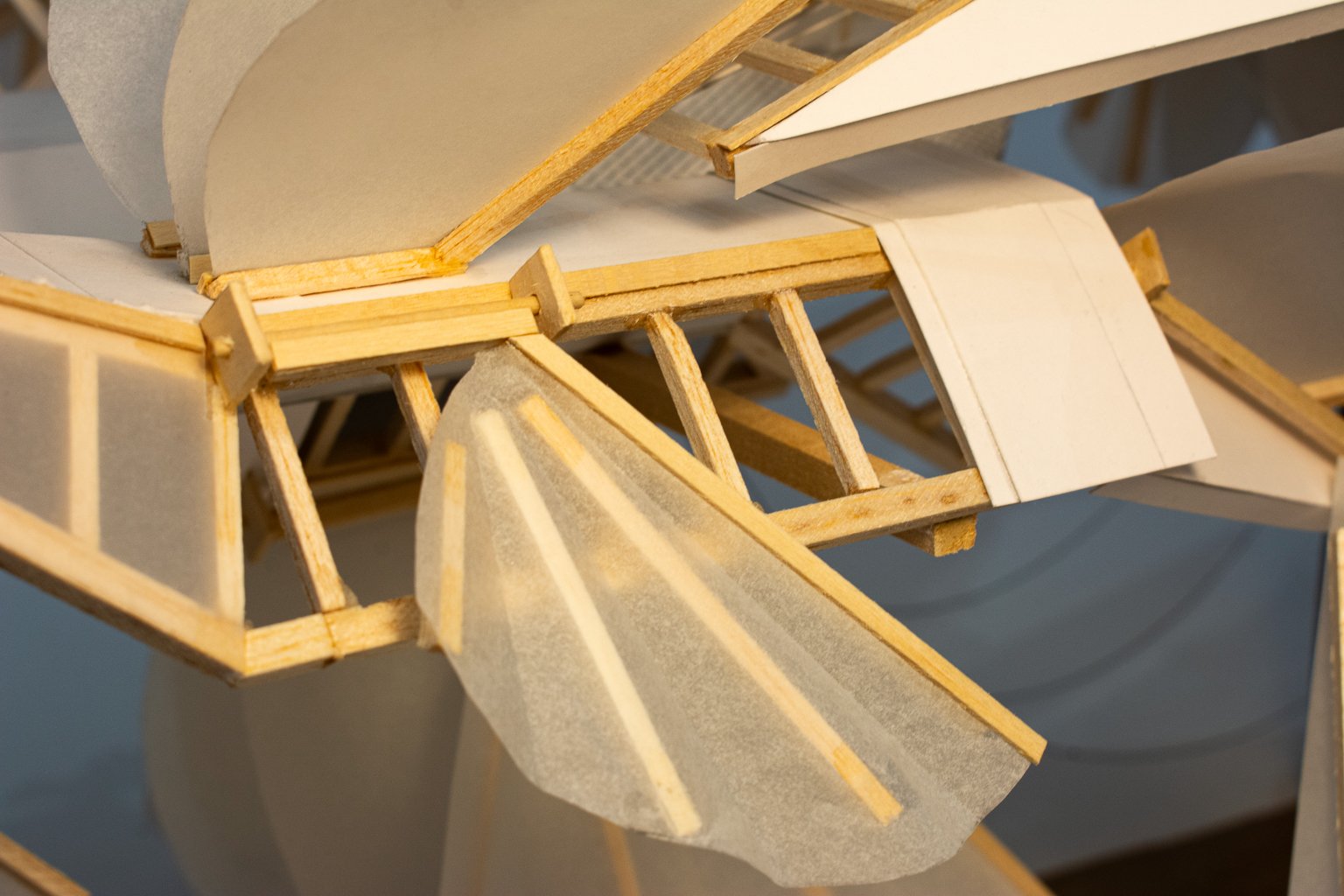
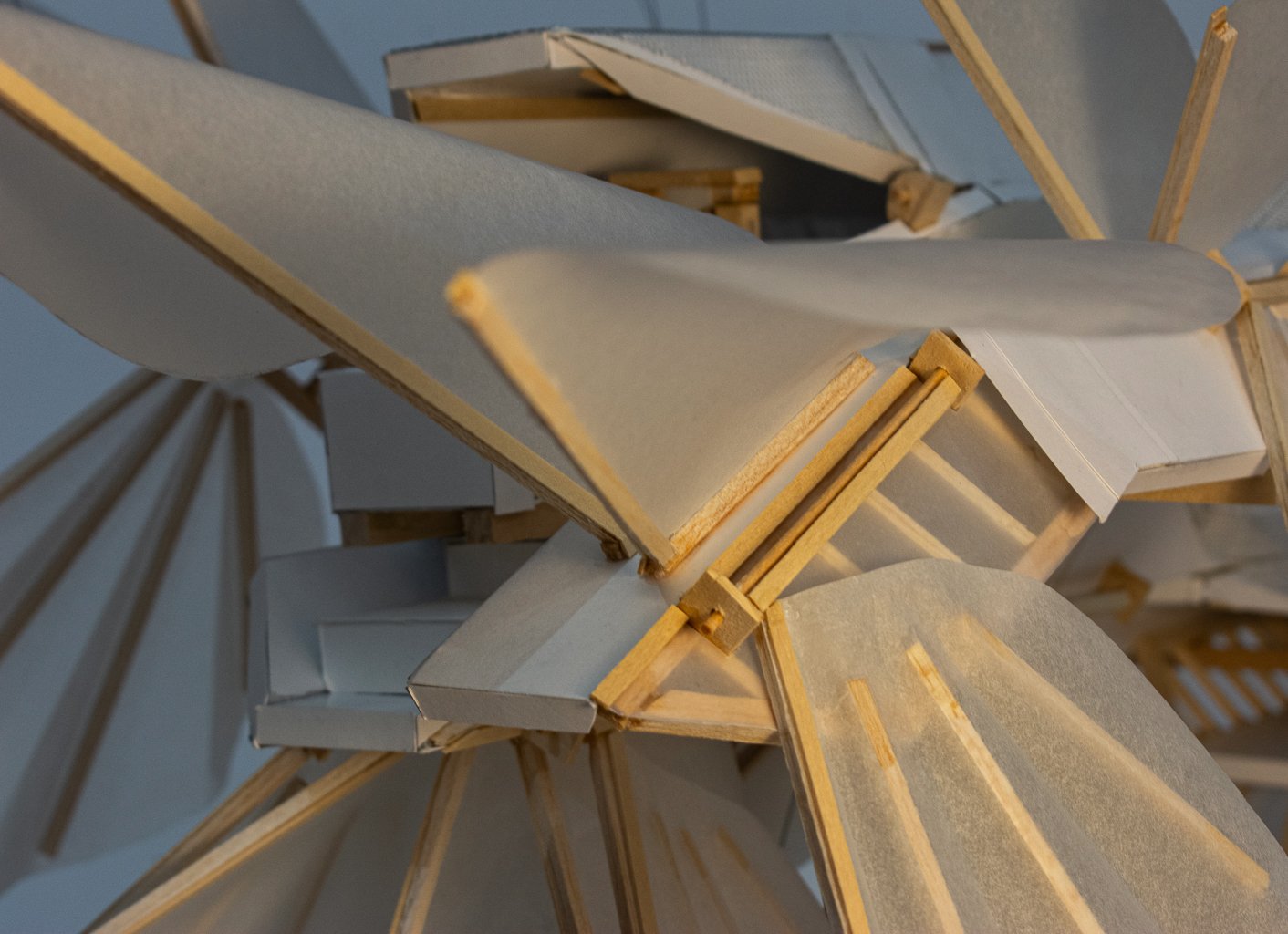


David Thal
Reciprocity between research + investigation, experimentation + discovery, reality + imaginary, thru making -both physically by hand and digitally, and thru both models and drawings. The beginning research and analysis of an insect, animal, mammal, object, etc. with respect to flight, movement and time became the key focus for inventing a flying apparatus. Diagramming their concepts and ideas, and constructing these through details, invented joinery/hinges/connections, mechanics, and visual structure, resulted in the making of a flying apparatus. Our focus was distilling the essence of flight and constructing these aspects; imbuing these qualities of movement and time.
Asher Collens
"Primitive" Tension
In project one, I studied the atlatl, a spear-throwing device, focusing on the concept of tension. As the dart is thrown, it builds up elastic potential energy unevenly in its spine, giving the dart up to 15% more energy. The tension and strain on the dart tell the story of this object's motion for my modules and diagrams for the project.
Tension continued to be a significant aspect of my second project, which had a structure of uneven bentwood forms kept bent with taught cords that hold the loose dowel joints together.
I also began to celebrate the "primitive" aspects of my object, purposely avoiding using glued-together butt joints and instead celebrating the connections using dowel joints and contrasting lashings. These joints are also far stronger and impact-resistant than glue.
The model is suspended from a zipline mechanism and with the low center of mass, the model maintains stability in flight without listing, allowing for an elegant descent.
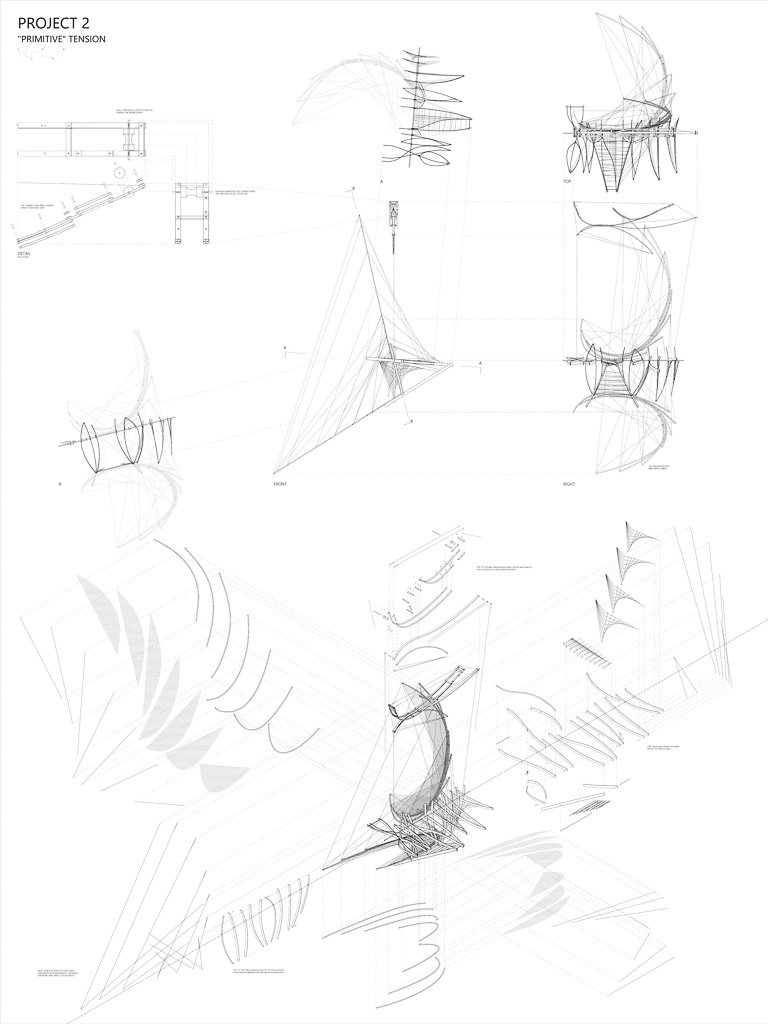

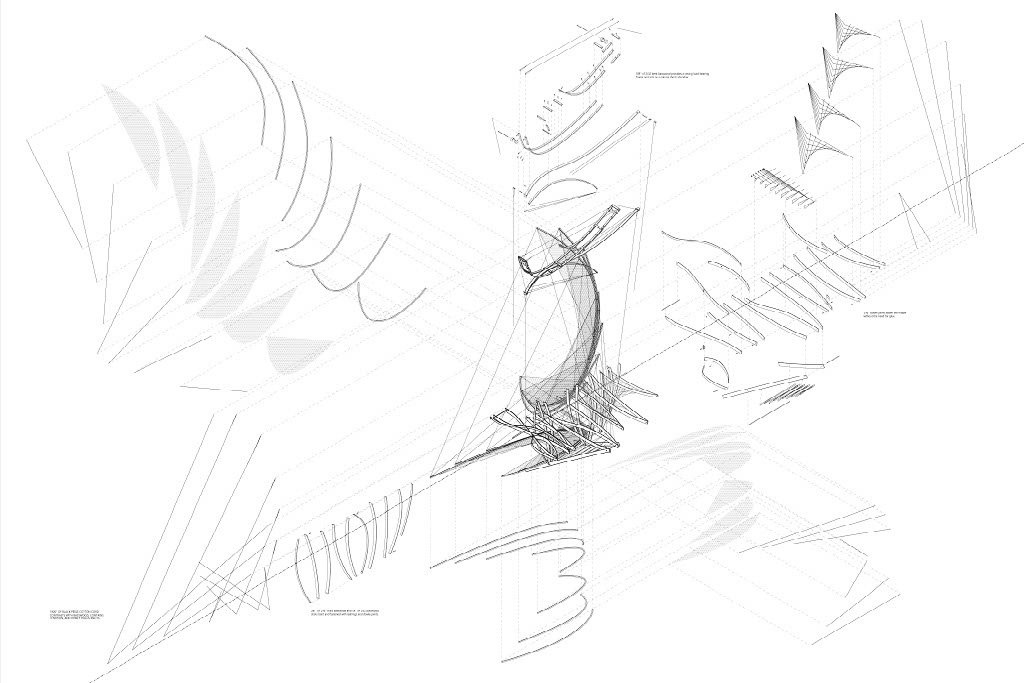
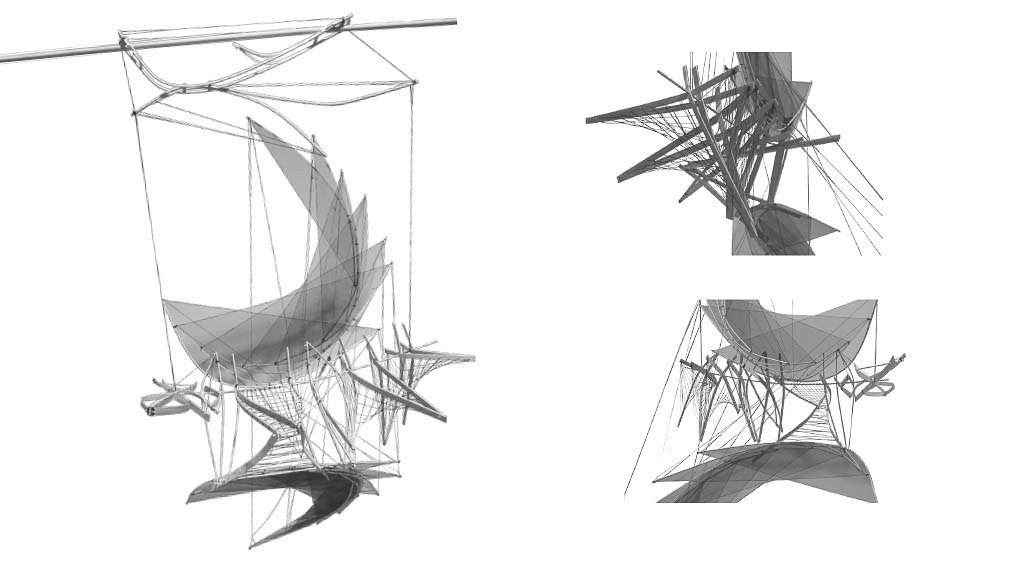

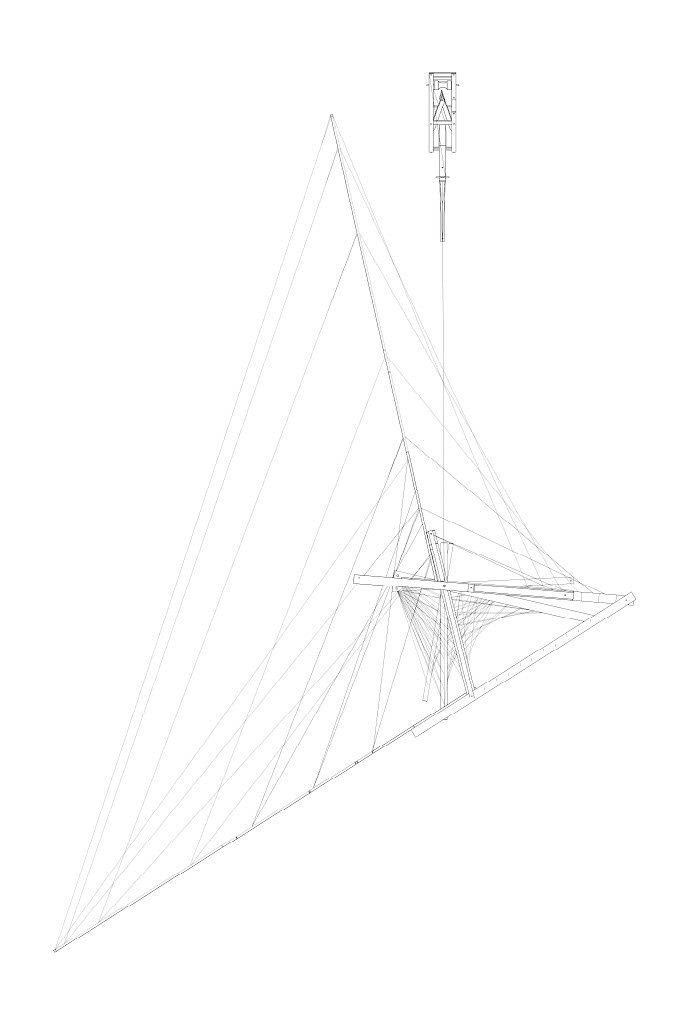
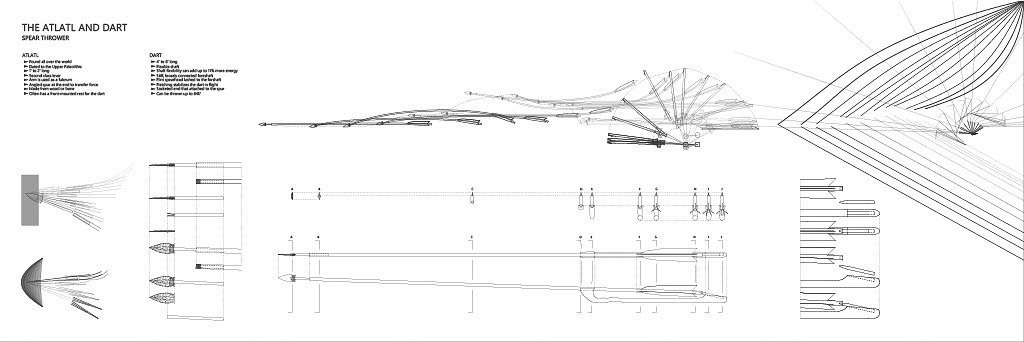
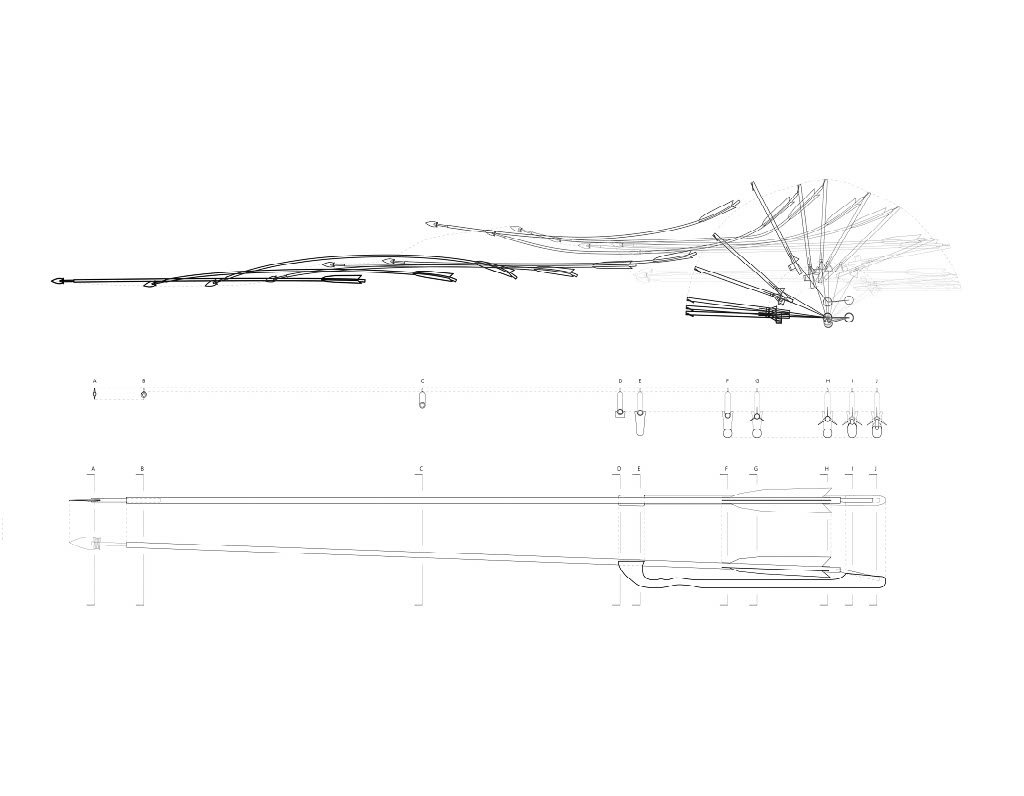
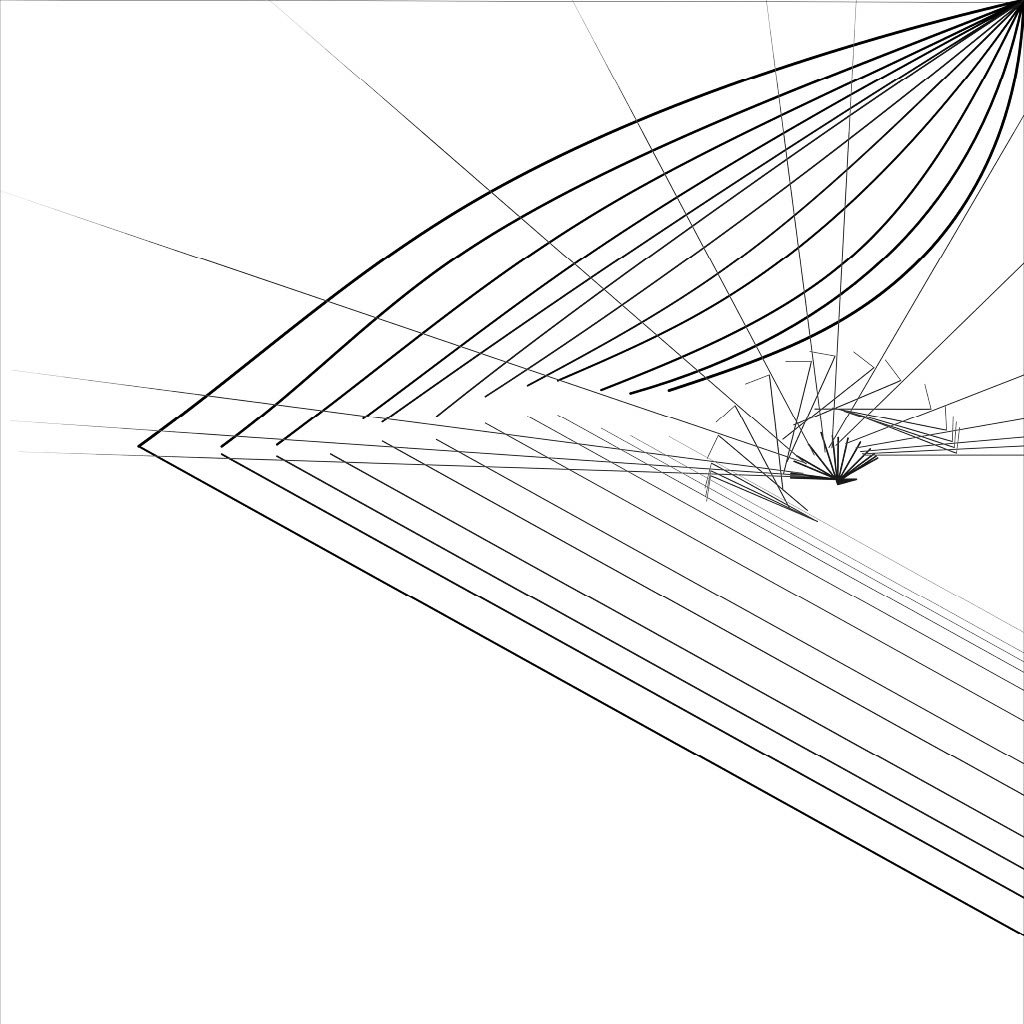

Capri Chambers
Fluidity of Flight
My project focused on the fluidity of a bumblebee’s flight.
I began my project by studying the motion and the dynamics of a bumblebee as it flies overtime. The results of my research inspired my abstract drawing of the bee throughout its flight course in project 01.
The abstract time lapse of a bumblebee’s flight became the motif and further exploration in project 02. The repeated appendages of my model convey the wing at different points of time. I introduced dowel joints in my model, to allow physical shifting of the individual pieces, to relay the idea of fluid movement. To show how dynamic a bumblebee’s flight is, the core of the model shifts directions to the right as well as curves upwards.

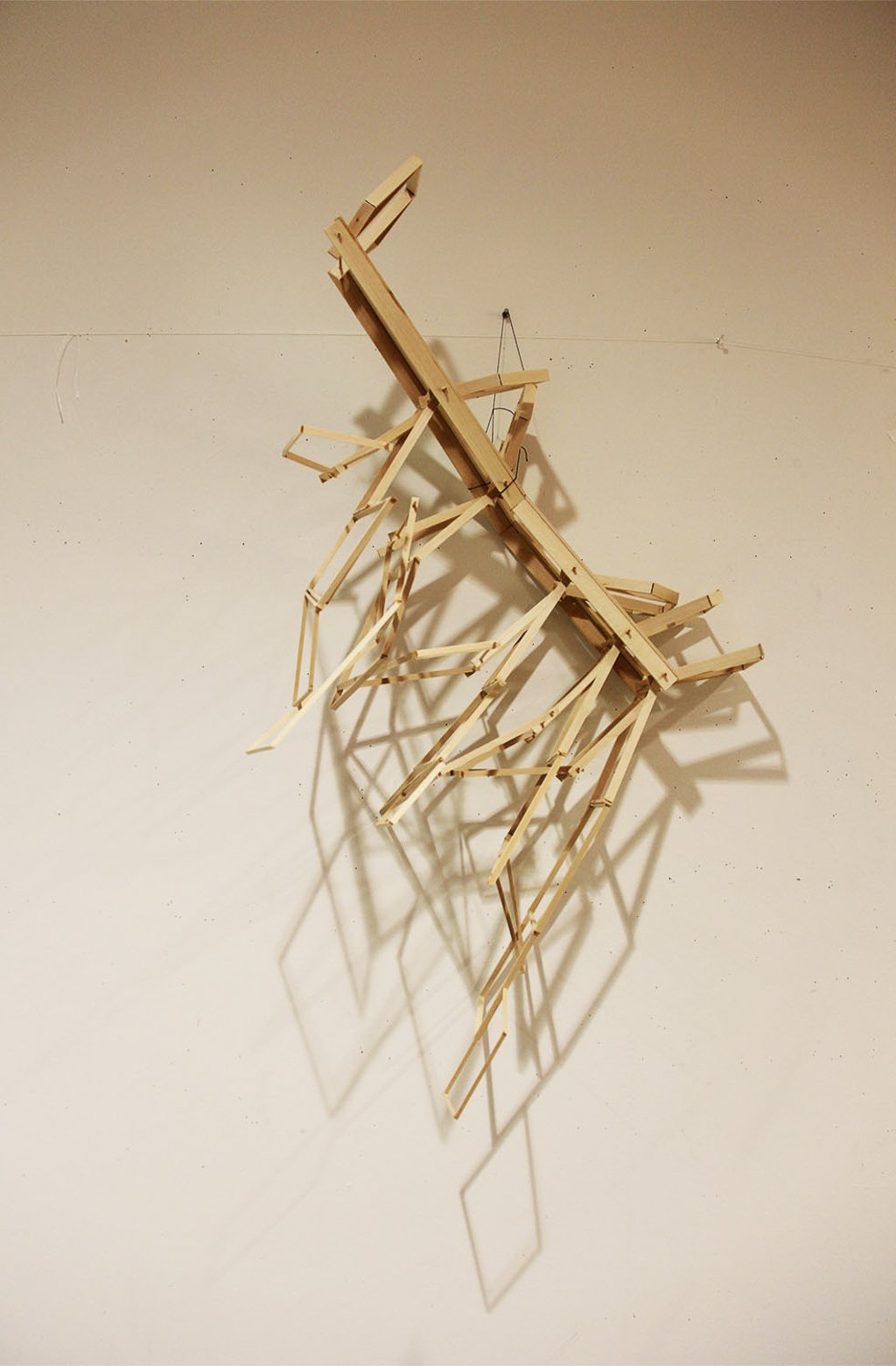
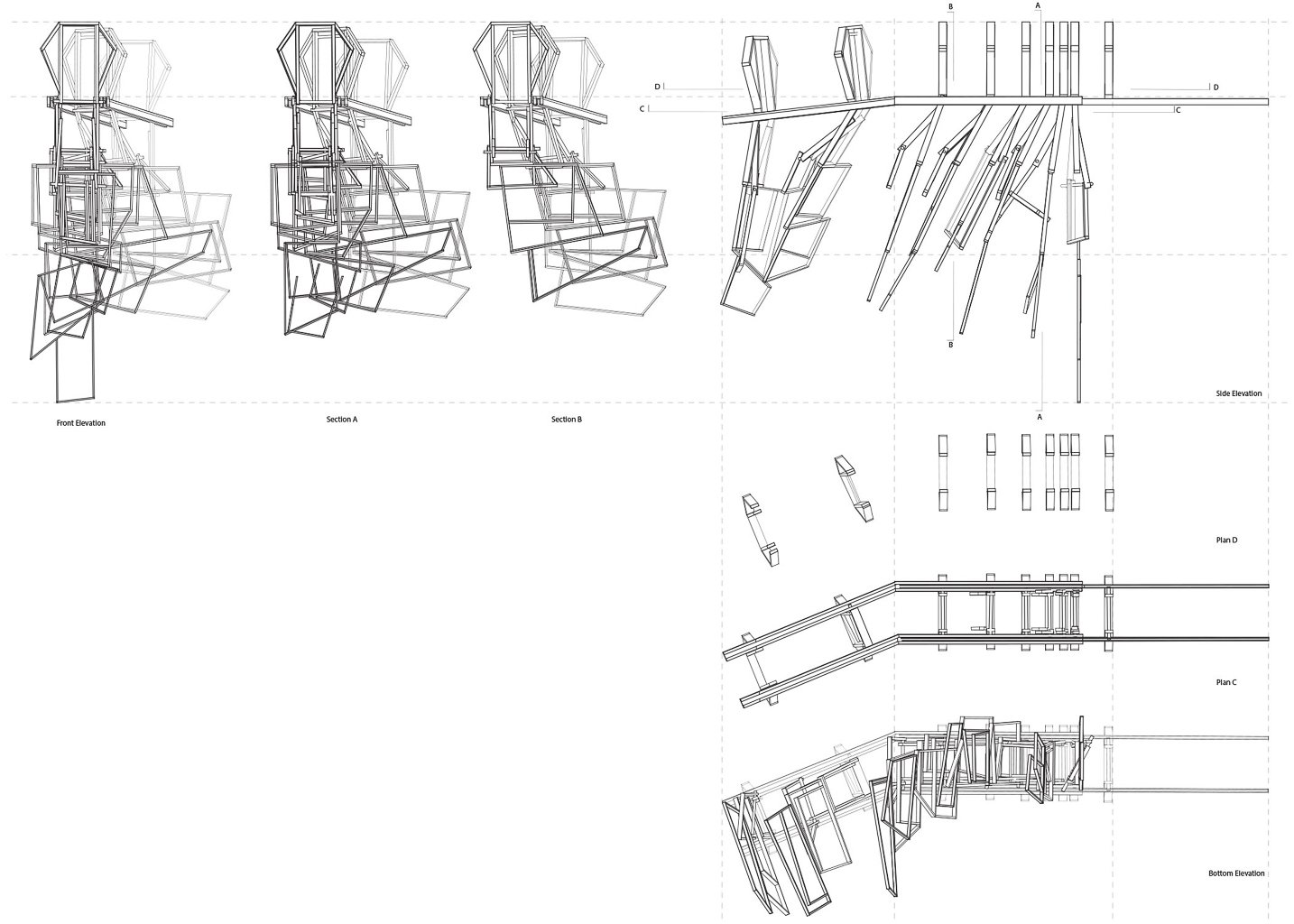





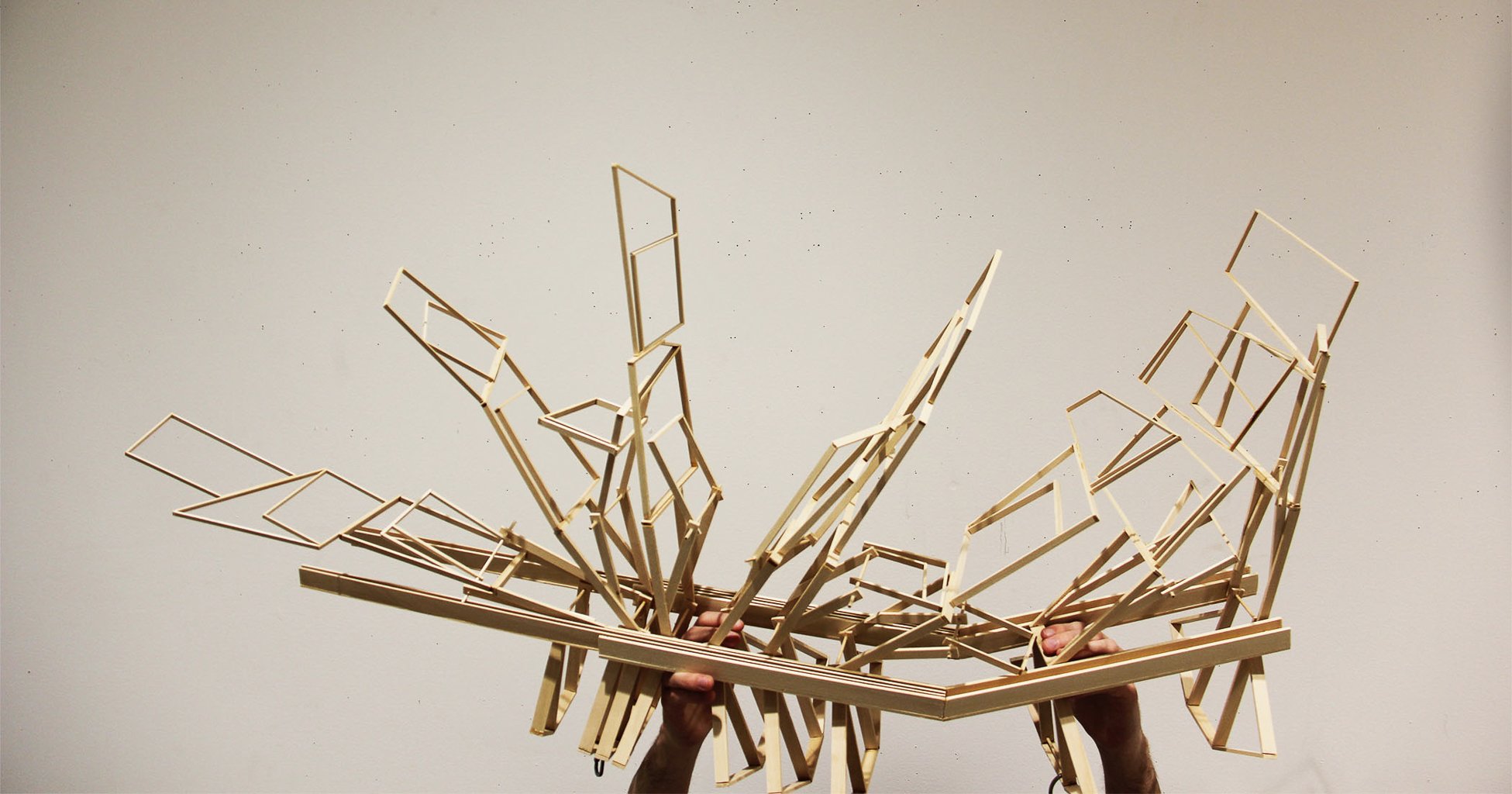
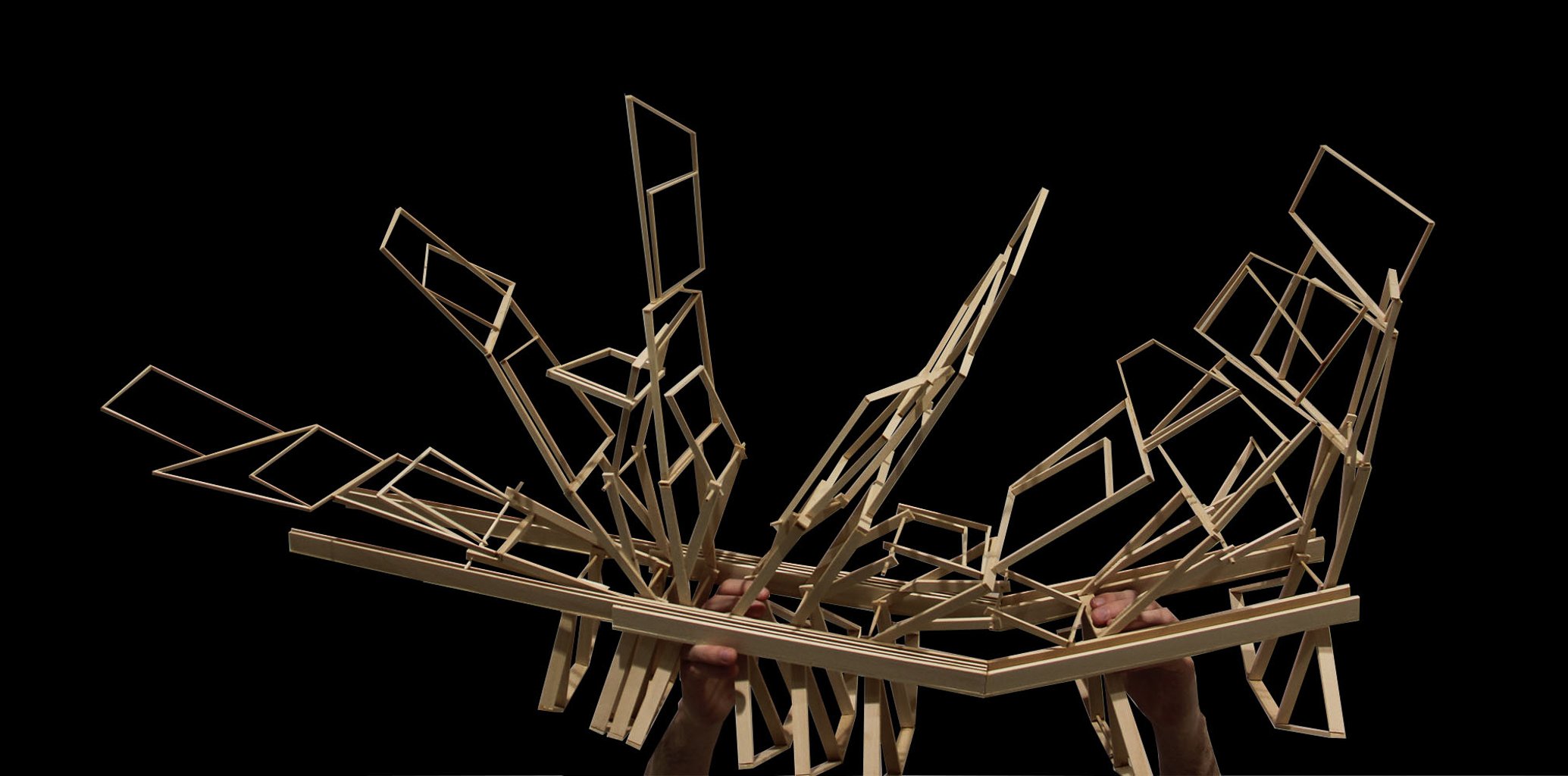
Tyler Malloy
Wingover: The Art of Flight and Fear
For my project I focused on the dynamics behind paragliding.
To start I focused on the science behind how a paraglider takes flight, then moving to different maneuvers a paraglider can partake in, such as a wingover. This maneuver inspired the shape for my flying machine. The shape revolves around a central axis while ultimately getting smaller and smaller throughout.
The transition from basswood sticks to fishing line displays the different feelings surrounding paragliding. The fishing line and open space between them display the freedom and relaxation some feel from paragliding, while the basswood sticks and its sporadic orientation display how some people are deathly afraid of it and how chaotic it can be.
The form my project takes on mixed with the open spaces throughout this form demonstrates how air controls a paraglider's lift and the drag of the aerofoil.

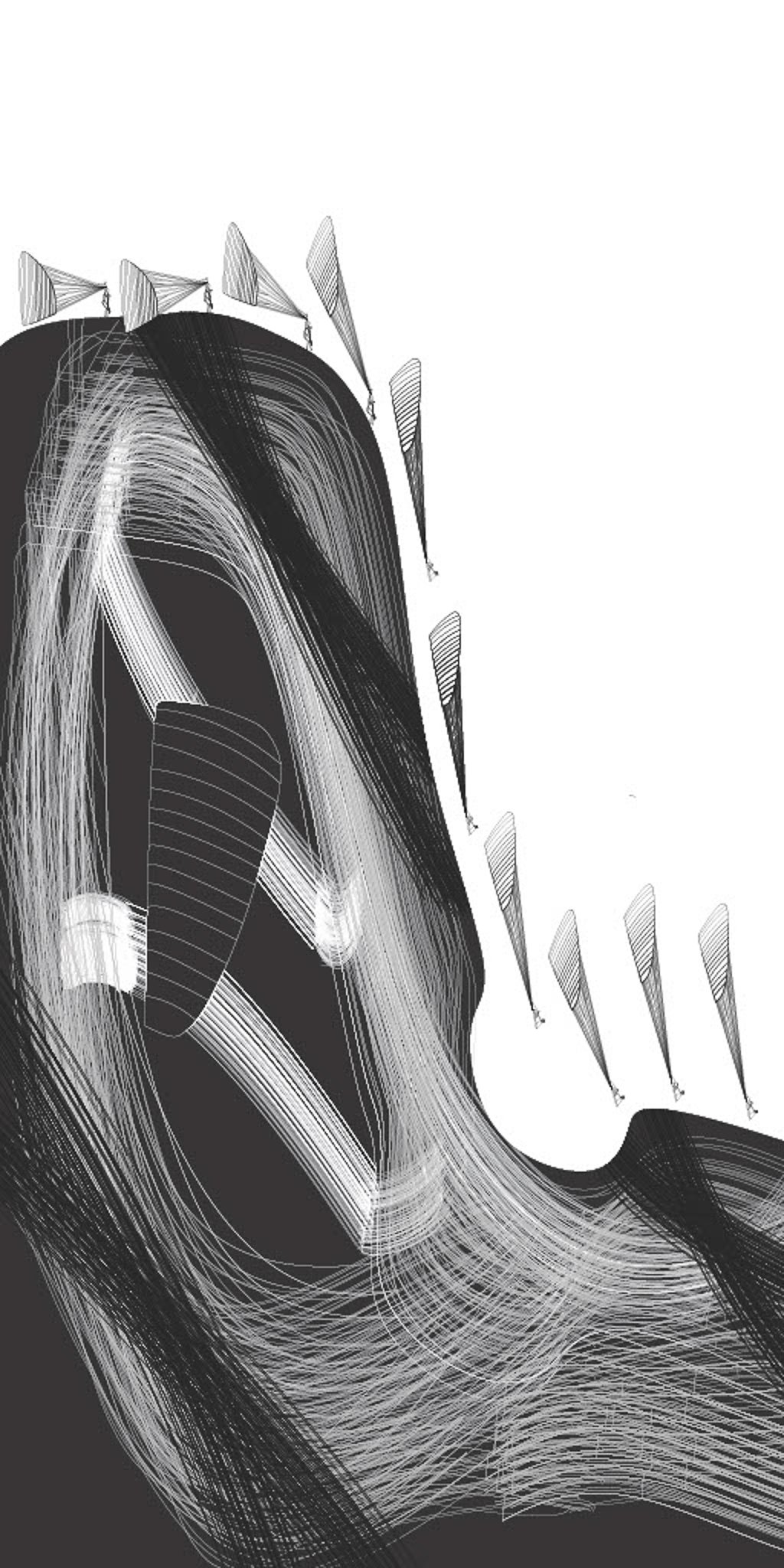

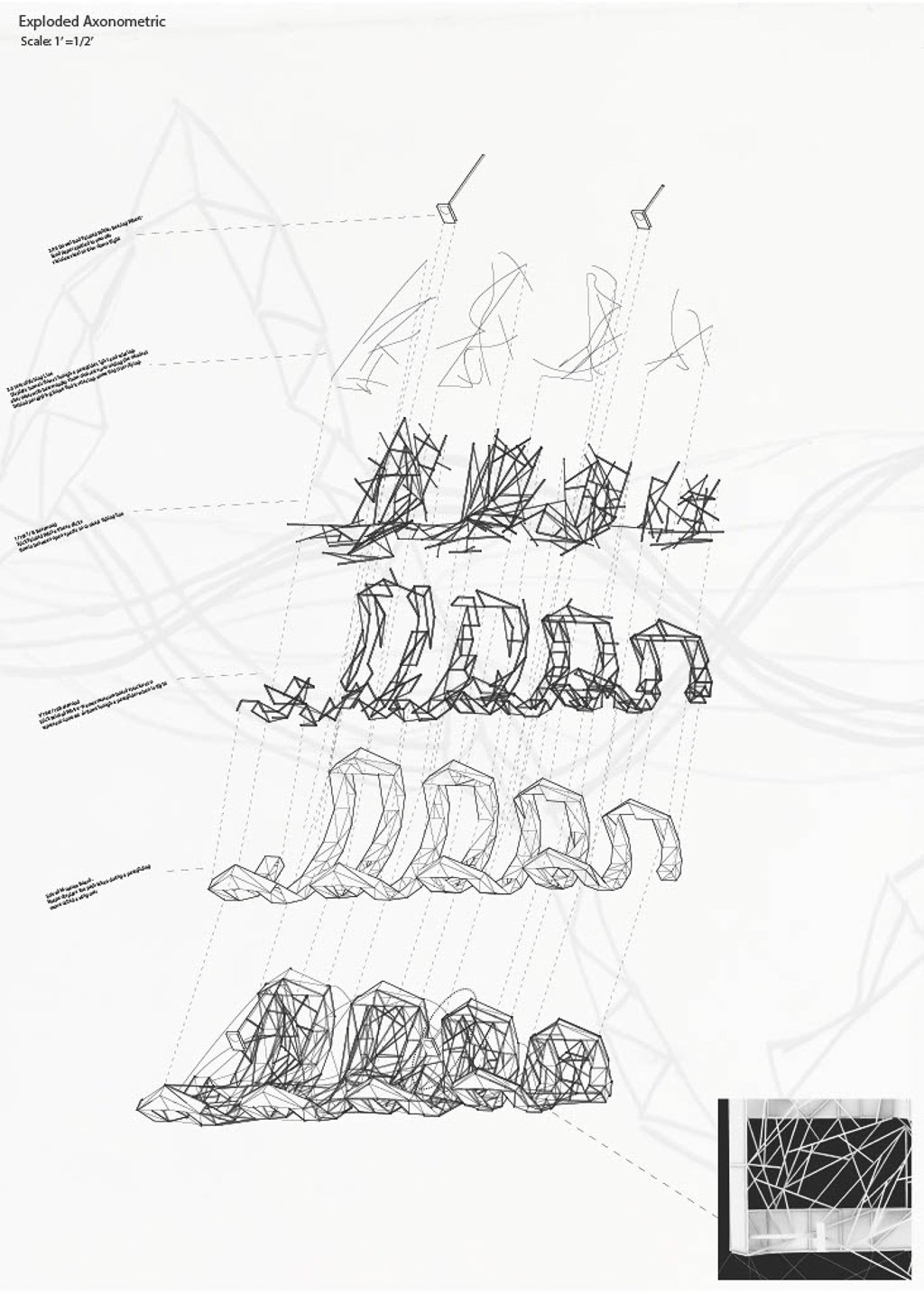

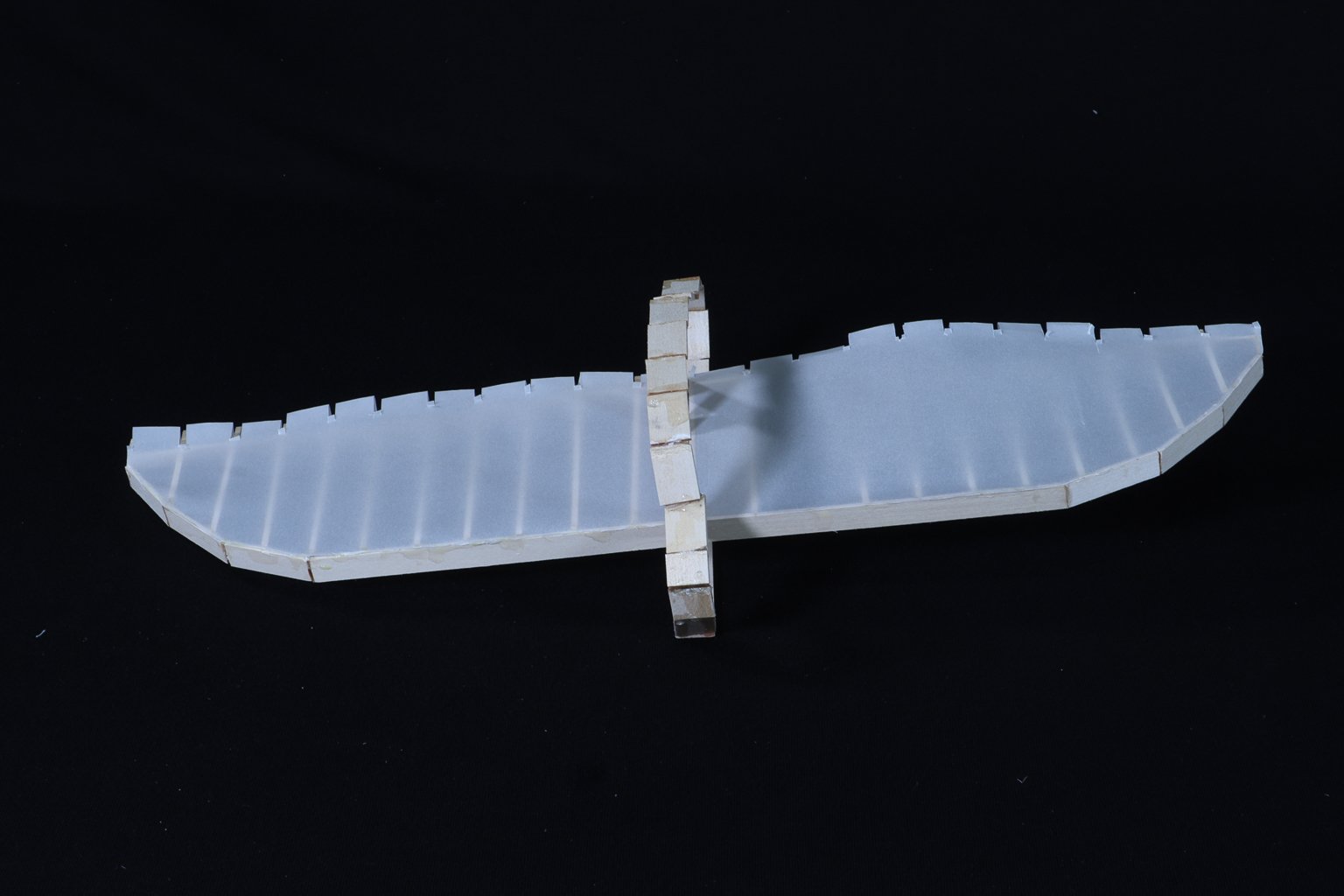
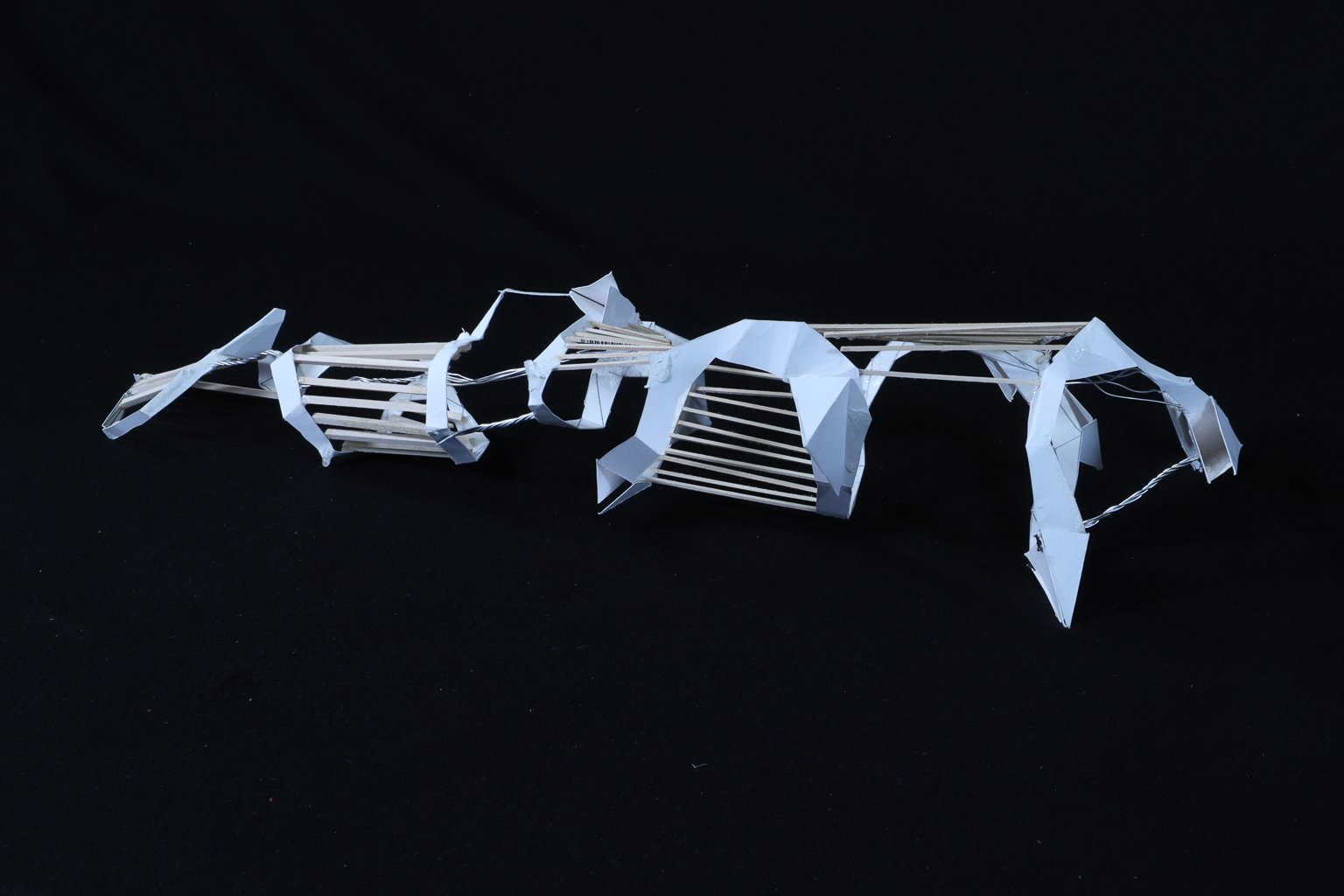
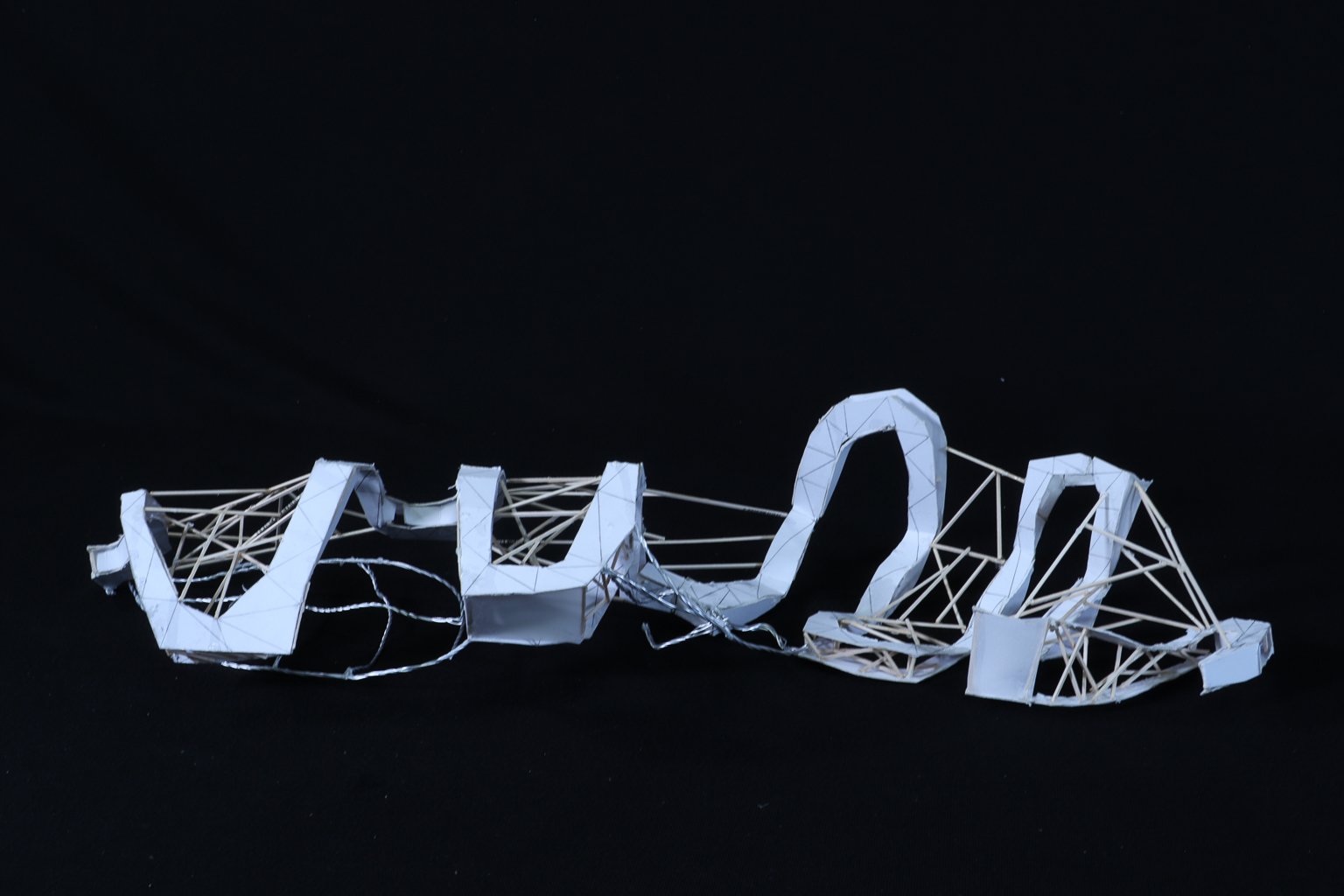


Carter Bondi
Analysis and Speculations of Flight
Innovative angles, the ability to cut through the sky, undisputed air superiority held for many years. The F-22 was made in America and has held the title as the first 5th generation jet fighter ever made. I wanted to build my project on the essence of what the F-22 does, cutting through the air with its innovative design.
I took the qualities of airflow, thrust of this aircraft, and developed these ideas into a model that would show both working together, with some added flare to make it stand out from the rest. I designed lightweight flaps that were added to the model to resemble the design of the F-22. It all comes together at one point and spreads out creating a cone of power and maneuverability. The varying qualities of the basswood sticks, Bristol, and museum board, a balance of frame and plane, were all used in perfect harmony to create the environment where you were also cutting through the air, right beside the F-22.
